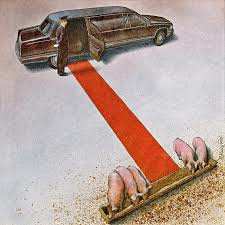“Things ain’t what they used to be and probably never was.”
Will Rogers
‘I have understanding as well as you, I am not inferior to you.’
Job 11-13
“The intuitive mind is a sacred gift and the rational mind is a faithful servant. We have created a society that honours the servant and has forgotten the gift.
Albert Einstein
After being given my cards, it was back to the drawing board for me to sprout more ideas.
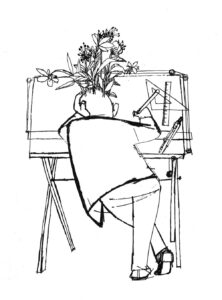
I’d have to call time on my goal of raising educational standards from within the public education system. I provided essential information to private schools so they could weigh up whether I was suitable for the role they wanted. Mine wasn’t the only one being weighed up. The field was crowded.
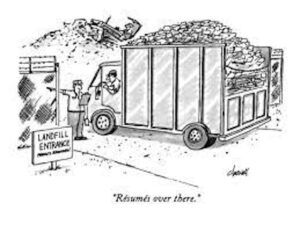
I began reading between the lines in newspaper reports on educational matters in NSW. Many are reports of pronouncements made by conservative dog whistle politicians and bureaucrats who generally refer to their misbegotten policy as one of ‘Back to the Basics’. This term evokes a mythical golden age in the past when all children became literate and numerate through coercion and by rote methods. Central to this hearkening back to glory days is learning a draft list of essential dates. These appear to suggest that, when anything did happen east of Dover and west of Perth, it was nothing at all, unless it was the ‘British’ extending civilisation. It brought to my mind the words written on a Belfast wall: “A nation that keeps one eye on the past is wise. A nation that keeps two eyes on the past is blind.’’
I arrange the farrago of comments and information extracted in a structured rather than in a sequential manner. I do so as to convey the body politic’s way of thinking and mores and to uncover its power games. I make the linkages between them, a method recommended by none other than the federal leader of the Liberal Party. Collected over a twenty year period they indicate that little changes over time. They start from the action taken against me.
I let the establishment spokespeople draw attention to their shortcomings, stripping away any gloss they otherwise attempt to put on what they see as their masterstrokes, holding themselves and their sententious nostrums up to ridicule, leaving my readers to form their own judgements on the black marks against them. I now include my own comments in italics.
In footnoting the source of these pronouncements and decisions, I often lack page numbers of the newspapers but include the names of the journalists.
The “Back to the Basics” School Policy in NSW (Expletives Deleted)[2]
The Ministry of Education in N.S.W. has given the Department of Education sweeping powers against teachers and school students.[3]The Ministry says it has forced large numbers of children out of school.[4]It says it wants ‘law and order” and “efficiency”. The Coalition Prime Minister described this social engineering as one of ‘zero tolerance’.[5]
The powers generate a need, pressure to produce “results.”
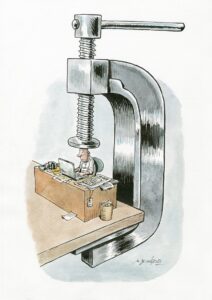
So Departmental officers feel pressure to hit numerical quotas to produce a certain number. It doesn’t matter whether those held to be ‘inefficient’ or responsible for ‘disorder’ have any tie to anything resembling this.
The Department’s responsibility to provide instruction to all children has been questioned.[6] The Ministry has talked of students “heading for the scrapheap”.[7] It identified children who would receive repeated corporal punishment as those living in poor areas. It can boast of tens of thousands of children on the streets on any one school day.[8]
It was easy for me going at it, belting past, to pick them out in term time, mooching and puttering round the shops and the streets, twiddling their thumbs, scrounging for crumbs.
It was easy to pick them out in the vacation time at Waterloo, a treeless, low-rent neighbourhood full of grim-looking subsidized housing. As the city’s wealthier areas empty out with the annual summer vacation exodus, Waterloo’s population remains undiminished.
Unsupervised and free to do whatever they like, they killed time playing video games.
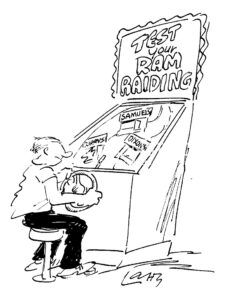
Goofing off they loitered conspirationally behind bus stops and toilet blocks, casing out unguarded properties, picking locks, derbying around supermarket parking lots in shopping trolleys. On the prowl they climbed over back fences, harassing backyard dogs as a cheap thrill, kicking up garden beds, romping, stomping, smoking, drinking and holding court in culverts and outside community centres .
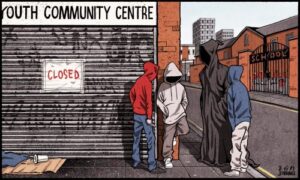
Putting themselves and the public in potentially dangerous situations they hung around busy roads and building sites, throwing rocks at vehicles, fartarsing on and around train tracks , crawling in front of moving trains .
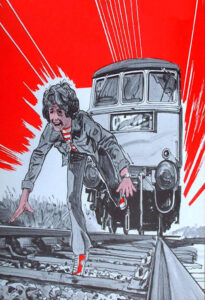

Metal scavenging saw a rise in apprentices. On the railways significant delays and cancellations were reported as signalling and power cables were being cut and taken from the side of the track.
There were incidents in which homes, businesses and even hospitals suffered power cuts and surges as a result of copper being stolen from power stations. Often while the metal stolen wasn’t really worth a brass razoo, the damage caused to infrastructure would run into thousands of dollars.
Manhole covers, domestic gas and electric pipes, lead flashing were taken from homes and churches, doors were wrenched from cars, all sold for scrap.
“Wonderful, excellent!” raved the leader of the conservative coalition, rubbing his nipples up against the Minister.[9] The police were less ecstatic.[10]Asked to pay a higher price, their reports were less glowing, more glowering. They would come under increased attack.[11] The Ministry admitted the changes “generate uncertainty and hostility”.[12] The Australian Council for Educational Research points out that truants can lose those reading and writing skills they have already learned.[13]
More than a generation after they brought in their powers, the conservatives would identify attendance as a continuing major area of concern.[SMH 17/6/19 Pallavi Singhal]
Students would be missing out on at least a year and as much as four years of schooling by the time they reach year 10, with attendance rates plummeting to as low as 60 per cent in some parts of NSW.
It’s not as though the conservatives don’t know the long term effects on people:
‘For a student to achieve their educational best and boost their career and life options, ongoing attendance at school is essential,’ NSW Education Minister Sarah Mitchell would say .
If children are not in the street, they may be outside the classrooms. The Ministry said when bringing in the powers. Its schools were in the ‘appalling situation where hundreds of high school classes every day were left in the playground’. In institutions under Federal Control, detained children could be taught for just ‘one hour per day’ four days a week.[14]
With respect to the education of girls, the Federal Government was in a race to the bottom with the medievalist Taliban.
The Ministry spoke of the “deplorable physical conditions of the schools … and the classrooms which leads to many of the disruptions that go on. The classrooms are very poorly built, they’re hot, they’ve got everything against them and all those things contribute to the poor learning outcomes. And the equipment and resources are dilapidated and inadequate”.[15] School toilets have been exposed as filthy and terrifying by a research group headed by the Chancellor of the University of NSW.[16] The Department has one category of school called “The Death Trap”.[17] The Ministry calls it “squalid, run down, and downright dangerous”.[18]
It increased the sizes of classes. It argued that this increases competition between students in a more stimulating environment[19] Christopher Pyne articulated this Coalition thinking: ‘‘There is no evidence that smaller class sizes somehow produce better student outcomes. In spite of Australia having small class sizes for 10 years … their outcomes have gone backwards’’. This self styled ‘Fixer’ confirmed the Abbott Government would increase class sizes in Australian schools.
The Coalition’s N.S.W. razor gang reduced the number of teachers.[20]After axing 2000 government school positions the Minister admitted it was facing long term shortages in critical subject areas.[21]One spokesman for the coalition says that there were teachers walking away from the public education due to stress resulting from a lack of resources.[22]
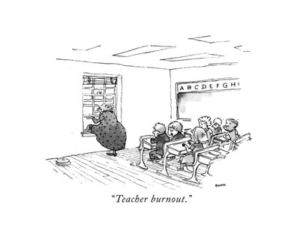
The Department puts forward a new type of class – one without teachers.[23] The coalition Premier called for the employment of teachers without training.[24]
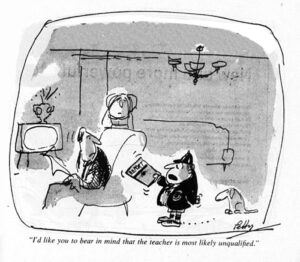
The Department restricts what students and pupils can study and how they learn. There is a smaller range of subjects offered, particularly those considered as ‘basic’.[25] The coalition’s strategy is promote private education at all levels and run down public education. One mouthpiece for the coalition points out that he represents those who believe in choice and that if the state education system doesn’t deliver, then they will choose to ‘school’ their children privately.[26] Most people don’t have this choice. The Federal Ministry speaks of the enormous sacrifices involved for those families who attend private schools[27], whose children will not necessarily benefit in any case when it comes to higher education.
The Federal Ministry of Education has drawn attention to the repetition of topics in schools and how this ‘turns off’ students.[28] The Department’s deputy director-general has said “Parents tell us a lot of kids tend to “switch off’ in the early secondary years”.[29]
Yet more children spend their time idle and restless, hanging around. OECD statistics show that Australian teenagers drop out of high school at almost twice the rate of other OECD countries. An OECD report said that “education systems had to be more responsible to the needs of the minority of youths whose family background, schooling and communities did not equip them with the skills, qualifications, attitudes or motivation for the labour market”.[30]An OECD report in 2013 comparing Australian high school students with 65 other countries showed the nation slipping further behind in maths and reading skills.
‘I think they’re appalling results,’ Federal Education Minister Birmingham said of the ongoing decline in 2016.
‘I am embarrassed for Australia that we are not performing at the standard that we would expect our schools to perform.’
Senator Birmingham said he agreed with educational researchers that the results are a ‘wake-up call’ for Australia to re-examine what is being taught in schools.
In 2019, more than 15 per cent of year 7 students in NSW were at or below the national reading minimum standard, leaving them struggling to follow the high school curriculum. Principals reported some year 7 students have the reading skills of an eight- or nine-year-old.[SMH Jordan Baker Aug 6,2020]
In 2025 the most recent NAPLAN tests, a national exam on the basic literacy and numeracy skills needed to navigate life, showed one-third of students were not meeting minimum benchmarks.
“That’s about 450,000 students across the country whose test results suggest they are not on track in skills that are crucial for their wellbeing and their future,” Grattan Institute education researcher Nick Parkinson said.
Australia’s Chief Scientist declared in 2020, ‘The poor performance of our students in international testing of literacy, reading and numeracy in 2019 is a serious matter that demands urgent action.’
How many generations of politicians does it take to wake up to this ?
The ‘Daily Telegraph’ sees the system as one designed to fail many people.[31] A report written by the Department’s assistant director-general reveals that the system has allowed ‘a culture of inequity and low expectations to rob the students of any equal chance to academic success”. This conclusion is agreed upon by the Federal Minister of Education.[32]
One future Minister for Education, Sarah Mitchell, would later comment, ‘I think education is the key to anybody having success in life.’
In studies where the final examination – the Higher School Certificate – is all important, the Ministry cannot secure the examination papers. The Premiers office calls this a disgrace.[33] The unproctored Ministry claims it is bringing about greater efficiency. The Labor Minister responsible for introducing the purge would befriend Howard and Abbott’s close friend and adviser, a fellow Friedmanite economic rationalist. Yet he claimed that efficiency cannot be measured in education.[34]
How could it be otherwise when those responsible are chosen according to their political reliability rather than the level of their learning and are entrusted with enforcing conformity.
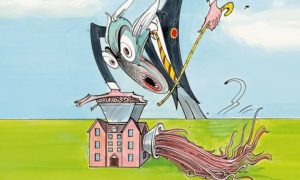
The Department goes along with this in the matter of violence which it claims as “spinning out of control” in NSW public schools.
Is it any wonder?!
In 2018 (May 5 Jordan Baker SMH ) the Department’s Secretary would speak of the continued‘ closed door of the classroom and the mystery of what’s happening in the classroom.’
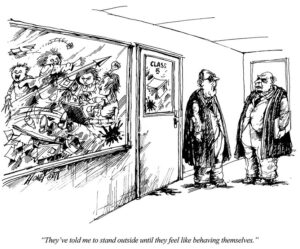
The Department stopped collecting statistics on incidents claiming they were unreliable and “it was too difficult to define violence”.[35] As for bullying this is less difficult to define. The parents of one boy who was the target of such violence and who was awarded damages against the government were told by a departmental officer that ‘bullying is character building’
The Ministry says decisions on education are the prerogative of business and government. It warns the courts not to become involved.[36] It endorses the view that business is not responsible to society.[37] The coalition Premier said that the court which deals with educations matters is “out of touch with reality”.[38] The Ministry says that teachers are disappointed and frustrated[39] by ‘narrow minded’ officials,[40] which makes them feel isolated from decision making.[41] The most senior official said that the officials can be ‘blasted’ if they make decisions the politicians don’t approve of.
The Department sees itself as having been guilty of exhibiting a “silo mentality”[42] and of promoting a “culture of remoteness”.[43] Various of its units were “perceived by many to be part of a large and uncaring bureaucracy, with some teachers feeling demoralized, devalued and disconnected”.
A discussion paper issued by the Ministry in 1997 painted a baleful picture of the teaching profession. There were, the paper claimed.. “no standards for professional practice; no single or agreed code of professional practice; no single or agreed code of professional ethics; no opportunity for the profession itself to have an input into establishing and maintaining standards and ethics; and fragmented and uncoordinated disciplinary and appeal processes”.[44] The Ministry describes teacher’s working conditions as “totally unprofessional”.[45]The Federal Minister say his government is the best friends teachers ever had.[46]
With friends like these—-
One of the Ministers responsible for the policy admits that there is ‘virtually no intellectual rigour involved’ in the policy.[47] The Coalition premier said the Minister was ‘remarkably on top of his subject”.[48] Then he concluded that what he was doing was ‘unbelievable, unreal’.[49] To learn more about policy, the Premier consulted with the American Vice President, Dan Quayle. The VP had reached a profound conclusion: ‘Quite frankly, teachers are the only profession that teach our children.’ Quayle’s boast was that when it comes to decision making he didn’t spend any time thinking”.[50]
Do we really need gun control checkpoints at schools that can rival those at airport security?
Do we need teachers armed?
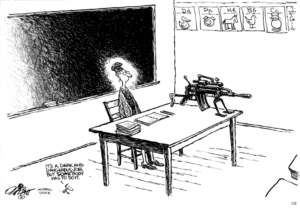
Do we really need to consult with intellectually handicapped politicians abroad? John Howard would later consult with the President George W. Bush who promised to be the ‘education president’.. Bush had earlier raised the big question,’ Is our children learning?’ He would later state that ‘—childrens do learn when standards are high and results are measured.’
The failure to sell the policy was seen inside the coalition as partly due to “laziness” at the top of the Ministry.[51]One of the Ministers behind the policy went to comment in reference to the problems resulting in learning foreign languages: “If we designed aircraft or built ships the same ways we organize schools and curriculum to teach foreign languages, the ships would sink and aircraft would fall out of the sky and a lot of people would go to jail”.[52]
The coalition federal Minister for Agriculture would justify this lack of accountability by politicians in the following way: ‘In this game you start throwing rocks and there won’t be a person left in the Parliament because everyone will have some issue somewhere in the past that is difficult to explain.[SMH August 2,2015]
The state Ministry estimates it took it 10 years to get into the mess it’s in.[53] One rare Minister who distanced himself from the fiendish policy observed that many senior staff in the Department had little knowledge of the needs and wants of teachers and students.[54] The sweeping powers enable the Department to enforce its ideas on intelligence and behaviour. The Department has an eugenist approach to intelligence.[55]Its public relations spokesman upheld the view that young people can’t read or write properly because they’re not sufficiently endowed genetically. This means they are “born this way”.
Fur was einer schmuckerei ist das?
As a means of serving political purposes, eugenics is a thoroughly discredited set of ideas.[56] This ideology was behind the historical programme that sought to breed out the Aboriginal bloodline.[57] The Department believes that “most people seem to have trouble getting the bits in right places for normal reproduction.[58]
Reproduction is a difficult area for the Department, ‘a hairy area’ described by it’s spokesperson. The Minister drew attention to it skinnydipping in the parliamentary pool, pointing out potential pitfalls.
In the area of much concern to people – AIDS – the Department admitted that it was ‘totally inadequate to understand what is going on”[59].
The coalition Minister for Business and Consumer Affairs said we have to stop breeding a race which…’snivels and whines”.[60] The coalition’s federal Ministry for Aboriginal Affairs approved of calls for compulsory blood testing of Aborigines to determine which ones are racially ‘pure’.[61]
The conservatives see their aim as silencing those whose ideas they disagree with.
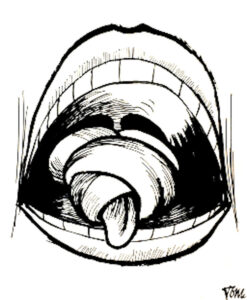
The Ministry approved consideration of a strategy raised by the assistant director-general. The strategy is for the Department to train “cadres” – special groups to “change the culture of the NSW Teaching Service”.[62] It was this very strategy that so strangled intellectual life in the Soviet Union.
The Education Minister said the coalition would step up its ‘propaganda’ campaign.[63] According to this view that there is nothing wrong with the ‘product’ but with the way people look at it.[64] The Minister believes if people are told something often enough, they will end up believing it.[65]
The Ministry warned of teachers with dangerous attitudes.[66] The Coalition Premier endorsed the view that alleged school violence is the responsibility of ‘socialist’ teachers.[67] The powers are said to be necessary to “stop the spread of this disease”.[68] They are designed to keep such teachers out without being seen to openly do so.
The Coalition Prime Minister expressed concern that teachers were “discussing” the Iraq war in the classroom.[69]
Small wonder he was concerned.
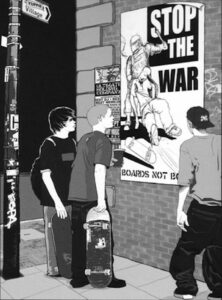
Having been led on by an exorcist, not a leader, raving on spreadeagled about ‘evildoers’ and an ‘Axis of Evil’. By going along with the lie about the perpetrators of the 9/11 bombing, helping Al Queda gain entry to Iraq.
Teachers who emphasise the need to conserve the environment were seen as ‘peddling propaganda’ in schools by the coalition Ministry for Natural Resources.[70] The coalition Deputy Premier rubbished scientists who warned of the greenhouse effect.[71] He pointed out that he himself was less qualified than anybody.[72] He was not a very fast reader which he said blissfully was “perhaps a good thing”.[73]
He was perhaps one of the happiest persons on earth.
The acting Prime Minister tagged some material taught in public schools as “anti farmer” and “deep green”.[74] He said ideology was seeping into some parts of the school curriculum at the expense of facts.
Trying to replant the cross in the sand of one of the most irreligious societies on earth, he said ‘traditional Christian views are being diminished, rubbished, written off in public schools. He pointed out quite correctly that parents want their children to be given the mental skills to form their own views on the issues of the day. “… to be given the intellectual and moral tools to make their own wise decision about things”.
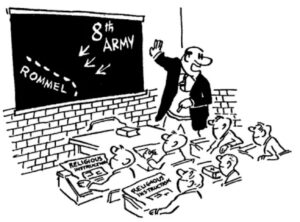
Yet be believes children in public schools are being fed “pre-digested views on issues”. It is a view that sees teachers as being manipulative and children readily accepting their ideas and views without exercising those critical faculties teachers know are natural. How could any significant number of teachers not be fully up on the part religion has played in our culture, or the role of the farmer? These fears are totally unfounded.
As long as there is constant testing, there will be prayer in public schools. And rest assured you can hear the Lord’s name mentioned around schools although in an unofficial way: for example, ‘Lord get me out of this job and into one that is not so stressful.’
Jesus was just alright with me as long as his legend wasn’t twisted and held up to justify crimes. We are all influenced by traditional Christian views and values, whether we are secular or religious. These permeate our culture and reflect our religious past.
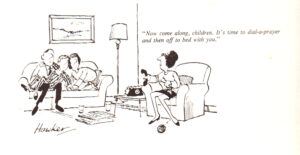
They can’t be written off or rubbished so easily. Why would any teacher in a NSW school want to do this? Children have by their nature the intellectual and moral tools to make wise decisions wiser than some people give them credit for. So why would they fall so easily prey to any classroom ideologue in a democratic society who wants to retard their critical faculties?
The days when you could drum an ideology into kids’ heads in the classroom is long gone. When all high school kids have the world in their grasp through the tablets they’re doing their homework on, the culture has inherently relativised — because they can compare everything to everything else.
Federal education minister Brendan Nelson attempted to have students salute the Australian flag.
However the day is long gone when Australian children happily pledged allegiance the way still done in North Korea.
Monday mornings, grumbling at the end of another weekend, they’d gather in front of the school flagpole for Assembly. During the following ritual, a pupil chosen as flag monitor ran the flag up the pole, careful not to trail it upon the ground, for that would constitute something dreadful and unspoken, possibly treason, and the rest all warbled ‘God Save the Queen’.
I remember standing in the quadrangle of many a state school as the free milk soured in the sun and the program proceeded to reciting the Patriotic Declaration: ‘I love God and my country, honour my flag and will cheerfully obey my parents, teachers and the law.’
It was chanted so often it may as well have been a prayer in Latin.
We did, of course, love God and country, because that’s what everyone did and no one wanted to be struck down by lightning.
In any case citizenship was already our birthright. Reciting a pledge of allegiance made zero difference to that.
The chanted declaration, of course, made liars of most. Many cheerfully disobeyed parents and teachers, and in the following years, some were disobeying laws too. Some would mumble through ‘love, honour and obey…till death do us part’ just as numbly.
The political and religious right want to go back to the mythical days when everyone had good manners, including teenagers and everyone knew their place. Nostalgia was so much better when they were young. It was all so simple then.
So how does they political and religious right get past this built in firewall and erode further the mantra of “free, compulsory, and secular’, the philosophical bedrock of public education in Australia since at least 1870. Their strategy has been to get not just their toe but their whole foot in the door. To wit God has not been absent from our schools. Those who comfort themselves with dusty old notions like secularism and the separation of church and state might be under the impression that God was expelled from state schools before the Flood.
Yet avoiding God at school is still not quite that easy. A parent can declare, “It’s all well and good to say ‘I chose my child not to take the special religious education program. But it doesn’t stop them being confronted by the chaplain at the front gate or being handed a special invitation to a before school god bothering breakfast, a lunch time program or an evangelical or mega church-funded barbeque.
There is absolutely no way that a parent can be across all that and there is no mechanism for them to opt out of it.
Parents’ and children’s right for freedom of and from religion are being violated by education departments in this way.
The chaplaincy program, which by 2016 would be taken up by 391 NSW state schools, is a blatant push to have Christianity in public schools and replace professional staff with non-professionals. Millions would be poured into this at the same time as billions were ripped out of education in the long term. Welcome to Amateur Hour!
The public school system remains wide open as the next “mission field” for evangelical churches, which remain free to provide chaplaincy services on the approval of a school principal in NSW.
Many question whether the volunteers’ training and qualifications are adequate to justify placing them in front of children in contemporary classrooms. This while teachers produced in our universities are deemed to be having personality disorders. Scripture was traditionally delivered by the major churches by friendly mums or grannies who had some time on their hands. It stuck to the simple message of being nice, forgiveness, and doing the right thing. It allowed students to explore the Christian story in an open-minded manner.
However there are other people out there who are more fundamental, and who create a fear and distrust and anxiety
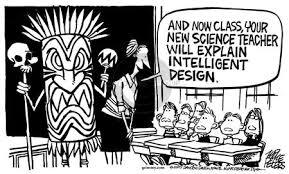
rather than thinking creatively about spirituality and what life is about and how we relate to one another. Religious instruction in schools would be hijacked by missionary organisations such as the Scripture Union, Access Ministries, Hillsong, and other extreme Christian evangelisers. Their teaching is believed by many to be anti-science, homophobic, and discriminatory against women, atheists. critical thinking and non-Christian believers.
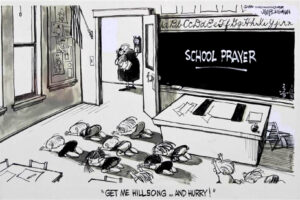
Former evangelical pastor Joel Pittman can attest to this first hand. Pittman took scripture classes in the Penrith area. In the classes he would explain to the children how they would have at some stage broken virtually all of the Ten Commandments, and how therefore they are going to hell. “And then after that, we say, ‘but there is a solution! And then in your nice little state high school, we would offer people the opportunity to become Christians, in class. And we would have the whole class shut their eyes, and ask that if they wanted to become Christian, and nine times out of 10 every single kid in the room did it.”
Mr. Pittman went from having a youth group with five or six kids at the start to having 90 kids in his youth group, “which was twice as large as the one I had at church”. He would then sign the kids up for Encounter Weekends, where they would learn about casting out demons and speaking in tongues.
Christians deny that SRE or chaplaincy is about proselytising. They say they are there ‘to provide emotional and spiritual support in schools’, something traditionally carried out by educational staff.
“In Australia, the state school is a very powerful and potent instrument for a sense of community, actually generally stronger than a local church,” Reverend Peter Robinson, CEO of Christian group Genr8, which is the largest provider of school chaplains in NSW.
A post on Genr8’s website suggests a range of ways that church and scripture teachers can get involved in school activities, including lunch groups, youth groups and school camps.
“Lunch groups are good, but short,” it says. “On a camp there for three days! Chat to [students], stay up with them, help with bedtime duties … Take a list of names. Remember students and what their lives are like, pray for them…. Don’t miss this opportunity to link them up.”
In the ongoing ‘culture wars’, the Federal Coalition Minister for Education, Christopher Pyne, retreaded the revisionist polemic, labelling the national curriculum “black-armband”. In this monocultured ‘Death of the West’ thesis, the national school curriculum is loaded with too much frontier guilt, too little reverence for settlers and is failing students. He has indicated he wants it to have a greater focus on the benefits of Western civilisation.
One “special consultant” on the government’s national curriculum review, tasked with looking at English from foundation to year 12, recommended that the English curriculum place more emphasis on western literature and said indigenous culture had little impact on Australia’s literature. This Professor of poetry was pressured to resign after calling people racist names in emails such as “Abo’s” and “chinky-poos”.
He described the prime minister, Tony Abbott, as an “Abo lover”, writing that he would have to be surgically separated from his “Siamese twin”, Australian of the Year and Aboriginal, Adam Goodes.
He also labelled indigenous Australians “human rubbish tips” and described Nelson Mandela as a “darky”.
Prominent national journalist Greg Sheridan added to the call, talking about how ‘National pride’ has been ‘assaulted’, how ‘European settlement of Australia is increasingly portrayed as some kind of hideous crime against humanity instead of the beginning of the Australian nation’.
Pyne called on Dr. Kevin Donnelly, a teacher for 18 years, to review what is taught in Australian schools. The curriculum has become too ”secular”, ”Asia-oriented”, ”left”, ”progressive”, ”new age” and ”politically correct”, to use the words of this former Liberal chief of staff. A critic of multiculturalism, he warns ‘Look at the falling percentage of Australian’s [sic] with Anglo-Celtic ethnicity over the last 100 years. The post-war migration program and multiculturalism are designed to breed out Anglo-Celtic, Christian Australia and to reduce us to a nation of tribes.’
In an article, written for ABC’s The Drum, he writes: “Multiculturalism is based on the mistaken belief that all cultures are of equal worth and that it is unfair to discriminate and argue that some practices are wrong.”
This doesn’t include of course hitting children. He says it was effective during his childhood.
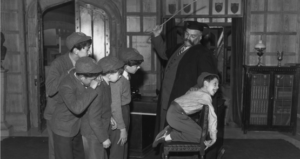
As for now he has ‘‘no problem’’ with it if the school community was in favour of it, ‘‘and if it’s done, you know, properly’’.

Commenting on 2014 reports that NSW students are being suspended and expelled from public schools at record rates, he was asked what he would describe as the ‘‘best punishment’’ he had ever come across, he recalled a stern Scottish teacher he had when he was a boy, who, he said, disciplined boys by taking them behind the shed and telling them: “We can either talk about this or you can throw the first punch.”[ Radio 2UE July 15, 2014]
Dr. Donnelly said, “I taught for many years and for a while there we had a time-out room, where kids who misbehaved would simply go and sit in the time-out room. They loved it because they could get out of class work, they could just relax and meditate for a while,” he said. He doesn’t say why his students didn’t love his work.
Instead of wasting the hundreds of thousands of dollars it has paid him for his insight, Liberal governments might have saved taxpayers money by allowing more time out rooms where difficult children who can’t yet appreciate Shakespeare because they’re not regarded intelligent enough to read might chill and learn in a relaxed atmosphere.
Dr. Donnelly has savaged a civics curriculum that teaches that “citizenship means different things to different people at different times”, rather than preparing students for an understanding of their responsibilities. “The civics curriculum argues in favour of a post-modern, deconstructed definition of citizenship,” he wrote in 2013. “The flaws are manifest. What right do Australians have to expect migrants to accept our laws, institutions and way of life?”
“Such a subjective view of citizenship allows Islamic fundamentalists to justify mistreating women and carrying out jihad against non-believers.”
Dr. Donnelly argues that a focus on “political correctness” has seen a national curriculum attempt to cover too much subject matter without any depth: “The Americans say that a curriculum like ours is a mile wide and an inch deep.”
His colleague, Professor Wiltshire is also critical of the curriculum. “Curriculum should also be knowledge-based, yet we are faced with an experiment that focuses on process or competencies.”
He attacked the “astounding devaluation of the book” in modern teaching. Fellow bibliophile Dr. Donnelly is a big fan of Shakespeare, the classic novels and phonics.
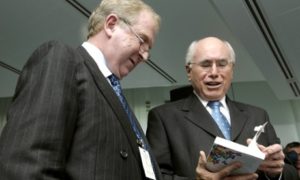
In the earlier tread, a highly placed Coalition representative said recommendations such as those of Kevin Donnelly “had already found their way into government policy”.[75] This was followed by a curtailing of the time set aside in the curriculum to the teaching of Aboriginal studies.[76] Prime Minister Howard declared that left wing ideologists had led to curriculums that were ‘incomprehensible sludge’.
His Minister of Education pinpointed the source of this ‘sludge’ to the direct influence of the Chinese leadership within the state bureaucracies. An advance media kit for a 2006 speech claimed parts of the contemporary curriculum came ‘straight from Chairman Mao. [FN 76A]

In 2023 Australian Federal Police special investigations commander Stephen Nutt would declare that said police were working closely with Australian intelligence agencies to counter what he said posed a “serious threat”. He said, “Foreign state actors that undertake hostile activity against other countries are creating and pursuing opportunities to interfere with Australians, from decision-makers at all levels of government, across a range of sectors, and our communities.”
The Minister said the bureaucracies were forcing Chairman Mao-like ideologies onto school curriculums: ‘We are talking serious ideology here.’
Just how serious was she being herself ?
Her accusation raised certain important questions:
Is there really a Maoist agenda at work amongst teachers?
Have they targeted both the Four Olds – Old Customs, Old Culture, Old Habits and Old Ideas- and the Three R’s?
Is the maoist dictum really being taught in our schools?
Is Australian history taught as a litany of Marxism, feminism and so on?
Just how ‘incomprehensible’ is the curriculum delivered ?
When the school inspector had sat in on my English class, I had spoken favourably about the novels of Pearl Buck. Pearl had earned the ire of the Maoist cultural enforcers.
‘Had I been seen inside the Department as a capitalist running dog?’
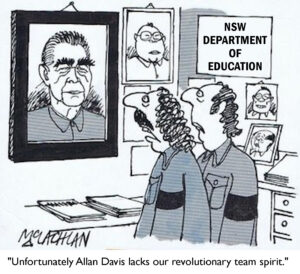
Unlike in China there would be no repetition of The Hundred Flowers Campaign.
To promote progress in the arts and the sciences. Mao had encouraged a variety of views and solutions to national policy issues, launched under the slogan: “Letting a hundred flowers blossom and a hundred schools of thought contend. In it’s own version of the crackdown that followed in China.
The N. S. W. Ministry would allow only one-it’s own, naturally.
The Federal Ministry said that ‘the interests in Australia’s past, such as the Anzac tradition, could not be catered for by schools’.[77] Federal Minister of Education Tudge would declare that proposed changes to the national curriculum would lead to students having a hatred of Australia, including such commemorations as Anzac Day. Minister Pyne wanted the curriculum ‘to celebrate Australia, and for students, when they have finished school, to know where we’ve come from as a nation.” The Howard-Abbot Ministry would say that many government schools are hostile or apathetic to Australian heritage or values. This is despite the fact that students in all public and private schools study the same curriculum which includes Australian history and has mandatory lessons on civics and citizenship. Especially the Anzac tradition where Australians are asked to remember just who they are and where they have come from.
And in case they forget, that’s from Britain according to PM Abbott who can’t forget that’s where he came from. Reiterating the legal fiction of ‘terra nullius’, a belief overturned in the 1992 Mabo High Court decision, he stated in 2014 that Australia was ‘unsettled’, “nothing but bush” before British invasion.’
The Federal Coalition has identified the emphasis on tolerance as the main problem in public schools. Before going on to become Prime Minister, Federal Health Minister, Tony Abbott suggested that the Australian people are “tolerating the intolerable” because of political correctness.[78] He sees a rejection of traditional values in public school. He finds unsupportable what he sees as a high level of promiscuous sexual activity amongst teenagers.[79] After denouncing this, it was revealed that he himself was involved in premarital activity when he was a teenager. He claims that parents were leaving public schools because in it all cultures and value systems are treated as morally equivalent. Yet how is it that teachers portrayed by the Coalition as doctrinaire and single minded be so uncommitted when it comes to morality?
This anti-PC bandwagon is totally outraged that people are outraged by what they say and they never stop complaining about people who complain. They remember a time when difference wasn’t tolerated and they don’t like this time where people tell us that not to say things that are offensive.
The argument of teacher indoctrination and political correctness in public schools was developed most by the chief of staff to the coalition Minister for Employment and Workplace Relations.[80] Kevin Donnelly speaks of a conspiracy to use the education system to attack the so called capitalist system and to indoctrinate students with a “left wing ideology”. His current patron Mr. Pyne argues that the curriculum requires students to learn about the day-to-day activities of the trade union movement, favouring the Labor Party while neglecting the role of business and commerce in the country’s history, glossing over the work of Coalition prime ministers and making no explicit references to conservative achievements in politics.
Dr. Donnelly avers that schools have been hijacked by “new age class warrior” teachers more committed to promoting homosexuality, multiculturalism and Aborigines than teaching the three R’s”. He claims teachers lack objectivity. He claims the “culture wars” have denigrated the teaching of Australia’s Anglo-Celtic history in favour of the “feminist, multi-cultured and neo-Marxist interpretation. He claims subjects like history and civics have been re-written to enforce this interpretation which denigrates the growth of Western civilization in Australia since 1788.
John Howard’s minister for Education, Julie Bishop stated: Parents are right to be concerned, and students shouldn’t be forced to interpret Shakespeare from a feminist or a Marxist perspective. They should bring their own interpretations and values to these works of literature. History and geography classes should not be allowed to slide into political science courses by another name.’
Mr. Pyne, Dr. Donnelly and fellow cultural hysterics see the teaching of history as slanted in a leftist direction. Accordingly, World War I is an event that would be dismissed by leftist teachers as “meaningless slaughter whereas it would have been, in their opinion, a war for “liberal civilisation” against a rapacious German horde who wanted to take away the right of Australians and Britons to their own country — and to India’s, East Africa’s and Malaysia’s, as well.
“What do I think of Western civilization? I think it would be a very good idea.”– Mahatma Gandhi .
We view much of our collective foundation – the base upon which we build and celebrate our national identity – in the mirror of history. This mirror is full of whorls, cracks, smudges and chips. Imperfections. In places, we have peeled away the reflective paint – sometimes intentionally, sometimes unintentionally. This results in historical blind spots. Consequently, what we see reflected is a distorted and unfaithful representation of our historical reality.
The missing parts of this reflected picture – the view of our collective history that we are unable to discern with clarity, due to the diminished quality and quantity of the imperfect reflected image – are often intentionally distorted, misrepresented and fabricated with the intention of manipulating the masses. What we should to aspire to as a foundation of our education system is a move towards an objective record for analysis, transparency, accountability and perspective.
Donnelly and former P.M. Howard claimed that public schools are too ‘politically correct’ and promote a lack of values, where children cannot “differentiate between right and wrong”.[81]
To straighten out these ‘biases’, Minister is championing the idea that schools will be improved by the imposition of rigid curricula content. He wants one that is orthodox, “free of partisan bias”, deals with ‘real-world issues’ and ‘doesn’t try and be all things to all people.’ This prescriptive ‘command-and-control,’ ‘we’ll tell you what’s good for you’ model is based on the one dimensional idea that Judeo-Christian civilisation is not only Australia’s cultural base, but is superior to others.
Ah yes, “One nation under God, indivisible, with Liberty and Justice for all”!
Yet the fact is development of the liberal curriculum was not by deliberately engineered political acts. They were not some concerted, deliberate plan to subvert Australia’s Christian British heritage. The importance of that heritage has been waning without conspiratorial help from the Labor Party or the left. Rather it’s a natural evolution to reflect the changes in Australia and the world. Australia has, in fact, moved closer to Asia. Britain and the US have been replaced by China and Japan as our major trading partners. More Australians travel to Asia than Britain and the US. A higher proportion of immigrants now come from Asia.

And Liberal leaders were involved in forging these ties. Menzies signed the treaty with Japan. Malcolm Fraser began Indo-Chinese immigration
Equality of opportunity and support for it has spread and the law of the land promotes it. It was Malcolm Fraser who passed the Northern Territory Land Rights Act. Discrimination on grounds of disability, race and sexual orientation has become unlawful and unacceptable. Unacceptable to the educational flat earthers, unable to bear that society more tolerant and progressive, fearful there’s too much knowledge in the world.
Is there any truth whatsoever in the ‘Back to the Basics’ policy? The State Minister eventually admitted that he believes lying is part of the politician’s armoury.[82] Another of those responsible for the policy said that “some departments and individuals purposely use ‘unclear’ English.[83] Both coalition Deputy Premier and Premier declared that the coalition had made “an awful hash” of selling the policy.[84] To sack teachers the Ministry says don’t work hard enough, the major newspapers oblige with a barrage of screaming ballyhoo with headlines about “bad” teachers.[85]
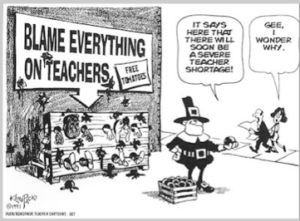
Christopher Pyne speaks of the rewards for ‘those who deserve to be paid more, but not all teachers (Lateline July 16, 2012). As for the ‘bad’ ones, he claimed in a 2012 interview, published in the Weekend Australian Financial Review: “In every staffroom, 5 to 15 per cent of teachers are not up to scratch, so it is commonly accepted that some students are going to be taught by underperforming teachers. This is unacceptable. What we need is for underperforming teachers to be managed out of the system.”
In N.S.W. when teachers reached the State Ministry’s ideal level of efficiency, it referred to teachers who “pump propaganda into children”, to those who “set up” children.[86] The Ministry says that one newspaper, which carries its own “propaganda” can be “willfully wrong” and “deliberately setting out to cause concern”.[87]
The Ministry says were it to use “propaganda” like teachers, it would be ridiculed. One coalition member called some of the policy “absolute rubbish”.[88]
At least one in five people in NSW cannot read or write properly.[89] This is a conservative figure. Figures from the Federal Government point to a particularly low level of achievement in this area by farmers and farm workers.[90] The directorate of Army recruiting has expressed concern about the failure rate of potential recruits in tests of their literacy and comprehension skills.[91] A high level of NSW Police Academy students fail their exams.[92] A study commissioned by the Bureau of Immigration found that illiteracy costs many millions of dollars a year in lost productivity.[93]
According to the Australian Bureau of Statistics in 2012, 46 per cent of Australians over the age of 15 lack the minimum literacy skills for everyday life, struggling to read newspapers, recipes and instruction manuals.[94]
In 2017 A 2017 OECD study arrived at the same one in five statistic regarding Australian workers lacking the foundation skills they need.
In 2020 The Reading Writing Hotline estimated the numbers struggling to be 3.5 million.[Manager Vanessa Iles to Ros Childs ABC RN]
Up to 65 per cent of Aboriginal people are “functionally illiterate” in English.[Good Weekend, July 19,2014] The Core Skills Framework identifies five levels of literacy and numeracy performance. Level Three is held to be the “minimum required for individuals to meet the complex demands of everyday life”, yet at least 40 per cent of Aborigines are estimated to rank at or below Level One. That dismal statistic helps to explain why Australia ranks below Cuba on some world literacy tables despite being 10 times richer on a per capita basis.
In mid 2018 the Coalition Minister for Citizenship and Multicultural Affairs pointed out that because the spouses, children and extended family accompanying permanent migrants do not need to prove they can understand English, this had created the “concerning situation” where “close to a million” Australians now do not speak the national language. (Jane Norman, ABC 14-6-2018)
There you have it. It all checks out. This outcome is neither an accident nor a caprice. It is by design, the result of deliberate decisions beyond any possibility of legitimate mistakes.
It’s a searing indictment of our education system.
All wind and smoke, politicians talk in circles for ever about the problem and hope it will go away. But none responsible are willing to do anything about it.
A generation after my unwelcome attempt to raise the level of literacy at Concord High, an English teacher there Chris Shiels reported the challenges of teaching as being the level of paperwork and ‘The kids you want to help but can’t.’[ABC Jane Caro Aug 24,2017] Teachers frequently feel upset by the lack of time they are allocated to spending with their charges due to their demanding schedule.
The lesson to be learned for today’s problems in the school system is that they were “hatched” decades ago, in the previous two generations. When society fails one generation of children, it lays the foundations for similar, even worse failures in the generations to follow. We human beings “inherit” not only through our genes, but often also from our social circumstances.
They took us ‘back to the basics’ ,then they started stripping even this away.
Unfortunately, the social and moral consequences of this shameful paralysis go just as deep. Universal literacy has to be just that – nothing less. We can’t allow half measures. Literacy is far more than being able to read a comic book while unable to understand the vocabulary of a poem or follow in prose literature the meaningful variations of syntax, the use of words in ways that open up new depths of self-comprehension.
Our cohesion as a people, our togetherness in fending off disasters, depends on our ability to communicate with each other.
To deal with the problem, the Ministry increased the size of classes. It talks of children in the classroom who “cry out for help”.[95] It talks of the enormous number of children who suffer a learning disadvantage.
The Coalition Federal Ministry of Education launched a review into the way primary school children are being taught to read.[96]It argues that they are the result of “education fashions” that have taken root over the past 30 years. It takes issue with the “whole of language” approach to reading where the priority is to get children actively reading. It points to a lack of teaching phonics where there is association of letters or combination of letters with their approach speech sounds. The academic consensus is that both systems are effective learning tools and are used in tandem in most Australian schools.
The Federal Ministry played up one approach to reading which is unavailable to most because of its expense.
To deal with its problems, the Department says it is moving “heaven and earth” to find teachers. The Ministry speaks of the squalid conditions teachers work under, but describes them as “unreasonably good”.[97] The Ministry says that what students will learn will be more to do with Australia.[98] The Department says it has a good pool of teachers from Hong Kong.[99]
One can understand the Chinese forte in mathematics and science, but as for their superior knowledge of Australia – who is the Department trying to kid? Do the newcomers from the pool really know more about us than we do? Was this the Chinese angle? Are they chosen because they have the Maoist imprimatur? Or do they get a special rate? Is it calculated they’re simply smaller, more amenable and two bob a dozen? Buy one and they’ll throw in another for free?
Rather than doing away with illiteracy, the coalition Government brought up a wide range of disciplinary measures. Children who use drugs can be expelled. The coalition Deputy said that “for starters schoolyard punks” will get “six of the best across their backside like they would if they misbehaved at good private schools”.[100] The Deputy is “no advocate of bashing kids mindlessly with a stick or cane, but they have to get what they deserve in the classroom too, where justice can be seen to be done”.[101]
This recommendation followed the publicity concerning a pupil who had his head cracked open in the classroom.
The Ministry rules out humiliation and torture as disciplinary measures.[102] The courts found that those who used eugenics most effectively as a political weapon did so. They used them both to throw the book at children and to test their genetic endowment.
The Back to the Basics policy is followed also in the prisons where children may go. A tight restriction was placed on educational materials.[103] The Ministry for prisons thought it was “silly” to study the language of Australia’s major trading partner. “Mickey Mouse” stuff such as pottery was out. It was seen as nothing more than prisoners “throwing a bit of clay at one another”.[104] One professional report from within the prisons confirms that juveniles are generally worse off than adult prisoners.[105] The coalition welfare Ministry spoke of the “appalling conditions” juveniles face when in custody.”[106] The Director of welfare services pointed out that overcrowding of young offenders ‘make it difficult to provide more than basic facilities’ yet he wanted his staff to be ‘less squeamish about locking kids up, to be more pragmatic’.[107] The Prisons Ministry described the conditions of most inside as “bored senseless”.[108] The coalition Minister compared conditions to those of a ‘zoo’.[109] Prisoners became disgruntled.[110] The Minister was “delighted”[111].
A briefing sent to all NSW judges on the Young People in Custody Health Survey, which involved the Juvenile Justice Department Corrections Health Service and the University of Sydney, contained the findings that there is almost a 100 per cent chance that inmates of juvenile jails will have been suspended from school before they turn 15.[112] Most score so poorly in academic tests they should be treated as intellectually disabled. Those involved “did not find education rewarding” and had “difficulty comprehending problem solving and communicating using language or numbers”.
The people of NSW pay a heavy price for this policy. It comes down hard on the poor and adds to their number. Families that are none too endowed financially cannot afford certain courses or private schools.[113] The Ministry has as much contempt for those who are comfortable as those who are not. It refers to the “selfish, hypocritical” and “privileged squealers” from the North Shore.[114] The coalition Premier said “We want to cut the fat out first before we do anything else that will hurt people”.[115] He said people have it in “in blood”.
The policy robs the community of its fountainhead of skills and culture. It places both children and the public at risk. The more children are forced out of schools this way, the greater the proclivity for them to go missing, get their own back, or resort to crime. The conservatives admit to the disturbing number of young people who “go down”. One member of the coalition inner circle spoke of the “beasts” running around who “prey on children”.
Rather than train children to have more employment skills, the policy is to create more places for them in prison. The coalition welfare ministry said that child offenders as young as 11 or 12 should be placed in prison.[116] The police ministry said it would lose the fight if they spend their money on courts and jails.[117]
Young people who are not expected to be capable of writing on paper can get up to three years’ jail if caught in possession of a spray can “with intent”. Children found guilty of using swear words could, to use the words of one senior coalition official, be thrown into “f…..g jail”.[118]&[119]
Members of the coalition felt prompted to express their repertoire in this matter. The Deputy spoke out against the “bloody wankers” among his conservative allies.[120] Like one of his senior colleagues, he takes Gods’ name in vain.”[121] “The Victorian coalition Premier described one of his opponents as a ‘f…wit”. A Senior federal Liberal senator branded a colleague a ”f—wit” during a heated discussion about the price of milk. This froth rose after the opening address in which the leader congratulated his team for its “exemplary discipline”.[122]
The conservatives are scatalogically fixated. They can watch ‘sh—‘ ‘drawn out’.[123] They can have it ‘cut out’.[124] They know what it is when they see it. Federal Liberal MPs would round on the Employment Minister’s comments suggesting a link exists between abortion and breast cancer, labelling them as ”bull–it” and backing the medical science.[Aug 9,2014]
The Education Minister spoke of teachers who talk “sh…. and drivel”.[125] Senior coalition figures referred to “bull…., horse… and rat….”*[126] The federal Health Minister would refuse to apologise to the Labor shadow Minister for talking about her ‘bull****’ He said she would need to get used to hearing bad language if she wanted to be health minister. [126a]
The Deputy speaker said she paid to have it put on her[127] The coalition Premier said he had had ‘sh.. kicked out of him’.[128] A coalition member of State Parliament described a retreat organized by his leader as “bull….”[129] “One federal coalition member told Parliamentarians they could all p…off”[130] The Premier called for a colleague to get “stuffed”.[131] It was said amongst his backers that he is no “smartarse”. He believes he did a “bloody good job” in his much vaunted reforms’.[132] He pointed out that some of his comments are unprintable.” He referred to people who see him as an “arrogant prick”.[133] He said he can be ‘buggered’.[134] He talks of what is called in corporate life the “oh s..t experience’.[135] He said he can get really ‘pissed off”.[136]
One senior federal coalition member called on John Howard to be ‘f…ed”.[137]He called him a “…..ing …..t” and a journalist a ‘bastard’.[138] Not to be outdone, one Immigration Minister would contact another journalist to tell her she was a ‘mad f—— witch’.[138.A Fergus Hunter SMH 4/1/2016 ] Another member referred to conservationists as ‘effing liars’.[139] The Secretary of the Police Association defended the use of swear words among the police.[140]
The Department portrays itself as being pitted against “small deadly groups who wage ‘guerrilla warfare’.[141] The Ministry said their average age is eight. It wanted to place elderly people in schools to act as buffers.[142] One spokesman for the policy called this “mean and callous”.[143] Another idea from the Department is to build security fences. But as the Minister pointed out: “If a particular group is determined to get into the school, putting a high fence along the boundary will not solve the problem.[144]
The Ministry said that officers in the Department fear being ambushed by a large angry mob, such as the one pursuing the Premier.[145] One area was classed as a “no go” area.[146] The Ministry said that parents will rise up.
To deal with the situation police were stationed in and around schools to enforce the sweeping powers. The Police Minister is reported to have said the police had an almost total lack of intelligence[147] The powers provided for police to be able to issue a warning when a person of “reasonable fairness” feels threatened by a gathering of three or more people. If the police warnings are not heeded, the “offenders” will be liable to between three and six month’s jail.[148]
The Deputy spoke of police who are a danger to themselves and to the public.[149] The Minister of Police is reported to have said, “there are more bloody police selling drugs than you can poke a stick at”[150]. The coalition Premier talked of “evil forces” at play.
The coalition Premier suggested bringing in a curfew.[151] A time would be set after which young people in certain areas must remain indoors until next day. His Deputy referred to another proposed curfew as a “Hitlerish” measure.[152]
The Ministry says that the welfare of the children it forces out of school is a minor consideration.[153] It rebuffs “the bleeding hearts”[154] who concern themselves with what befalls these children. The welfare ministry calls it a “gloves off”[155] policy: “… the day has long passed with this airy-fairy nonsense of children’s rights”.[156]
Some of these children get sucked in,[157] they have difficulty putting things into words. Their knowledge of what is around them is limited. The Education Department says it does not follow up what happens to children expelled. It can reject the warning of teachers as to the consequences out of hand.
The absence of accountability and ability to act with impunity of those outside business and government has a high price for society. During the NSW Royal Commission hearings into paedophiles, there occurred the[158]“ unprecedented appearance of high churchmen to account for the disgraceful activities of their priests, vicars and teachers, followed by a “procession of grim-faced senior public servants from the Department of Community Services, the Education Department and the Health Department to offer prevarications, then apologies, for child sex abuse within their establishments. It turned out that “there had been a culture over many, many years of not dealing with paedophilia”.[159] One ‘teacher’ continued to sexually abuse young girls for almost 20 years, despite the knowledge of his colleagues and superiors. After saying that 80 of his employees were under investigation for sexual misconduct and that he could not guarantee paedophiles were no longer active in our schools,[160] the Director-General of School Education appeared reluctant to back an independent body to handle sex complaints involving pupils. After relenting, he was over-ruled by the Premier who insisted such matters be handled by teachers. By that one big happy family under threat of job loss, by ‘team players’ and performing monkeys, upright, downright, forthright arrested adolescents with their close shaved chins up, encouraged to tick all the Right’s boxes and hitch their wagons to theirs. Smiles of naked compliance pasted on their faces, they lay it on thick. Having to fill up their day somehow, they busy themselves winking, wittering, nodding like one of those bobblehead dogs you see in the back windows of cars. Gushing, duchessing, stroking, pointing friendly fingers, making empty, fulsome compliments, flashing their ties, polishing their apples, glad handing and slapping each other on the back. How teachers can rival their pupils in terms of immaturity, pettiness, they pivot to whatever frothy sound bite, muzak moment or vapid talking point makes these mini-mes seem the most interesting in their carefully tended, sheltered, tidy, straighty one eighty lives.
‘Have a nice day!’ Pull the other one.
Teachers accused of abusing pupils had been given references allowing them to work with children in other states.[161] The culture would continue. In March, 2009 the principal of St Andrews Christian School pleaded guilty to five counts of sexual intercourse with a child in his care. After his daughter was sacked for warning about the predator, a parent was told by the Department it was outside their jurisdiction.[162] Its officials know a lot, but they never learn. In cases involving private schools there are loopholes to maintain the “culture”. In NSW it can be easier to get access to a professional tribunal if you put children at risk than if you warn about this, easier if you seduce them literally than if you want to seduce them into reading and writing. Easier to be declared ‘satisfactory’. Whatever.
This culture of abuse gave rise to the cruel joke: ‘How do they separate the teachers from the children in New South Wales schools?
Answer. ‘With a restraining order.’
History has shown that regimes which fail to address past injustices, who don’t want them dug up, are tragically destined to repeat the same mistakes.
To make it appear that measures are in place to ‘protect’ children, unrealistic prohibitions against physical contact are imposed on teachers. To prevent ‘errors of judgement’, an encouraging tap on the back can be interpreted as such. Today, working with children is like working with radio-active waste: ‘Hands off, or you’ll get burnt!’ No contact whatever. Zero Tolerance. Casual interactions with children can be misconstrued and then turned into a witch hunt. An encouraging tap on the back can be misconstrued by anyone who’s got it in for you as ‘an error of judgement’. How do you teach gymnastics without touching them? I heard of one boy who came back from summer camp with second degree burns. The instructors weren’t allowed to put sunscreen on him.
The Coalition Premier commented: “We are struggling – both in a financial sense and ideas sense – to work out effective ways to strengthen the role of the family. I think it is an area we have been deficient in”.[163]
Never a truer word spoken.
One senior coalition minister described those behind the policy as “amazingly stupid” as well as “bloody arrogant”.[164] The Department says it is widely believed the changes have been at the expense of people.[165] Under the policy, it is not only children that go down. Schools are burnt to the ground. The Ministry declared NSW a “State of Fire”.[166] The Coalition Premier declared NSW a State of Crisis!
“Sometimes I wonder whether the world is being run by smart people who are putting us on or by imbeciles who really mean it.”–Mark Twain
So there you have it. Make no mistake- it’s a crying shame, a wanton waste of perfectly good stock. It’s what’s rotten in the state of New South Wales. Bah, if this Homeric folly weren’t so tragic, it would be risible.It defies parody. Unscrambling the unqualified twisted narrowness of the myopic mindset and pathology of this large, hierarchical institution, being pushed on and on for a return to the ‘basics’, is to understand the system as it is, the manner in which teachers and children in NSW can be treated. Overwhelmingly Coalition, the ed-con artists were joined regrettably by a few spokesmen for the Labor brand of capitalism, playing to peoples’ base instincts. The two timing Labor Minister who introduced them and was lionised by the opposition leader would go on to declare that that true wisdom was acknowledging one’s errors. If ever he were to acknowledge his role in laying the way open to the societal damage done by his opposition, he would be a very wise man indeed.
This coalition poodle was joined later by a Labor premier who declared that parents whose children don’t attend school should be jailed. It was said if he’d sounded any more like the Coalition, they’d sue him for plagiarism.
Parents who want their children to work with them or don’t want them to be bullied, will be less likely to keep them away if they are making out at school. Even parents who don’t a fig about their kids would rather them be there, at least out of their hair. As for children jigging it, why should nonchalant bureaucratic sluggards care? Out of sight, out mind.
These office bearers are driven by their own selfish goal.
These class acts can’t see beyond the end of their snouts.
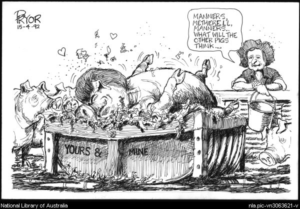
For hand-wringing politicians and media, the resulting hullabaloo provides further fodder for knocking the youth and tilting funding to the rich. So help me if the school doesn’t go to the people, the people are not going to come to school. It seems the ‘Back’ the overlords want to take us ‘Back To’ is our days as a penal colony. It took another Labor Minister, John Watkins, to bring some intelligence to the vacuous policy, observing that the Department ‘works in neither the interests of teachers nor students’. Wonders never cease.
Aye-aye, the policy beggars belief. Like much anti-socialist snarling and spluttering, quacking and squawking, this guff draws on bodily imagery: that of the social sickness and disease of progressive educators, carriers that must be inoculated against. The antibodies want a firewall to thwart it’s spread. They believe their own biological superiority. It’s hard to get a word in to pin them down about it. Like shearing a pig, there’s a lot of squealing and very little wool.
As for the voodo ‘educators’ thinking they were born superior, I’ll be a monkey’s uncle.

True, the more imbecile of them do furnish proof that some men are children of a lesser god. Endowed by their makers with dim wits, impermeable to reason. Yet how can anyone hold to their argument without reservations when aware they’re talking about themselves. They were born to fool, not rule.
At the same time there are those of them putting us on. Treating people like mushrooms, keeping them in the dark. Feeding them their ‘-–it’. As their leader summed up ‘–it happens’. It just so happens they’ve stockpiled tons to feed people. Regarding child abuse, it is their own culture of acting behind closed doors and low professional priority that facilitates this. Wasn’t there enough spirit of glasnost to extend to us as well? As for its call for corporal punishment, it is wiser to promote non-violent methods of conflict resolution so as to guard against a culture of violence. The cane might elicit short-term behavioural improvements. If an adult belts a child with a stick it’s going to hurt and it might be two or three months before the child repeats the behaviour. But this only hides the behaviour – it doesn’t fix it. Poor behaviour is often a result of things going on in children’s lives, so hiding that behaviour isn’t going to solve anything in the long term.
It would be wrong to idealise children as cherubic treasures who know not what they do and who are never intentionally bad. But they are still children, innocent and impressionable.
In commenting on bullying in the new millennium, Premier O’Farrell said ”Parents have to be concerned about estimates that up to half of the students in year 9 are either being bullied or bullying others.’ [167] While allowing for the fact that this is another alarmist beat-up, there is a big problem in this area. The rise in bullying as other mental disorders in children is largely the result of current societal conditions e.g. a disjointed society and the loss of nurturing, non-stressed parenting.
The bullying is taking a heavy toll on school principals, themselves bullied into implementing the educational ‘reforms’. Compared to the general population, principals experience a higher prevalence of violence (seven times higher), threats of violence (five times higher), and adult-adult bullying (four times higher). [ According to The 2014 Teachers Health Fund Principal Health Wellbeing Survey Report]
Mr. O’Farrell returned his predecessor who introduced the educational ‘reforms’ to public office after his becoming an executive in the tobacco industry. The former premier argues his successor had inherited a ‘first-class shambles of global proportions’’ in infrastructure. To align perception with reality ,to pull the fat he claimed he was cutting out of the fire, he says there has to be a focus on introducing economic rationale into planning. Yet a sound economic infrastructure depends on a highly trained workforce to build and operate it and an educated populace to choose it and use it.
‘I don’t want to sound immodest, but I’m the ideal person, the natural pick,’ boasts the former premier. That’s a classic coming from him. His jig was not up. His successor has entrusted Mr. Fixit, who admits failure in driving the Back to the Basics education policy, with the task of identifying the infrastructure projects ‘needed to improve the lives of the people of NSW’. Seriously. Time wounds all heels?!
Presaging his return to public service, The Industry Skills Councils released a report calling for urgent action to remedy literacy and numeracy problems. ‘No More Excuses’ which shows almost half of Australia’s working age population does not have the literacy or numeracy skills required to study a trade. As well it might after so much chopping and changing between pursuit of narrowly defined vocational objectives and a fuller rounded less instrumental education has created much uncertainty in the system. We can only hope than when the heads of the decision makers stop turning, their faces are to the front again.
The Australian Chamber of Commerce and Industry chief executive said business was having to pick up he load.” We shouldn’t be the primary provider of basic literacy and numeracy education in Australia,” he said. ‘Australia’s education system is structurally flawed when it comes to literacy and numeracy. As a result, between seven and eight million Australians are in danger of being confined to low-wage jobs with little prospect of improvement.’[167]International studies have shown that over the past two decades Australia’s literacy and numeracy skill levels have stagnated compared to those of other countries.
The same decline has continued throughout the years. The Programme for International Student Assessment (PISA) report released results in late 2019 showing Australian students registered record low results in reading, maths and science. The decline was particularly pronounced in NSW.
The NSW Coalition Minister for Education said the results showed ‘we have a lot to do when it comes to lifting performance’.
In 2020 the Coalition Premier came up with a renewed policy aimed at lifting performance. Over a generation after her predecessor had brought in the Back to the Basics policy she announced in June 2020 her government would bring in a -yes, you’ve guessed it, another ‘Back to the Basics’ approach to education, scrapping ‘ excess’ subjects like ‘Lifestyle Studies’ and ‘Puppetry’, ‘Leather and Wearable Art’, subjects that could attract kids off the streets, subjects that can give rise to an interest in writing and culture. Studying these subjects should involve learning concepts subsumed in science, mathematics and literature.
The content of subjects deemed niche can be integrated into existing subject areas.As an example, wearable art may be placed into the existing art curriculum rather than taught as a separate subject.
‘We need to cut the number of those extra courses that really don’t contribute to anything post-school,’says Minister of Education Mitchell,‘while still allowing students to be creative.’
How can it be said the knowledge gained from such subjects can’t contribute to students after they leave school?
Do we have to be so dependent on cheap commodities and entertainment from overseas rather than that created by our own people? Especially with the trade war being promoted by Washington threatening supplies.
Is it more productive for people in lockdown to watch Netflix or make functional pots, baskets and to entertain each other?
‘For 30 years, unnecessary lessons have snuck into the curriculum,’ Ms Berejiklian told The Daily Telegraph.
One has to admire the stealth of these electives after her party had vowed to scrap them at the beginning of those thirty years.
The Premier claims such ‘paring back’ the curriculum ‘clutter’ albeit ‘selfish’ will lead to a stronger country.
“I want NSW to have the highest education standards in the world,” Ms Berejiklian said.
“We have a long way to go in making sure our students can compete with the best in the world and that’s exactly what we need to do.’
This will have to go well beyond semantic changes to curriculum.
Her federal counterpart Senator Birmingham dismissed the value of subsidising tertiary subjects such as ‘energy healing’ which he implies is woo woo. If that is the case can’t it be taught in a way that allows the teacher to replace it with something proven to be more scientifically based.
The Senator also skittles out the value of basket weaving which along with other crafts like pottery and puppetry are seen within the coalition as unworthy.
The NSW government is looking at introducing a new system of tracking students after they leave school, to try and reduce the number of unemployed graduates.
The idea is that every public school pupil will be tracked for five years after they graduate, and principals will be issued with targets to cut the number of students who end up out of work.
This will be a big call considering the constant replacement of labour due to intense technological change.
Not to mention the resistance from citizens increasingly being tracked and monitored on an disturbing level.
Surely a widening of the focus of education and promotion of universal literacy would bring better results?
This major overhaul of the NSW school curriculum could lead to narrowing the focus of education and fail to address inequity between students, a University of Canberra academic has said.
Associate Professor of teacher education Dr Philip Roberts said cutting courses that were developed by schools and focusing on core competencies and vocational outcomes could lead to a narrowing of students’ education.
“It’s a certain type of education that leads to easily measurable outcomes rather than broad-based understandings,” he said.
‘We’ve got a whole shift in what the nature of education is in this country. It’s not to be educated, it’s to be trained.’
Dr Roberts said one of the causes of the cluttered curriculum came from the way teachers were assessed on every syllabus dot point, which were never designed to be individual measurable outcomes.
‘In the HSC, teachers are worried that any little dot point could be a question so they focus on the dot points rather than covering an overarching body of work set out by the objectives. The dot points are just elaborations on that. The assessment drives them down that path.’
Dr Roberts said those subjects were developed because there was a particular need or interest in the school community and students learned literacy and numeracy skills through those subject areas.
His research into curriculum in regional schools found that classic academic subjects tended to be studied by well-off students while those from a lower socioeconomic background and regional were encouraged into vocational subjects.
‘We see a number of those more classical subjects tend to be studied by more advantaged students in more advantaged schools so there’s actually not an equal system in the first place. It’s actually removing options that keep kids in schools and makes school relevant to them,’ Dr Roberts said.
‘I’m not clear how it is enhancing equity for the least well-off or those who have traditionally not achieved. It seems as though it’s subtly reinforced in some ways the position of some subjects over other and forces the school-to-work pathway.’
The Berejiklian government will also consider ability-based progression.
That will allow students who have mastered the curriculum to move ahead and give others who are struggling more time to continue to get a handle on the basics.
“Unfortunately, if a student is behind and the curriculum moves on, they may never catch up,” Minister Mitchell said.
‘On the flip slide, if a student is advanced and ready to move on there is very little support for that.’
Such a change would allow a teaching method I tried unsuccessfully to introduce to Concord High school a generation earlier.It had led to the charge that I was ignoring some students because all students were not observed to be doing the same thing at the same time.
The next federal Coalition Minister after Senator Birmingham said the decline in literacy and numeracy skill levels ‘should have alarm bells ringing’. Unfortunately for everyone the alarm system broke down years ago. His recommendation is for the states to be ambitious and ‘go back’-yes, you’ve guessed it- ‘to the basics’.
However Geoff Masters, the chief executive officer of the Australian Council for Educational Research (ACER), which runs PISA in Australia and is reviewing the NSW curriculum, pointed out PISA did not assess basic skills, and instead focused on higher-order thinking.
The Minister appealed to his state counterparts to work together with him to turn these results around. It hasn’t occurred to him that’s it’s this bankrupt, backwards policy that needs to be turned away from.
As for the edcons claiming their approach will lead to economic take off, I’d say pigs might just fly at that.
As for their capacity to drag humankind backwards— well, swine flu.
Will their rebranded government deal quickly with the educational problem it lay ground to? The former premier says of his new approach ”You will end up with a more measured approach, with less of a commitment to the speed of achieving results than perhaps I had – but I don’t think there’s any evidence to say that is necessarily bad, because a lot of these issues are long-term.”
Whether they destroy quickly or slowly, it will take a long time to repair the damage.
With regard to social infrastructure it didn’t take long with the government selling off large slabs of public housing assets to raise funds-– an approach described by the NSW Auditor-General as ‘not financially sustainable’- and the deepening of the state’s housing crisis. Mr Fixit said he had made ‘little progress on social housing while in power, and little had been achieved in the 23 years since’.[SMH May 25,2015, Nicole Hasham] ‘At the end of the day the existing stock is crap and the new supply is non-existent,’ he said. ‘This is an area where something bloody well ought to happen’.
His successor as Premier linked school-yard violence with the culture of bullying in NSW schools-but only to that involving children, not teachers. His Minister of Education correctly recognises that “school education is the greatest opportunity to intervene in people’s lives – to change their trajectory – particularly kids from a disadvantaged background,”[168]. He knows that ‘intervention in education can play a crucial role in keeping people out of prison. Our prisons are full of people who can’t read and write. When those issues are addressed at school it can take lives in a completely different direction.”
He hasn’t yet determined when the issue of those who have to address these issues will be addressed.
As for the charge that the bureaucracy is Maoist, it’s true it’s defenders indulge in garbled doublespeak and at times a completely falsified way. It’s true educational public discourse has been conducted by means of slogans and campaigns, not debate and reason. Like Mao, the defenders often made some striking, media-friendly phrase or gesture and then conducted a denunciation and persecution of those who disagreed, rather than entering into argument themself. Mao often let his supporters know what they were supposed to think and do by means of informal, folksy declarations that could mean almost anything.
Mao painted the Chinese state he helped create as controlled by a ‘bourgeois state apparatus’ just as the Coalition paint the N.S.W. bureaucracy as a convenient obstacle to target.
But is this influence the result of what retiring spy chief Lewis would declare to be the unprecedented rate of foreign interference in Australia’s affairs? Others didn’t hesitate to name China as the espionage threat.

At the same time there has no attempt to emulate Mao’s Hundred Flowers campaign. In February 1957 Mao invited criticism of the party under the banner of “Let a hundred flowers bloom, let a hundred schools of thought contend.”
The N.S.W. bureaucracy allows the sound of only one school of thought. Their Master’s Voice.
Young, Foolish and Ultra Right.
A book written by a prominent journalist and insider Greg Sheridan provides some candid revelations and admissions about the role of groups outside the Teachers Federation, intelligence agencies and political fringe-dwellers who sought to interfere with the operations of the Teachers Federation. It fills in the information gap regarding my dismissal, ones which I couldn’t have known at the time.
History can sometimes take a long time to reveal all of its secrets. But when key and interesting blacked out information comes to light, even years later, it is worth publicising, dissecting and putting it into some sort of explanatory context so that future generations can learn and move forward.
Details of these machinations were brought to my attention by Denis Fitzgerald, Federation Vice-President who has kindly approved my drawing upon the results of his analysis.
In the early 1980s, a curious alliance of elements of the labour movement, the leadership of the Labor Party and those from the extreme right wing National Civic Council[NCC] joined forces to overthrow the leadership of the Teachers Federation. The activities of the NCC were closely linked with the breakaway Australian Labor Party (Anti-Communist), which eventually became the Democratic Labor Party (DLP). By allocating its preferences to the Liberal Coalition, the DLP managed to keep the Australian Labor Party out of office till Whitlam’s victory in 1972.It was a proscribed organisation in the ALP, and ALP members were not allowed to belong to it or co-operate with it too closely.
But principles meant nothing when it came to ALP leaders white-anting the Teachers Federation. It had been an independent thorn in the side of the ALP government of the day. Not long before, an Annual Conference of the union had overwhelmingly rejected the idea of affiliating with the ALP.
What Sheridan reveals in his published When We Were Young & Foolishis that leaders of the ALP, joined by officers of the Labor Council and the shadowy and religiously-inspired National Civic Council backed a team in the Federation’s presidential elections in order to change the leadership, orientation and culture of the union.
Being the Catholic he is, this self-styled “hero” of his own memoir is keen to confess his own faults, even if his achievement of mischievous, meddlesome interference survives the act of contrition. His objective was not just to report news but to make news.
And sell newspapers it did. This right wing generated ‘crisis’ of education became an issue of the first order. While lacking solid evidence, it captivated its readership. With its lurid prose and shocking, fearful and menacing images, it tapped into parental anxieties about child safety, moral security, unemployment and career prospects. Letters poured into ‘The Australian’. Their conservative writers were all opposed to egalitarian and progressive strands in education.
Sheridan discloses that the standard modus operandi of such capering was to gain huge donations from big business to fund union interventions such as these whilst the campaign work was carried out by unnamed operatives from the various organisations.
‘What happened in the 1983 union presidential elections,’ says Denis, ‘was a massive ambush campaign in support of a presidential team which, it might be gently observed, had a modest involvement and understanding of either unionism or the needs of public education. It was a “leadership” group that was the team of choice of the privileged, the rich and the fervently conspiratorial.’
The key campaign intervention was the deployment of direct mail, hand-addressed correspondence to every member of the Teachers Federation. This involved approximately 50,000 letters written to union members and was preceded by the Minister for Education distributing material via the media attacking the union leadership.
So while I was teaching children with great difficulties writing, this clique was busy writing to ensure that efforts such as mine would go without support.
Sheridan confesses to overseeing campaign material for the election, whilst employed as a journalist on The Bulletin: ‘My main contribution to the Pagett campaign was to find quotes from both Neville Wran and Nick Greiner to the effect that the Teachers Federation’s behaviour had hurt the reputation of teachers.’
The cost of the mailing would have been in the realm of ten times that expended by the incumbent presidential team . The time and personnel required to produce such a mailout would have been huge. As Sheridan admits, “It is immensely expensive to post campaign literature to every member.” The group led by Ivan Pagett were boosted to electoral victory.
Other bizarre liaisons revealed by Sheridan include regular meetings between senior ALP figures and ASIO operatives, when information about trade unions was exchanged. ASIO had a long and collaborative working relationship with the NCC.
ASIO’s intrusion into the affairs of the Teachers Federation goes even back further than the 1980s. When Denis Fitzgerald was researching a history of the union, Teachers and Their Times(University of NSW Press, 2011), he interviewed Thomas Shepherd, one of many people employed by ASIO to spy on individuals active in Federation.
After years of such work, Shepherd disappointed his ASIO minders mightily by uncovering no leftist conspiracy, no scandal, no Moscow Gold to fund it, no grand communist strategy. Instead he reported to his superiors that, “the Teachers Federation was an organisation committed solely to the wellbeing of its members and public education”.
The teachers union was not the sole object of such voyeurism at the time as other groups such as the History Teachers Association (HTA) were also infiltrated and examined to detect unorthodox thoughts and tendencies influencing syllabus development. Each member of the executive of the HTA was spied upon by ASIO and records opened on them.
What Sheridan and those strange times reveal is a certain infantile McCarthyism that infected the course of history. Drawing on the accumulated techniques of cold war propaganda, he branded government education as subversive. Early on, this determined operator manifested that occasional adolescent fear of other people’s ideas.
Like Nixon and Murdoch, he wasn’t enamoured with Whitlam’s open society and his going against the strategic interest of the U.S.
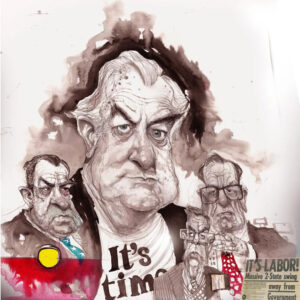
Coached to oppose with his every breath any progressive cause going, he set to detecting sinister forces at work that justified any intervention or utterance. All this made teachers like me red meat for this budding inquisitor on the prowl.
Anti-communism was the prism through which his entire ideological perspectives were formed and maintained. This crusade involved uncovering any ‘nests of traitors’ operating as a fifth column for a foreign power with a masterplan to seize the reins of government. Carrying a flaming torch for the right wing Catholic ideologue Santamaria, this National Civic Council functionary devoted his political activity to eroding what he saw as the threat of the left in the education system.
Friends with fellow ex-seminarian Tony Abbott, he began his religiously inspired activism against left wing student opinion and unionism as turbulence swelled in Australian politics. They lamented the wide range of political and social causes pursued by the Australian Union of Students on campuses across the country, especially with the Vietnam War being over.

Another prominent journalist and commentator says of his colleague: ‘Young Greg was – and remains – a traditional Catholic. He believes in God and is not afraid to write that.’
Why should he have to be afraid? He’s not a Muslim, is he?
Contemporary Australia is not Stalinist Russia.
Talking about ex seminarians, when Sheridan was one, he “saw at the foot of the altar, a woman in radiant white robes kneeling in prayer” – the “most beautiful sight” he has ever seen. An apparition – in the Catholic parlance of the time.
In the eyes of the sceptic, ‘God only knew what he was on at the time’.
His colleague says Sheridan has “had no trouble with religious belief” but, correctly, acknowledges “living up to the belief … has been enormously difficult”.
It’s easy to see why. What he does can go against basic Christian teachings of love and peace.
He describes himself as having been ‘misguided’ as a young person. It didn’t stop there
Years after helping to bring down a union leadership, Sheridan still seeks out conspiracies and paradoxically uncovers his own extremism. In that time, he has displayed a febrile mind matched with a bellicose temperament. An insight into his qualities was listed by the Bulletin’s editor: ‘a quarrelsome, difficult, unpleasant personality which succeeds so well in journalism’
These qualities came to the fore in his full-frontal going-over of teachers. Exhibiting sweeping generalisation, exaggerated metaphors, intemperate and foul descriptions of opposing views, this self-styled champion of academic excellence demonstrated a sinister vagueness about the enemy he’s getting at. In the lead up to my dismissal he spoke of ‘vipers teaching children lies’, teaching syllabuses which are deeply hostile to Australia, to the US, to capitalism, to European civilisation, to industry, to Christianity. They, in fact, embody a widespread hatred for our society.
He sees them as ‘mediocre talents who adhere to a variety of fruit-cake ideologies with little regard for serious scholarship which conflicts with their views.’
In human rights education, and other areas that deal with international poverty, he sees ‘updated derivatives of Lenin’s theory of economic imperialism’ being ‘promulgated to convince students, against all the evidence, that the Western industrialised nations are the cause of Third World poverty’.
‘Against the evidence’ one cannot deny one’s adversary in any dispute.
But ‘against all the evidence?!

And why the selection of Lenin as regards these?
And wouldn’t he have seen it as the main but not the only cause of Third World poverty?
Lenin never left out the role of the comprador capitalist class who share the scraps and the spoils.
Mr. Sheridan believes that ‘the general thrust of curriculum reform in Australia in the past few years has been to water-down traditional and academic courses in favour of more “life-centred” and “relevant” courses, designed to be easier and more interesting for students. It is thought that by transforming education into entertainment, more students will stay at school beyond compulsory years.’
As a backer of Mr. Pagett, he must have been informed that the traditional and academic courses at Concord High were watered down but not in favour of any entertaining alternative. And why shouldn’t non-academic students be encouraged to find learning as interesting as their more serious fellows?
He deplores the degree of decentralisation of much decision-making in curricula to school level, rather than curricula being centrally set: ‘The external examination, the only guarantee of some uniformity and coherence in education, has been steadily eroded.’ What he doesn’t know is that it will be some in his political circles who’ll do the eroding by proving incapable of securing the examination papers.
He sees such teachers as pseudo-radicals trying to ‘convince students that everything is relative, no one set of moral standards is any better than any other, and that traditional customs are, at best, a curious anachronism.’
Which teacher wouldn’t see his or her moral standards as much better than his? They wouldn’t have to be very high.
Sheridan says such teachers are guilty of ‘a grotesque and dangerous hypocrisy. They say Australian society has given out being one in which there is moral and religious consensus. Therefore, schools can no longer indoctrinate traditional values.
But in their own indoctrination courses— such as peace studies, human rights, non-sexist or multicultural education— they change their clothes and become old-fashioned social engineers, using education to “raise the consciousness” or “challenge the attitudes” of children.
They hold as a standard part of their mythology that, in a capitalist society, the education system reinforces the ideological hegemony of the ruling class. It is up to idealistic socially aware teachers to provide “critical” education, which challenges this hegemony.
This is almost a mirror reversal of the truth, for education is increasingly one of the major subversive (in the strict meaning of the word) influences in our society.
Sheridan sees such teachers as replacing traditional religion with the new secular religion of environmentalism. Accompanying it are ‘endless Malthusian delusions about the doomed future of the planet because of over-population and under-production, and the evil effects of industry. Out-of-date, contentious and often inaccurate information is given to school children to show them the path of disaster the world is treading because of the sins of capitalism.’
As for peace studies, he sees those who teach them as trying to scare children into pacifism.
He began his years in politics justifying the Vietnam War. Since then, he has barracked for every ill-considered war and hectored those that questioned military conflict. Sheridan has scarcely located an international complexity that could not be ameliorated by bombing and shooting.
He has claimed that President Obama was conducting an “anti-Israel jihad”. Years before he declared that George W. Bush is, “really a modern Winston Churchill”, one of the great presidents of the United States” and also observed that anyone’s doubts about the claims of weapons of mass destruction in Iraq were “ludicrous”.
Moving on from the Teachers Federation, he has discovered in the ABC another hotbed of sedition wherein, he has alleged, employees have praised the Soviet Union, supported apologists for Pol Pot and vilified Catholicism. Sheridan claims that the broadcaster “will go to great lengths to prosecute its endless war against the dark forces of conservative Australia”.
A vocal supporter of Suharto’s rule in East Timor, this ardent critic of teachers and students he accused of defending Communist totalitarianism would mock the eyewitnesses of a massacre near the Santa Cruz cemetery in November 1991.
“The sad truth,” wrote Greg Sheridan, “is that even genuine victims frequently concoct stories.”
Not much sympathy for fellow Catholics from a man brought up to condemn persecution of Catholics by Communist regimes.
‘Every night,’ he says, ‘I thank God for his tender mercies.’
Suharto would show no such compassion to the people of East Timor.
Sheridan would also vehemently oppose Howard’s 1999 intervention on our small neighbouring island and wartime ally.
At the end of his memoir, our ‘hero’ concludes with the question: ‘Will God forgive me for my wrongs?’
No one can speak for God but there are countless activist citizens who will not forgive him for his role in the subversion of their democratic rights, for undermining their lives and careers .
Thou hypocrite, first cast out the beam out of thine own eye; and then shalt thou see clearly to cast out the mote out of thy brother’s eye.
Matthew 7:5
Les Enfants Terrible.
“A good head and good heart are always a formidable combination. But when you add to that a literate tongue or pen, then you have something very special.
Nelson Mandela
Never doubt that a small group of thoughtful, committed citizens can change the world; indeed, it’s the only thing that ever has.
Margaret Mead.
Fast forward to 2016, spokesmen for The State of New South Wales added a new dimension to the Spectre posed by teachers and students.
That posed by trainee teachers.
My imagination was set on fire by the picture painted of them.
Driving me on, it has impelled me to add to the call to arms:
‘Citizen of New South Wales,
Not matter the write stuff .Do you have personality plus?
NSW teaching students will face personality assessments from next year, the NSW Board of Studies has confirmed. [Teaching students to face personality assessments SMH Jan 22.]
The President of the NSW Council of Deans of Education, Chris Davison, said the assessments will draw from tests similar to those undertaken for the army and will weed out candidates unsuited to teaching before they begin their degrees.’
Me: ‘If they have this test that can select people correct for teaching why weren’t they using it last year or the year before that. That is because they don’t have a test.
“The challenge is to have one that works for teaching. You probably need a much higher degree of empathy than you do in the army,” she said.
It’s instructive that this leading academic compares educating children to training military personnel.
Anyone who’s worked for the NSW Department of Education or read about it knows empathy, like attaining universal literacy, is not a priority.
How much empathy do you need need in the army?
My invaluable experience in the armed forces and reading and writing about it { inletterandinspirit.blogspot.comFind‘alarums and excursions’}tell me it always exists amongst the rank and file. However it has led me and many others to conclude it’s not always a virtue that’s officially encouraged.
For some the armed forces’ function is seen as much more about hostility than empathy. For them it’s purpose is training to kill a designated enemy obediently.
So why start with such low expectations of those wanting to join the teaching profession?
Why start at such a low level of empathy?
And how much do those behind the new control measures exhibit this quality?
To understand this we must understand the personality and psyche of those who are visiting this embarrassment upon the citizens of New South Wales.
The Board of Studies’ move to institute personality tests at all universities comes after a crackdown on teacher training by the NSW government in September.
Professor Davison said that the national program was necessary despite tough new regulations on literacy and numeracy imposed by the NSW government.
“We already have high teaching standards in NSW schools, said Education Minister Piccoli in September,2014, ‘but we need the high achieving students of today to be the high achieving teachers of tomorrow.”
Me: So how come with such high standards are such measures warranted? Are aspiring teachers being deliberately shielded in schools from these standards?
Professor Davison said the personality assessments were being implemented because students with poor communication or behavioural issues were still undertaking teaching degrees.
“At one stage it emerged that someone in our own program at UNSW had major psychological problems,” she said.
If one looks at earlier versions of their program, they let us in on their own communication skills, behaviour and psychological problems. Those must be seen against those of others deemed to be Personality Minus.
“They already had a degree in another field so had passed the academic requirements but they couldn’t maintain eye contact, they couldn’t maintain conversation.’
‘Come on , you’ve got to be joking..
We found out they had recently been released from psychiatric ward and had problems interacting with people.
‘So why were they released, one asks?’
And were they re-committed?’
And how did they pass the high academic requirements of our established universities.’ Using the tests is a vote of no confidence by the Board of Studies in the ability of university faculties of education to assess the learning and practical competence of their students. This is particularly worrying given that one of the things these faculties teach is “educational assessment and evaluation”. “Their counsellor suggested they take up a teaching degree. I counselled them to withdraw.”
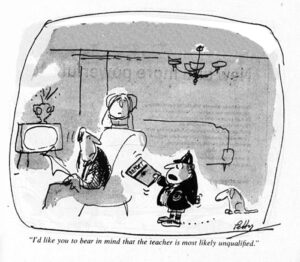
She would have advised the same to Einstein if he applied to teach in N. S. W. today. Even if he were to tapdance his way into a NSW classroom, dressed in a tutu with the sunniest disposition, it would be his lack of ability to control children that failed him.
Professor Davison said the tougher academic regulations announced by NSW Education Minister Adrian Piccoli at UNSW in September were “ironic, because we are not affected by them”.
Me: ‘How fortunate to be in that situation. For most people, such continual attacks on the ideal of a free, compulsory and secular system of the highest standards have affected them deleteriously for many years .
But trainee teacher wait, all is not lost. Do we have a deal for you. Just forget that stuff about secularism.
There’s a miracle cure on offer. Despite the crackdown, second chances have been extended to trainee teachers who have not met the new standards. At the University of Notre Dame Australia, students who failed to get the required marks will be able to take a bridging course. The course will focus on HSC English and the seven key competencies outlined in the Australian Curriculum: literacy, numeracy, ICT capability, critical and creative thinking, personal and social capability, ethical understanding and intercultural understanding.
The Board of Studies’ move to implement personality tests at all universities came after a crackdown on teacher training by the NSW government in September, 2015.
They were at it again exactly a year later. Under new hiring standards, graduates will only be allowed to apply for jobs in the public system once they have shown ‘superior’ cognitive and emotional intelligence in a psychometric test administered by the Department of Education.
One thing is for sure. The politicians behind it would fail abysmally judging by their language and practice.
They wouldn’t pass the smell test.
Practical teaching experience will be heavily scrutinised. So what’s new?
One must keep in mind crackdowns on teachers themselves and their costly consequences.
This is the limit! It’s the increasingly pathetic control measures themselves, not the calibre of our students or universities, that’s responsible for our baleful statistics for literacy and numeracy.
Here’s their final joke. The Sydney Morning Herald reported the last requirement thus: ‘Applicants will also have to show a committment [sic] to the values of public education.’ This coming from those who’ve gutted and debased it systematically.
‘Don’t you wonder sometimes ’bout sound and vision’ D.Bowie “I have never let my schooling interfere with my education.” — Mark Twain
The policy throws light on a wasteful system about which many express the view that they learned, not because of it, but in spite of it, in which many teachers and students don’t have a prayer of testing their dormant talents. In which based on postulates of opportunity and mobility, the myth of people being able to move in and out of classes is shown as fake. Even so, a very seductive system for me because if nothing else it exposes similar possibilities the soviet model did, of the vast potential of the upcoming generation just waiting to be tapped fully. With the clock ticking we will need all hands to the pumps to get to grips with the Homeric environmental and economic crisis we face. This generation will hopefully grow up at least without that self-deforming image of innate superiority purchased for other children by their parent’s wealth. It’s the driver behind my mission to debunk eugenics and the myths surrounding it.
The value of eugenics as a weapon would not be lost on the buffoonish president of the US, a country our state leadership feels a need to learn from in educational policy. Trump sees problems as all to do with whether a people have got ‘good genes’ or not: ‘I’m proud to have that German blood … great stuff,’ he brags. He claims that immigrants have bad genes that made them “criminals’.
His Acting Under Secretary for Public Diplomacy and Public Affairs has declared with impunity: “Competent white men must be in charge if you want things to work.”
His former chief of staff, retired Marine General John Kelly, said Trump made admiring comments about Adolf Hitler: ‘He commented more than once that, ‘You know, Hitler did some good things, too.’”
Trump shares Hitler’s belief that the mentally and physically disabled are unworthy to live. Trump’s nephew Fred said his uncle once told him to abandon his [Fred’s] disabled son , saying, “He doesn’t recognize you. Let him die, and move down to Florida.” After a meeting in the Oval Office about dedicating more resources to people with disabilities, Fred Trump says his uncle told him, “Those people, the costs. They should just die.”
Echoing Nazi thetoric he would claim that millions of deadly ‘snakes’ and potential terrorists are being ‘let’ into the US illegally and are coming from prisons, from mental institutions — from all over the world and ‘poisoning the blood of our country’. He would add ominously that “we got a lot of work to do’.
No one can be proud to have German blood. If nothing else was learned from World War Two it was that.
Of course no one need be ashamed of having ‘German blood’. Germans have overwhelmingly learned the lesson of being led to think they’re the master race and redeemed themselves.
Can The Don do likewise? Can he become more than just another wise guy?
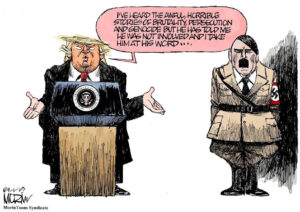
It’s one thing for him to tell this hokum to his supporters as individuals. But to say such things straight out to whole communities of overwhelming white people in the midst of a pandemic that disproportionately impacts people of colour and the disabled is another thing. He would say it in the context of heightened racial tensions following widespread police attacks on black people.
This man on whom world peace still rests to a great extent doesn’t believe he needs to study or read or consult with experts because he already has the knowledge he requires. He believes he has an innate ability to instinctively know the right thing to do. A self confessed ‘stable genius’, he simply does whatever he feels like in the moment secure in the knowledge that it must be right . He boasts ‘A lot of people [say], ‘Man, he was more accurate than guys who have studied it all the time.’
He would praise Henry Ford’s ‘good bloodlines’ despite Ford’s anti-semitic writings and his relationship with the Nazis.
Trump and his defenders might say that his ‘racehorse theory’ merely reflects the common view that there are superior people with the ‘right genes’ like him.They might say he just re-iterates the view that if you put together the genes of a superior woman and a superior man, you get a superior offspring. But there is a dark subtext here. Depending on who is listening, he is talking about much, much more. He understands that the majority of people are susceptible to these messages of racial fear .That they comprehend them not as racism but as common sense expressed as manners of speech. It doesn’t take a secret decoder ring to understand what Trump aims at. The idea that white folk, like racehorses, have superior, inheritable genes is white supremacist and to be embraced not as a cultural construct, but as if it were based in hard science.
He would gleefully embrace incredibly dangerous white nationalist tropes and ideas. These would come out of his mouth from an attempt to trigger fears and resentments rooted in racist stereotypes, but in a way that allows politicians like him to deny that’s what they’re doing. He wouldn’t say ‘white genetic superiority,’ he would just say ‘genes,’ so there’d still be some slight cover.
The ramifications of this for our society are deeply chilling, and made concrete in the soaring death tolls for vulnerable communities. To have the president give voice to those ideas is profoundly dangerous for his country and the world.
Like some of our own politicians,he wants to replace the teaching of history that tells the whole truth, including the parts no nation would want to repeat such as forced sterilizations, with a scheme to make schools teach American exceptionalism, flaws erased. ‘We will stop the radical indoctrination of our students and restore patriotic education to our schools’,he rants. Sounds familiar? Maybe his team have been following the success of our own eugenist politicians and are cross-fertilising such ideas and practices’.
The other driver behind my mission is to help contribute to the introduction of legal machinery which would allow all teachers to have access to an independent professional body. Some see this as a threat. It would consider more than the requirements of the cadre system. It would consider both the ability of teachers to convey ideas and information and their role as protectors of the welfare of the child as factors of importance. The rest is propaganda.
I saw it as a play to get inside the heads of the young and develop their conscience, not by sermonizing but by sharpening their intellect. This is the ability in which I define myself. a role in which I, nudging my fortieth birthday couldn’t wait longer to work myself into. This knowledge highlights the importance of my holy grail – support for an around the clock outreach, offering young people a guide to daily life in Australia. A survival kit, it would help to minimize the risks to children, such as the kind who were in my care, to enable them to have a good hold on the world around them, to broaden their sense of what a human being is, and to be able to express what they want to say. That these aims are not met by the poor man’s education setup should be a matter of concern to a population who have been constantly warned to be alert to the activities of ‘terrorist’ enemies by leaders who say it’s only a matter of time before there is an ‘incident’.
The beauty of a democratic public education would be that it is the one area where domestic social tensions could be damped down without cost. Much of the violence that does occur in schools is mindless and could be reduced greatly if democratic procedures were introduced. Throwing money at them without such reforms is no solution. The answer is right under our noses, staring us in the face. The intelligence of our children harnessed by a save-all to avoid the massive waste of time, paper and electricity of endless repetition. For the love of God, why can’t the authorities see this. I’m not so naïve as to think that universal literacy will square all the circles- but much of the anti-social violence that occurs outside schools, whether opportunistic-vandalism, glassing, road rage, the king hit- ‘the cowards punch’- for example- or racist could be minimized. Education, by itself of course, is unable to provide a panacea for the ills of society and the many social injustices imposed upon it. A major social revolution would be required to provide any sense of equal footing.
I was interested in the struggle to make procedures work better – right now – not in waiting until some revolution, somehow, sometime, comes about to raze the current system altogether, to replace it with perfection.
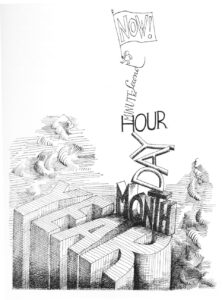
After rioting broke out in the Cronulla area of Sydney between groups of Lebanese Australian youths and aggrieved ‘whites’ putting the rant back into migrants, one response was to set up mobile educational units to allow the communities some understanding of each other. Why can’t such understanding be systematized and encouraged in schools in the first place? Why can’t we achieve the same rights for young people our leaders claimed were fighting to bring to Afghanistan?
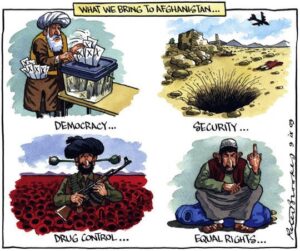
This would have helped forestall what the former chief of the Australian Defence Force, General Peter Cosgrove described as the ‘cowardly and sly’ attacks on Indian students which he linked to the Cronulla riots. ‘It is easy to conclude that they are racially targeted’, he concluded. The General was taken to task publicly for tackling the issue by politicians in deep denial, eyes wide shut, craving froth and bubble, no mention of trouble, anxious as always for window dressing. And privately by those gloating at the attacks. Short memories. When will they ever learn? Conditions of social dislocation and economic freefall steal the clientelist appeal of the ruling parties. Many of their voters turn towards those who make no secret of professing what traditional politicians only imply. The privileged strata who see the cultivation of a fascist mass movement as a legitimate reply to any inroads made by the left play with fire. While the mainstream left hope that this movement will evaporate by itself, it never does. What goes around comes around and can explode.
By encouraging all children to read and write in the first place, a tried and true teacher’s approach, such commotions as at Cronulla would be much less feasible. An educational guide like mine would help neutralize the instigators. A boon for the hoon, the goon and the loon. It would help counter the widespread perceptions of decay and victimisation, feelings of national persecution and humiliation cultivated by the chauvinist mainstream media. Habitually presenting prominent racists as normal people, exploring their lighter side and even turning them into lifestyle icons or tele-celebrities. It would render young people subjected to violent pauperisation, feeling swamped by Asians and others, less vulnerable to the advances of racist groups. It would require some curbing of the powers of this mafia of the mediocre whose interests are material, base and commonplace. These archetypal philistines, misanthropes and vulgarians control thought, not so much through what they dictate, but through what they dismiss and deny. Censorship by omission. Not by explicit statements, but by the norms which they implicitly circulate. Imagination, talent, diversity of thought, conviction and creative searching – let alone the voice of the public, or democratic processes – all held back, all anathema to it. It is hard to resist the notion that many of our leaders deliberately –despite the flap they get into over delinquency -allow the spread of an ignorant cohort of heavies and knife-wielding, drug-snorting roughnecks who tear around in herds, high as kites, belching, throwing beer cans or bricks at innocent passers-by, swearing and rendering bus stops and railway stations unusable. Hirelings who will support the right electorally and scab on others. There are three ways in which people are controlled. First of all, frighten people, secondly demoralise them and thirdly deny them literacy. An educated healthy and confident nation is harder to govern.
Which is why it was a crime during American slavery to teach a black person how to read or write. It suited the economic interests of the slave masters to keep Africans in the field instead of in the classroom. As one bluntly put it, “Learning,” he said, “will spoil the best nigger in the world.”
It suits the interests of our own masters to keep so many of our children bored, restless, not fulfilling their potential. They themselves feel protected from the consequences, in their palm-fringed chained up residential compounds with electric gates, warnings about “armed police response” and lawns kept immaculate by automatic sprinklers. Their educationists justify denying education to all the masses in their snide aside: ‘If they had half a brain, they’d be dangerous.’ Their real fear is that of a highly articulate cohesive generation demanding greater rights in schools, universities and workplaces.
Aloha Merrylands
“I’m not concerned about all hell breaking loose, but that a PART of hell will break loose… it’ll be much harder to detect.”
George Carlin
Since my neurological episode-almost a season finale- some notorious incidents involved students from some the schools I taught at -those where gaggles of idle hands mill around due to the ‘teacher shortage’, carrying out the devil’s handiwork. Leading to shock jock hoopla, the incidents brought into question our so-called superior public educational policy. 2011 saw a race-based brawl outside Hoxton Park High and a student severely stabbed in an altercation at Granville High. In April, 2008 five teenage boys from Granville school paid a visit to neighbouring Merrylands High school to demonstrate the failed educational ‘cutting edge’ practice. Armed with machetes and baseballs bats, the boys from a Pacific Islander background made their presence known during morning assembly. It is believed they were seeking retribution for a perceived slight. Entering two of the school buildings, the boyos went on the rampage, running through corridors smashing as many windows as they could, broken glass showered students huddled in the classroom leaving some with cuts and abrasions. Sydney newspapers, all over the story, suggested the attack was just the tip of the iceberg of a growing gang problem in Western Sydney driven by a romantic inspiration from a Los Angeles organized gang culture and fuelled by the internet.
The ‘racist moral panic’ was slammed by a gang culture authority, Professor Jock Collins from the University of Technology, as a media beat up. In rejecting the lurid sensationalism regarding the incident, Professor Collins thought that there’s an asymmetrical response to gangs when they’re from different ethnic groups and when they’re our gangs. He pointed out that gang violence has existed in Australia for over a century but is at a far lower level than in the US. The impression being given by ‘news management’ is that ethnic diversity is somehow destroying our society. While he admits it is worrying that some people imagine themselves through ‘gangster’ culture and promote such images on the internet – “live in honour, die with respect, steel from the rich, hang with the poor,” reads the chatter on their web – Professor Collins cautions strongly against overreacting. ‘Gang behaviour, particularly in the US is very formal very organized and very systematic’, he said.
This is the bad form that teachers like Mr P., the Baltimore cop who converted to working in a high school in the realist TV series “The Wire” must deal with every day.
As for the boys of Granville High “this is just friendship groups of kids acting though and getting into trouble. That happens, it will happen and has always happened. “But I think the problem with moral panic is we over exaggerate stuff and it draws attention away from the solutions, which is schooling, education, jobs, public spaces for youths”.
Who can deny the obvious factors that Professor Collins draws attention to? In “Gee Officer Krupke!” from ‘West Side Story’ the Jets, staging a mock scenario where a delinquent is shunted from police to judge to psychiatrist to social worker, give multiple explanations with delicious tongue in cheek irony as to why they are delinquent. It remains one of the strongest popular statements about troubled youth and the devastating effects of poverty and racism. The Jets come to the dismal conclusion that juvenile delinquency is an ailment of society-they’re depraved-on-account-a-they’re-deprived- and, “No one wants a fella with a social disease!” The song is as explicit as a sociological treatise about the causes of many of the problems of urban youth, and its acute goofiness easily transcends decades of at-risk teenagers.
A Change in the Wind?
A good head and good heart are always a formidable combination. But when you add to that a literate tongue or pen, then you have something very special.
Nelson Mandela
In 2019 [Oct 22 Ashleigh Raper ABC] The NSW Government released an interim report into the review of what students learn from Kindergarten to Year 12.
The report, written by Professor Geoff Masters, was highly critical of the current syllabus, particularly what it described as its “crowded nature”.
“[This] is not conducive to teaching in-depth or helping students see the relevance of what they are learning,” the report said.
The report also raised concerns about the “lock-step nature” of the curriculum, which the review concluded did not allow for flexibility for teachers to meet the learning needs of all students.
The report also found the curriculum was doing a disservice to senior students.
‘Teaching and learning in the senior secondary school are perceived to be overly focused on examination preparation, maximising the Australian Tertiary Admission Rank (ATAR), and university entrance,’ it said.
It said the curriculum was, “insufficiently focused on equipping every student with the knowledge, skills and attributes they will require for further learning, life and work”.
Significant changes to the curriculum are proposed to decrease the amount of content and reduce the number of subjects offered in senior years.
“The review envisages syllabuses that are leaner in content and more focused on developing deep understandings of disciplinary concepts and principles,” the report said.
“A curriculum structure that better recognises and accommodates the wide variability in students’ levels of attainment.”
The recommendations seem to me long overdue and are similar to those I proposed to the Department and got fired over.
The Coalition Premier welcomed the interim report and says she supports a “back-to-basics approach”.
The very approach that led to the problems in the first place.
The Between the Lines Education Consultancy
“Be the change you want to see in the world” – Gandhi
“In our narrow, confined existence, we tend to forget the essence of life … All of us, whatever our occupation or class, are equally guilty: the employer is lost in the running of his business; the workers, sunk in the abyss of their misery, raise their heads only to cry in protest; we, the politicians, are lost in daily battles and corridor intrigues. All of us forget that before everything else, we are men, ephemeral beings lost in the immense universe, so full of terrors. We are inclined to neglect the search for the real meaning of life, to ignore the real goals – serenity of the spirit and sublimity of the heart … To reach them – that is the revolution.”
Jean Jaures.
Some argue that revolution is something intellectuals need to get off on.
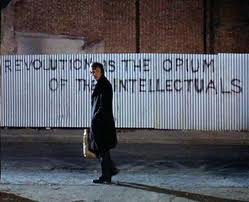
Whilst the brave new world precludes political revolution for the time being, the opportunity for personal revolution remains as ever. At this crossroad , biting the bullet, it was time to come into my own. In time anything I had said to the business reps would have gone in one ear and out the other.
I am not a defeatist. It only made my determination to succeed stronger. I never had any thought of quitting. I should forever have lost all self-respect if I had given up.
After being derailed on my career path so decisively, sequestered by the Machine, ‘losing’ not being in my vocabulary, i was spinning my wheels, chafing at my bid to carve out a new one, come hell or high water. I had returned to the N.S.W. Teaching Service fired with enthusiasm and left the same way. Regaining my momentum, getting back on track, I would steal a march on the edcons in winning over the masses. I couldn’t just flip a switch and become someone else. I took matters into my own hands. This was my baby and I had to work it out for myself. Weighing up the consequences, I set about prevailing on my own terms, bypassing demeaning pandering to the bureaucratic buzz-killing beast. Keeping upwind of it, my final labour would be to help cleanse the Augean stables.
I suppose if I had been prepared to grovel and bow my head meekly, I could have pressed to get work in the departmental secretariat. I could have become a clockwatching office worker.
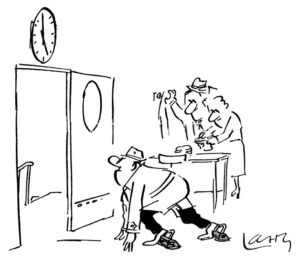
A sleepwalking, paper pushing fixture as a cushy deadwood desk jockey, in charge of rubber bands, risking no more than a shiny bum, gravel rash, paper cuts, getting my thumb stuck in a filing cabinet, pricked by a bent paper clip or my tongue nauseated from licking stamps.

A paperweight, functionally necessary, but of small significance or importance within the larger organization.
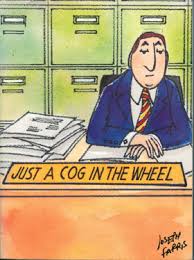
Someone who wouldn’t even be entitled to his own office.

Part of a legion waiting for the midday break.
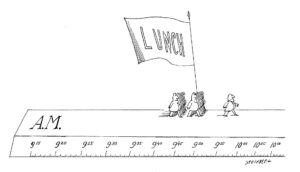
Busted down to some bean counting flunky, shuffling paper, cleaning the windows on envelopes, wrapped up in regulations, playing verbal tiddlywinks, pushing a pen on the hot airborne gravy train while fading into the woodwork. Praying for the little hand to move on relieved by breaks for tea, bikky wikkys and wee wees. Getting up to the clock, going to bed to the clock, waiting for that retirement clock. Just another day at the office marking my time.
I found this empty prospect unacceptable. To be deprived of my freedom of expression was basically to be deprived of my identity as a professional worker. The Department didn’t bother to throw me a bone. I was offered nothing and asked for nothing .No more of the elephantine and humourless look-the-other- ways the ever present, servile, dried-up, gabfesting, mealy mouthed, platitudinising, malfeasant, sinecured lackeys nobble even the tiniest manifestations of originality. A rort that was tort-meting out penurious droplets of cognitive jot or tittle. No more of their boondoggled jiggery pokery, trough snouting flummery. My message to them was plain and simple: ‘Bring it on!’ ‘If you think you’ve seen the last of me, try this: ‘You ain’t seen nothin’ yet’.
Single minded I would make headway writing my own ticket. Being of creative temperament, cut loose with exigent long-term ambitions that I needed to act on, a mite short of the elbow room, I rose exasperatedly to the challenge. Filling the huge void the government were leaving, filled by an industry tiptoeing around the real issues, covering rear ends with piles of paperwork , generating a wall to wall talkfest about ‘reform’, like that about the weather. People who individually can do nothing, but who, as a group, meet and decide that nothing will be done. Committees who keep minutes and waste hours.
You know the spiel : ‘Everybody repeat after me: ‘We are all individuals.’
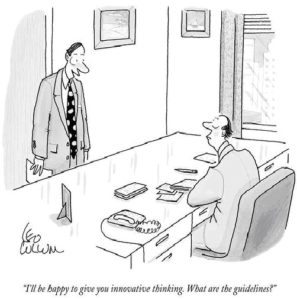
These talkers were like balloonists. They rise to where they are due to a lot of hot air. Out of the way everybody, you’re using my oxygen! Chocks away, stepping up the timetable, I charged hard, flying solo, a well-oiled lean machine, moving into top gear, speaking louder than words, striking out on my own fast track. A case of make or break, derring do or die. I had to get going if I was going to make a showing. Once I got going there’d be no stopping me. I knew I had the right of way. I believe in the possibility of something, that by putting my energy into that possibility I can make it happen. It’s belief on a concrete level.
It was patently apparent the field of popular education in New South Wales was wide open and up for grabs to any clear-sighted go-getting guru worth his salt who wanted to see it through. There for any cool, clear-eyed, visionary seeker of wisdom and truth who would step up to be counted, swimming against this surging reactionary tide. I would be the toast of the town. I wanted to stand on its head the the oft repeated and depressing truism that every human being grows more conservative the older he or she gets. Feeling equal to the task, ideologically unregenerate, suffering no backsliding crisis of faith or second thoughts-not a bit of it-I dived headlong and headstrong into the undertow, absolutely up to my eyes – to fill the gap. Mine for the taking. Opportunities are never lost; someone will take the ones you miss. Getting the jump on any potential competitors, I shot the works. I warmed up selecting another string to my bow, completing a certificate in teaching English as a second language. My game plan was to dedicate myself to offering what was missing – an around the clock on the spot service at the coal face, promoting a policy of inclusion, catering not just for the A-team moulded in the establishment image, not just for the mainstream but for for the boy and girl in the street. For children with good heads on their shoulders yet believe education is irrelevant to their lives. Children with qualities like being empathetic, creative and practical just as important as IQ, even if they’re hard to measure. Children few of whom climb out of the scholastic sinkhole, who resist learning in the formal classroom, driven by exams, target attainments and recess bells- it disrupting adolescent pleasures-but respond in their own setting. Climbing up the wall with enthusiasm, soaking up knowledge like a sponge if you prepare it for them. With plenty to say but can often only express it in an aggressive manner.
For families from the wrong side of the tracks who do not place a high value on education. With home conditions that make learning trying.
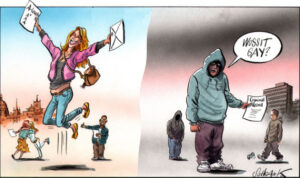
Some people see things that are and ask, ‘Why?’ Some people dream of things that never were and ask, ‘Why not?’ Some people have to go to work or spend their time looking for it and don’t have time for all that. Their children grow up in difficult or challenging kinds of environments where the kinds of skills they really have to develop are practical skills to survive and creative skills to deal with constant changes in their environment. Their children don’t have the luxury of developing abstract analytical skills but have to develop practical skills.
Spurred on to learn, young people can rise above what seems insurmountable circumstances to advance.
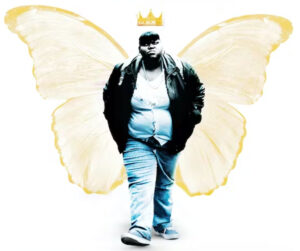
In 2020 Australia’s Chief Scientist would speak of the need to reverse the trend of declining skill sets ‘by cultivating the natural curiosity and capabilities of children.
We should put a floor under this decline by stimulating a love of learning and expertly guiding children’s enthusiasm for exploration.
By igniting their imaginations to a world of possibilities and challenging them to pursue new ideas and help solve real-world problems through the application of deep knowledge.
Equipped with the disciplinary knowledge and learning skills they need, they will be bold and ambitious in their goals.
With ambition, I am confident our children will achieve their, and our nation’s, future aspirations.
Because when we raise our standards, children raise their sights.
It starts with a renewed focus on ambition and the development of core skills.’
Class War in Walgett.
“How do we teach our children that violence is not the answer to resolving conflict?”
Bill Clinton four days before our NATO allies bombed Belgrade.
For Australia’s indigenous population it remains as difficult as ever to develop even these.
For those of the Kamilaroi group in in north west NSW this remains doubly so.
Not too long ago students at Walgett High School used to whoop with relief when they came back over the town’s flood levee after a bus trip away.[SMH May 29, 2015, Julie Power]
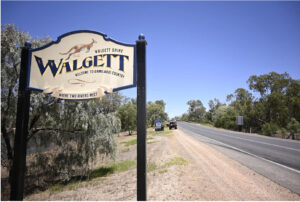
These days, reported Julie, the kids are whooping with glee as they leave. Those who are left sit in empty classrooms with one or two others.
In February 2015 Walgett had a potential high school population of around 350. Yet only 149 students were enrolled in the local high school, according to a census by the NSW Department of Education .

Of those, nearly all are indigenous and nearly 90 per cent come from the poorest homes in NSW.

They rely on groundwater since the nearby rivers ran dry, but as of late it’s been undrinkable and has been compared to the water in underdeveloped countries.
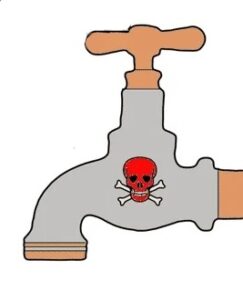
The poor quality of the Great Artesian Basin means locals have been spending up to $50 a week on expensive bottled water, and Coca-Cola and other fizzy drinks are often cheaper to buy.
The sodium level of the bore water has been 15 times higher than recommended for people with chronic health conditions such as hypertension, heart disease or kidney problems. As a result, some families are going to bed hungry and thirsty at night. “I can’t believe we have to live like this in 2023,” says local Vanessa Hickey.

Only two students did the HSC at the high school last year. Attendance averages 50-60 per cent, a Departmental official said, even though eight attendance officers are employed.
Walgett is a Rugby League- crazy town.
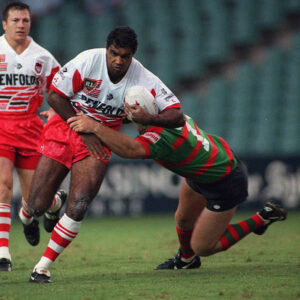
However not even a visit by two rugby league legends was enough to get kids to attend or stick around after roll call.
This all causes instability for students and teachers, and creates gaps in learning that can cause students to zone out.
‘About 100 Walgett students have left to take up indigenous scholarships at private schools around the state and in Queensland,’ said local member Kevin Humphries. Others have been sent away to boarding schools or to stay with relatives in Sydney and regional towns that provide a better and safer education. On nearby farms, generations of non-indigenous farmers have always sent their kids away to boarding school. But now families – black and white- say there is little option. ‘For the life of me, the last thing I want is to send my child away.’
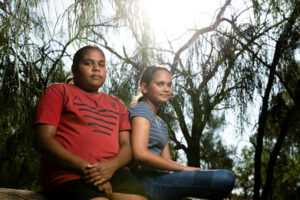
“I’d prefer her to be close to us, than move a long way,” she says.
But this is what the whole scenario at the high school has done,’ says a local mother.
Those who do attend the school regularly move in and out. Department statistics reveal that every year, 75 per cent of the school’s students leave or re-enter, giving it one of the highest mobility rates of any school in the state.
A quick poll finds that anyone who can scrape together the money is sending their children away. Others are planning their escape routes, and scouting out jobs in other areas where the schools are better.
Parents worry about how well equipped their children will be to enter the wide world.
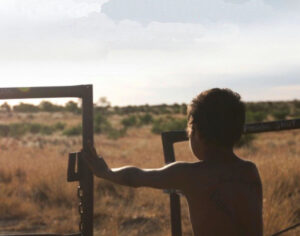
Education Minister Adrian Piccoli said there was no school he cared about more than Walgett.
. He took a Finnish educationist along to the school where he dined with students at the Breakfast Club.
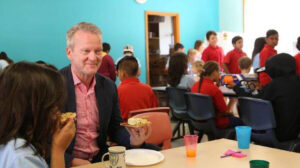
Professor Pasi Sahlberg attributes the Australian students’ slide in the international benchmarks for reading and numeracy to too much time spent on Smartphones, iPads and computer screens.
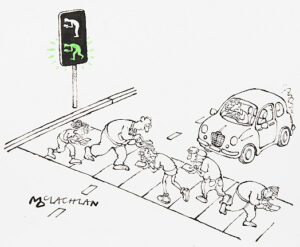
‘Our pedagogy and teaching has not changed, the curriculum has not changed to take account of this,’ he says.
So why not change the pedagogy to take account of these changes so as to integrate digital technology with traditional book based methods of classroom learning?
Professor Sahlberg maintains the value of his home country’s child-focused approach to schooling, with an emphasis on play, a later school starting age (7), and letting each child develop at their own pace.
I had requested the approval of The NSW Department of Education to be able to employ the last of these approaches so as to be able to engage all students. It rejected this resoundingly.
The head of Mr.Piccoli’s department pledged to expand opportunities for children at the school so they have more pastoral care and a greater range of courses to facilitate their ambitions.
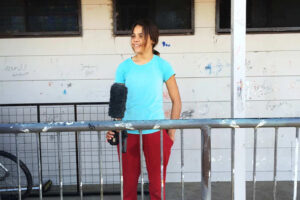
“We as a community have treated Aboriginal people like rubbish, particularly those in remote communities where they are hidden from view,” Mr. Piccoli told Parliament.
He said Walgett Community College’s ruinous buildings made it the worst school in the state.
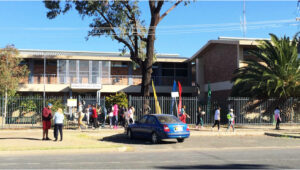
He named Walgett as the “worst school physically I’ve seen”, in an “appalling condition” with “disgusting toilets”, exposed wiring, disconnected downpipes and a hole in the roof that had been unrepaired for about a year.
Most of the school looked derelict.
Mr. Piccoli invited people to “hound him” about the situation at Walgett Community College.
At the same time, his department agreed to provide any family in Walgett temporarily with the isolated children’s allowance. This removed the usual requirements that families have to be more than 56 kilometres from a local school to qualify. Even a family that lives next door to the Walgett High School is now eligible if they choose to send their children to another school. (Aboriginal families have a similar flexibility with Abstudy).
Walgett’s former school captain, Bek Cullen, took another stance. She loves the school, which had indigenous and non-indigenous students when she attended. But she has lost faith in the Department.
Her children go to the Catholic primary school, where not one of last year’s year six class went on to the high .
Despite the problems, she wanted her children to follow in family tradition and go to the same high school that she and her mother attended. She also says her small family construction business can’t afford the $100,000 it would cost a year to send the three children to boarding school.
‘I have never felt more insecure about my school’ she said. As a former teacher at Walgett high, she despaired at how anything can be done before a new principal is appointed.
The high school has had more than a dozen principals in ten years, and the acting principal’s term is limited. The increase in violence spiked in 2015 after the departure of Richard Rule. The veteran teacher was credited with improving results and discipline at the primary and high school.
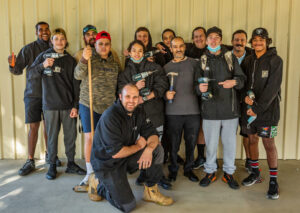
Richard Rule said he would still be in the role if he had been allowed to get on with the job, but he was asked to leave after serving for less than two years.
He says he came under pressure from the school reference group – community members who help make school decisions – to leave.
“[They] were of the belief I was not running the school in the spirit of Connected Communities,” he says. The Connected Communities program was supposed to build bridges between schools and the community, introducing local Aboriginal language programs, and attempting to incorporate Aboriginal content into their curriculum.
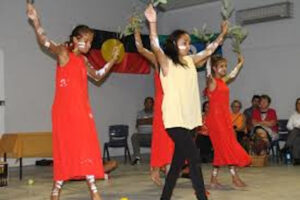
The Department of Education said the role of School Reference Groups lacked clarity, and there was uncertainty – “and in some cases tension” – around their role in decision-making.
“In Walgett’s case, the [“Connected Communities,”] model just didn’t work,’ continued Richard Rule. ‘I wanted a well-run school where children stayed in the classroom and had a teacher in front of them and actually learned something in a stable environment.
“That did not seem to satisfy the reference group, who seemed to want some sort of cultural revolution in their school.

That was never going to happen while the school was unstable, with violence and teachers under threat.”
Many in Walgett support the “Connected Communities,” concept in theory, but say it’s not working, because local solutions are not being implemented and only a select few residents are listened to by the government.
“Instead of the government just taking notice of one or two people, they should sit down and take notice of the community of Walgett,” Walgett Working Party chairperson, proud grandfather Garry Trindall said.

“Not the black community, not the white community — a whole-of-community, holistic approach.

“Too many people outside are interfering. We need to get back to the old P&C format, get the parents and teachers together again.”
The Dharriwaa Elders lay the blame for continued dysfunction with the NSW Department of Education, which “continues to fail to provide what’s needed for Walgett students to succeed at school,” they said in a statement published on their website after the Sydney Morning Herald requested an interview.
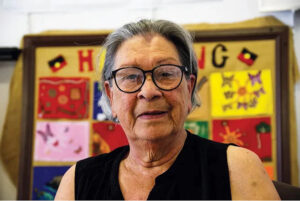
They said they are being denied figures on suspension by Aboriginality, which, they say, means NSW Education wants to hide the link between school suspensions and a lack of support for disability and trauma. They insist this has to stop.
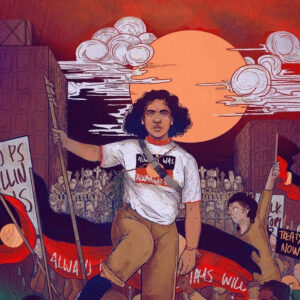
They want the school to stop calling police “as their first response to behaviour incidents”, and say officers should be banned from bringing guns onto the school site. “Recently there was an escalation when five police cars attended the high school to arrest a young teenage girl,” their statement says. “ Walgett school leadership must train their staff to de-escalate behaviours in our young people and decommission their hotline to police. The criminalising of our young people when they aren’t well has to stop.
We conclude that Walgett schools are not culturally or physically safe.”
Towards amending this a number of smoking ceremonies have been held. During these the smoke from burning native plants cleanses the area, wards off bad spirits from the people and the land to bring about greater success.

Mr. Piccoli acknowledged the conflicting expectations of school staff and the community. “When incidents occur at school, and the school takes the disciplinary action it would take at any other school, sometimes the community doesn’t respond well to that,” he says. “Walgett is a very unique place. So it has to be a unique school.
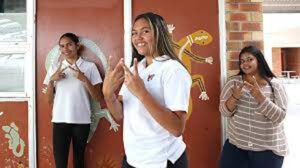
For example, having police – the community didn’t like that. They don’t want it to be seen as a justice precinct. It’s got to be an education precinct. And they’re right, but you have to be able to guarantee staff safety as well.”
Mr Rule, who has more than 40 years’ experience in some of the state’s most challenging schools, was hand-picked by the Government and coaxed out of retirement. However, he said ‘Mr Piccoli was “probably the only person above me who was genuinely supportive of what we were trying to do there”.
“We started to establish some sort of trust and relationship because one of the first things that children ask you is how long are you going to be there, because they’re used to a revolving door of teachers,” Mr Rule said.
He said he was speaking out “on behalf of the staff who go there every day to work so hard with these children to improve their literacy and numeracy and to give them some sort of start with their life”.
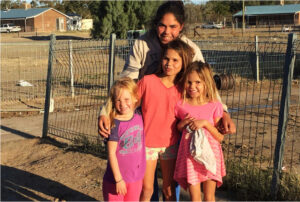
“I feel that people need to know that they do a wonderful job under very, very challenging circumstances and with very little tangible support from their employers.”
One former student says “Kids go around fighting others over nothing. If you don’t hang out with them, you are their enemy.” And it is not only students who are assaulted, teachers have been, too. Former principals and teachers say verbal assault and threats are routine.
“I can tell you that there are lot of teachers that are frightened,” she said. “There are young boys that tell young female teachers that they are literally going to f–k them. To be a young girl and sit and listen to a teacher spoken to by a boy in their class, and be powerless …”
Felicity Forbes would say said she had never experienced a panic attack in her life before she started high school, but that changed within her first week at the college. Looking back on that time she said, “It was terrifying as an 11-year-old to be seeing those kinds of things.
“A student grabbed a stick and smashed through glass to get to another student.”
“There was a lockdown, everyone was stationed up against the wall,” she said.
“During a lockdown there’s constant beeping.
“Students are told to pull blinds down, lock doors and have no interaction with anyone outside. That would usually be it for the day.”
Felicity says hearing an alarm tone or the sound of something smashing can trigger a panic attack — and that she is struggling to catch up with the curriculum.
“It definitely impacted my education,” she said while comforted by her mother Rebecca Trindall.
Police were even called to the school during a visit by two of the state’s most senior education directors after two teenage boys were allegedly involved in a fight.
Prison style lockdowns have been imposed.
One document sent to the Local Member and Premier about the “tragic failure” of Walgett Community College described the school as a “political time bomb”.
To put things in perspective the problem of bullying is, as Federal Minister of Education Clare points out, ‘a big challenge’ all around the world’. It’s just that the social and economic circumstances in Walgett are that more severe.
As for busing the students elsewhere Superintendent Greg Moore was among those concerned it could be a backward step for the town.
He said he recognised community frustration about the school, but urged residents to be patient.
“I think often things come up that are a bit of a distraction on the positive work being done and moving forwards,” Supt. Moore said.
He was involved in drafting a youth action plan for the town in a bid to reduce high numbers of youth becoming caught up in the justice system.
On an average day, two police officers have operated at a centre that had been erected next to the school hall.
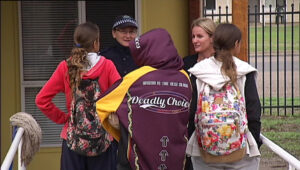
Education Minister Adrian Piccoli said Walgett is a “tough school and it’s got a chequered history”.
“We want police to be across what’s happening obviously outside, but also inside the school,” he said.
As a gesture of understanding and to allow the spirit to move them, the police hold smoking ceremonies back at their Walgett station.
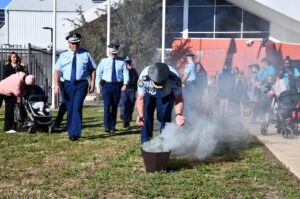
“They’re not there as a display of authority, they’re there to engage with students at the school,” says Mr. Piccoli.
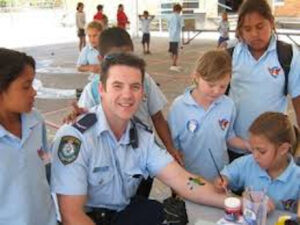
What we’ll see is police in the classroom sometimes dealing with kids not necessarily in a negative way, but bringing them into the hall, playing sport. Just engagement strategies.
The Opposition’s education spokeswoman, Linda Burney, criticised the introduction of officers to the classrooms and playground.
“To have the police on site the whole time is going to be counter-productive, it will be seen as a punitive exercise,” she said.
The children are smart enough to know that doesn’t happen to kids in other schools.
Walgett Community College school captain Melissa Haley said: “I always wonder what they [the police] are up to. Is anyone in trouble today?”
However, Acting Superintendant Tony Mureau said the early signs were encouraging.
“Over the past month there’ve been no incidents,” he said.
He described the role of police as “hands on with the kids, building self-esteem and confidence, getting them active, taking their minds off the troubles that were here earlier on”
“What we’ll see is police in the classroom sometimes dealing with kids not necessarily in a negative way, but bringing them into the hall, playing sport. Just engagement strategies.”
One can ask,’ Isn’t that the role of teachers?
It’s important for the police like everyone in the community to be aware of the children in their midst so as to watch out for them. However this has to be kept low profile and handled with special sensitivity in light of our history.
The “Irish Model” of policing from its origins in suppressing dissent in the Irish colony in the 19th century, disregarded consensus and set the police against the community. Attitudes of the police towards First Nations people were deeply influenced by contemporary beliefs that they were inferior to whites, and a priori criminal.
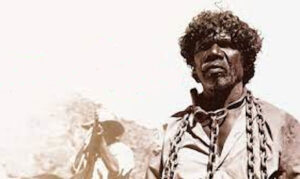
In the past police had specific powers that allowed them to remove Aboriginal children from their families under “child welfare” legislation.
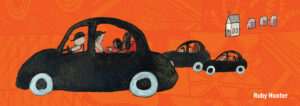
First Nations Peoples continue to be among the most incarcerated peoples in the world.
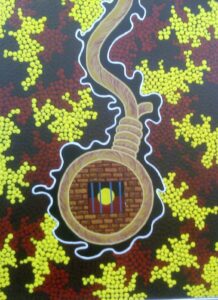
If you’re an indigenous Australian today, you’re more likely to go to jail than to go to university.
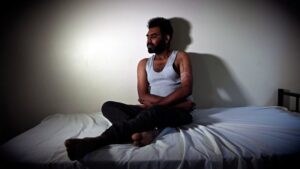
Police in Walgett have also run anger management courses for the students, called “Scream” for girls and “Rage” for boys.
Vanessa Hickey knows what it’s like to both scream and rage. Her 17-year-old cousin, Thomas J Hickey, who divided his time between Walgett and the city died in a police chase in Sydney.
Young TJ died after he catapulted from his bicycle and was impaled on a metal fence.
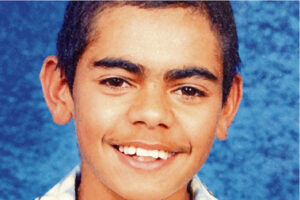
Vanessa feels that the conditions Thomas grew up in, and the lack of support from authorities, had set him on the path to tragedy.
“Some of our children go to school and don’t receive their year 10 certificate, but receive a criminal record,” Ms Hickey said.
“No-one in the education department cares — they’ve been failing our children for decades now.
“Don’t they care? Generations after generations.”
As for Mr. Piccoli’s remarks about the Walgett’s school status, Vanessa draws attention to a newspaper headline from 1968.
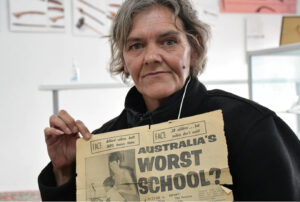
Of course there are no ‘worst’ schools just as there are no ‘best.’ There are just schools in prosperous areas with academically minded children and challenging schools in poorer areas which don’t offer children a choice of subjects that interest them.
In the case of Walgett College, Mr Piccoli said “most of these issues come from outside the school and when they come to school that’s when the violence breaks out”.
All the more reason to free up the police to deal with those issues outside the school.
What prompted the outbreak of violence at the school?
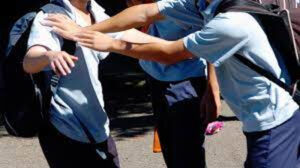
Departmental official Ms. Bruniges said it is a mix of disengaged youth, turnover among staff at the school and community problems. Some blame the local Aboriginal Education Advisory Committee for undermining school discipline. It, in turn, suggests the school’s teachers opt for discipline over understanding and don’t understand Aboriginal culture .

The conventional school structure was failing indigenous children, according to aboriginal spokesperson. Anne Dennis.
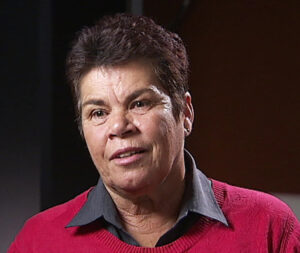
“Education is critical for our students. Without an education it’s that intergenerational trauma and, really, history repeating itself,” she said.
Ms. Dennis wrote to NSW Education Minister Adrian Piccoli claiming Mr Rule had repeatedly ignored opportunities to “consult, collaborate or provide feedback”.
Mr. Rule denied this claim.
Others say the Aboriginal community is splintered, with the remnants of former sovereign nations living side by side, a legacy of when language groups were forced to live in the local Gingie mission , now aboriginal land.
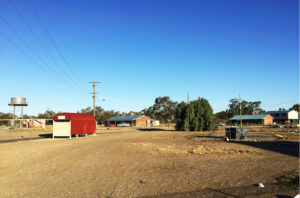
In 2015 Ms. Bruniges announced that for the first time ever, the Department would use an executive head hunter to recruit a new executive principal at the high school and a new primary principal.
Her top priority was looking at ways to re-engage students who wanted to learn and provide other options to those students who didn’t.’
From my perspective and experience all children want to learn something. Some just don’t want to learn in an academic format.
A big challenge in a town like Walgett is what to do with those students who are expelled.
Most end up without any educational or vocational prospects, hanging out on the streets.
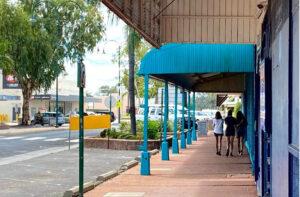
Like other young people from this huge area, some hit the road heading to Sydney.
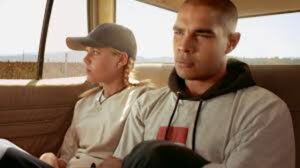
Unemployment numbers in the north-west of NSW spiked from 2.5 per cent in December 2018 to 9.5 per cent in December 2020.
Walgett essentially serves as a transport centre for the surrounding district’s agricultural produce. The regional economy is based on wheat production, as well as cattle and sheep farming. Farming in the Walgett region, as for the Australian agricultural sector as a whole, is increasingly dominated by large agribusinesses.
The up and coming generation can only scan their Country and wonder when they’re going to get that land back.
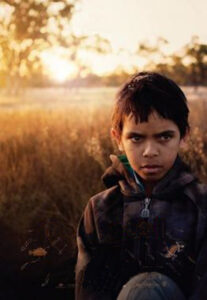
Even for those Aborigines who are lucky enough to find employment, it is predominantly at low pay.
Walgett has rates of non-domestic violence at double the state average and methamphetamine use is rampant in the area.
Ms Bruniges said she planned to introduce a new charter of expectations that set out clear and high expectations for students, parents, teachers and the community. It would also spell out what sort of behaviour was unacceptable and the consequences.
‘Having a set of expectations that everyone is clear on, students, staff and community is critically important,’ she told Fairfax Media. ‘It isn’t clear at this point. And we need to apply that set of expectations consistently. So, everyone has the same message: If you come to school, it is a place of learning, it is not a gathering place.’
While the locals regard the school as a community centre, the Department sees it as government property.
The Department never considered the fact that they had some students where you’d think they wanted them. It blew the opportunity, failing to take action.
Why can’t the Department take advantage of the school being a gathering place, thus doing away with the need for attendance officers and replace them if need be with at least fly in, fly out motivated teachers who could instil and maintain a love of learning in the gathered children. It could select some from its blacklist of teachers.
And what happened to those leading teachers the Minister’s party boasted about? Can’t teachers like Richard Rule become the rule? How many years does it take for government to allow learning options for those young people who reject academic curricula.
The education authorities can’t seem to see beyond the end of their noses-or see what’s under them.
For many Aboriginal elders, the fear is that those children who leave will be lost to their communities forever, and those who stay in the school have little ambition or hope.
Many senior indigenous educators say the Minister and the Department are evading the need for review of the ‘Connected Communities’ program in the town, which runs in 15 schools in the region and aims to give Aboriginal communities a bigger voice in running the schools.
Bob Morgan is chair of Aboriginal and Torres Strait Islander education at Newcastle University.

He says, ‘I know the school can be turned around–if people stop playing politics, and listen to other voices outside the Walgett school.
From Cuba with Love.
Not so different were the conditions that would confront a literacy team from Cuba, a country with one of the highest literacy rates in the world, when it brought it’s ‘Yes I Can’ campaign to other aboriginal communities in N.S.W. Aboriginal residents of Wilcannia, Bourke and Enngonia have been mobilised to go to classes through a ‘mass campaign’ approach pioneered in the early years of the Cuban revolution. Jack Beetson, who once ran Sydney’s Tranby Aboriginal College, says ‘Literacy is a human right that traditional education has failed to deliver to these people. It’s a huge step for most of them to even come to class,” he says. Beetson, 57, a Ngemba man from Nyngan, remembers that in parts of western NSW, Aborigines were excluded from mainstream schools until the 1970s and then only got in if the local Parents & Citizens Association approved. ‘When I went to school, I was in the D class for all the blackfellas and poor white kids. I wanted to study history but was told, ‘That’s not for you, son.’
A team adviser Lucy Nuñez, an exuberant 54-year-old grandmother from Havana, who would work among Maoris in rural New Zealand, was unprepared for the social disintegration she’d encounter. ‘I learnt about how Aboriginal people suffered from colonisation, how they have been separated from their families, moved out of towns and put on reserves. Their communities are broken, they have addictions and no jobs. Life is very hard,’ she says. Lucy believes her skin colour and a shared experience of colonisation helped her win the trust of sceptical communities. ‘They say, ‘You are black, we think the same’. They tell me black people think with their hearts and white people think with their brains. I tell them if you want respect you have to increase your knowledge.’
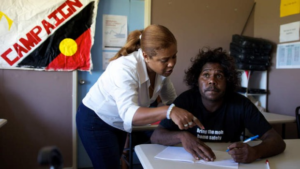
Jack Beetson believes the Cuban approach to learning can work where traditional education has failed many Aboriginal populations, because it makes illiteracy the responsibility of an entire community rather than an individual problem. ‘We aim to build a community culture that values and supports learning,’ he says.
“You have to build trust and respect before you can do anything with our people. The Cuban program has done that,” says Lillian Lucas, who co-ordinates the Bourke arm of the scheme. Some of its 27 graduates live at Alice Edwards Village, where Lucas grew up, a squalid former reserve on the Darling River outside the town levee. “There is a lot of negativity here, our community is broken,’ says Ms. Lucas, 37, as she drives around the village with its decaying dwellings and overgrown yards studded with wrecked vehicles. ‘But we are getting results with kids who have come out of high school but can’t read and write.’
The literacy classes are based on a set of 64 one-hour lessons on DVD. Each lesson shows a class of non-literate learners – played by English-speaking actors from Grenada – being taught by an experienced teacher. Class facilitators help students do oral and written exercises being modelled on screen. Words and phrases are broken down into component sounds and letters and then re-assembled. Each letter is associated with a number, on the assumption that most people of low literacy have some familiarity with numbers.
Associate Professor Bob Boughton, an adult education expert at the University of New England, which would help manage the literacy campaign, says students tend to identify with the black Grenadian actors and gain confidence from knowing their own community is part of a global campaign.
Dr.Boughton would advise the East Timor government when Cuba developed and ran a literacy campaign in the newly independent nation. ‘Over 120,000 adult Timorese gained basic literacy within four years from 2007 to 2011, in conditions of extreme poverty and despite political upheaval,” he says.
The final phase Three of ‘Yes I Can’ is a range of post-literacy activities that include computing, healthy cooking from recipes, art and reading to children. These are designed to consolidate learning and build pathways into jobs, further education and participation by the community.
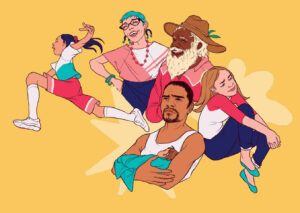
How I would have loved to share my work in tandem with such a team.
The authorities either don’t want to or can’t raise the level of literacy amongst such people in in N.S.W. government schools, and won’t allow anyone who wants to, someone who doesn’t need to be a genius but well-rounded with empathy. This was the area where I wanted to solidify my practice, to stamp my authority, helping wise up the populace, not dumbing them down. Promoting the advancement of all, not keeping many in their place. My be all and end all. The longed-for alchemy of education, all that dull base metal glinting into gold. I had no out. In this for the long haul, deeply invested in this my country, I wasn’t going anywhere. I’ve always called Australia home. If I couldn’t make it here , I couldn’t make it anywhere. At this time of my life I had a crystal-clear vision of where I wanted to head. I had the credentials and was hardwired for this – and nothing else. I wasn’t the best at what I did, I was the only one that did what I did. A one-trick pony, but a very valuable trick, specialised in teaching nothing but everything. The works. Going it alone, forever blowing bubbles, aiming to snatch victory from the jaws of defeat, and to confound all sneering expectations, I launched my education consultancy. I set out its far reaching scope and my modus operandi in my brochure. It is a resources based inclusivist approach to education in NSW. It offers families access to a professional service providing systematic and imaginative education material. The eye catching and thought provoking material covers knowledge essential for daily life in NSW. It enables total immersion in its language and culture. Filling in the gaps in the system, not an alternative but a complement to it. It fosters a sense of belonging, cutting across the social divisiveness engendered by the educational conservatives. It is geared to providing a key to lifelong learning. It shows concretely what teachers in the public sphere are capable of producing. It avoids information overload. In the encyclopaedic material the text is minimal. Knowledge is broken down into its component units and is presented in the form of these self-contained abecedarian units which are illustrated. The student can arrange these as desired to build on a structure of knowledge, satisfying inside out both his or her interests, and falling within the context of the New South Wales syllabus, an all embracing one despite conservative attempts to limit it. Everything is linked and teacher intervention is minimal. This way the student cannot but learn.
Each unit of knowledge forms part of an emerging jigsaw puzzle, producing an increasingly more complete picture of the state in which we live and the world beyond.
The reading and writing material is based on black and white comic book material which is edited. Recruiting the talents of the leading writers from MAD magazine, I set about doctoring the captions and illustrations. I liquid papered out the text and drawings to create stories that preserve the best of the originals, doing away with the silliness, vulgarity and stereotypes that spoil them. This is determined by the dictates of the market more than any shortcomings of the artist. I have done so on the understanding that these cultural works, used for educational purposes, will have the respect of the artists and will earn a wider appreciation for their talents.
In the finished product the aim is to have the text coincide with the images. Both text and images are imposed with putty-like pressure sensitive adhesive on A4 sheets, enclosed in plastic sheet protectors and stored in jumbo binders. This allows shuffling text and images around, interpolating new material and continuous editing. It very durable. The contents I introduced at the beginning of this operation blend in perfectly with those most recent. The more the material is used the more firmly the contents remain attached.
It is universal in appeal. It takes into account the cultural shift towards the moving image over the written work and aims to keep them in balance. It bridges the gap between what is onshelf
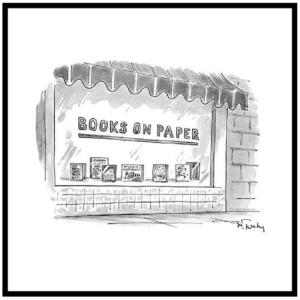
and what is online. One technology doesn’t replace another, it complements.
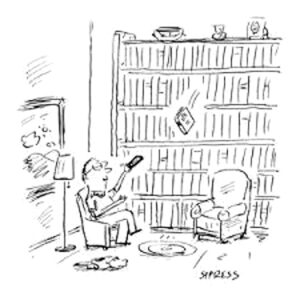
Books are no more threatened by Kindle than stairs by elevators.
A Picture Tells a Thousand Words
“The teachers explode a pyrotechnic in the sky and all for a moment you can see the landscape, where you come from, where you could go, whereas the kings and presidents shine a torch and say here is the path you must follow. So my starting point is knowledge frees you.”
Tony Benn.
Sister: Alice…! Will you kindly pay attention to your history lesson? Alice: I’m sorry, but how can one possibly pay attention to a book with no pictures in it? Sister: My dear child, there are a great many good books in this world without pictures. Alice: In this world perhaps. But in my world, the books would be nothing but pictures. Sister: Your world? Huh, what nonsense. Now… Alice in Wonderland.
Grabbing the eyes the visually dazzling images from my bank bewitch and motivate you to sit up, take notice and read about them. Outside our schools children are bombarded with images from everything under and around the sun, but inside the school they are largely fed on a diet of words which only the academically minded children – such as I once was – gravitate to.
The first things many are drawn to in the stodgy, insipid dross issued are the moustaches, devils’ horns and genitals scribbled by other children and that’s often as much as they look at. Things haven’t changed much since the young Sam Beckett, bored stiff in his science lessons, doodled lewd caricatures of his teacher under his desk, colouring outside the lines.
The coalition’s refusal to open up public schools to visual education, it’s preference for private schools seems to be guided by the motto, ‘Education is show business. No business, no show.’
John Lennon pointed out that 80% of people who read magazines don’t read at all. They just flip through and look at the pictures. They can get a story upfront looking at three or four pictures. Then if they like the pictures they might get in deeper and find out more. The image comes first. It’s the first thing people see. It’s immediacy will never leave us.
Everything in the universe as we know it has been photographed, drawn or painted. All children should be encouraged to study it in its full complexity, beauty and wonder, to be able to discern the consumerist propaganda about how we should live and what we should look like. Children should always have an explanation available for what they see, be guided, and be able to write about or illustrate what they see. Children who are not academically minded can proceed intellectually by leaps and bounds through harnessing of their visual acuity. Teachers must be able to boost and refine their pictorial vocabulary. This way they can’t but read extensively with enjoyment.
It Seemed a Good Idea at the Time
“Though this be madness, yet there is method in it.”[Hamlet (2:2) ]
Me and my big ideas went along with the encouragement by the Minister for Education for teachers to set up their own business, seeing I didn’t have much choice in this bread and butter matter. I had to fulfil my burning ambition but had to feed my family. We preferred a roof over our head to the prospect of being out in the rain and cold. It was all or nothing. Having been put on the spot I had to look on the detours the eugenists set up as an opportunity, the kind that don’t knock twice. I had to look on surmounting them as assisting my comeback even if I hadn’t actually gotten anywhere. If the edcons were bent on pushing society backwards, I would make it my business to live out my days helping pull it forwards. In for a penny, in for a pound. At least I would give them a run for their money. If I had the will, surely the means would present themselves. I was still young and sure to have my way. My skin was fully in the game. Surely If I had been able to profit from skinning dead sheep, I could skin this mangy old fat cat another way-to wit through my latent powers of persuasion. Be it skinning or belling, there was nothing to it but to do it. To play to my strengths. It seemed right up my alley. Going it alone while the getting was good, I was presented with the chance to do a very special thing, unique to me, fitted to my talents and going beyond what was expected. I had gone wide, now I was taking the plunge and going deep.
After much brainstorming, soul-searching and calculating the risks, everything riding on it, time getting away from me, I accordingly reached a fateful and consequential fork in the road. My one man band would raise the wind for my free peripatetic service by selling my policy to businesses and travellers to Australia, cold-calling, and cashing in on the current tourist windfall. I did it it on spec, as a gamble, without having definite buyers or customers but with the hope or expectation of finding them as I went. I did it without the certainty of getting the financial return I wanted. It meant the occasional outings that I used to be treated to such as the annual picnic would be lesser events.
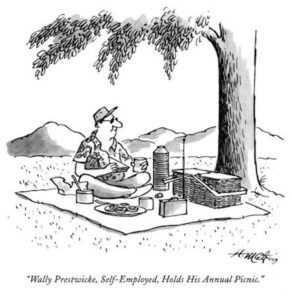
Also it meant that I’d be more tied down to working in N.S.W.
The upside was that eventually the lone hand would be snapped up, showered with handsome offers, able to name my own price. It was in the bag I believed. My gamble would pay off and the family would be well fixed, in a position to take some trips. Getting my sure-fire failsafe show underway on the bright side of the road, I distributed my fliers in hotels and the airport, moving between these and my peninsular Parnassus to establish my clientele and explain the service. What you see is what you get. Moreover you get what you see. The work is the entity.
I saw myself as a dark horse, the unknown, out of nowhere contender, who coming quietly from behind, back on track, is catapulted to unexpected success despite great odds, in the fullness of time an overnight sensation, going viral with popular recognition, honours coming thick, the seas parting for me. The triumph of mind over matter. My reputation would speak for itself.
Once I’d established my profile I wanted to be seen as a man of distinction – indispensable, not disposable. The toast of the town, the entire community buzzing that a new, important educational voice had risen.
With the commanding voice of great authority, deeply pitched and clarion clear. Coming into my own as someone who knows what he says and what he does. A guru if you will with students crammed into my office or gathered at my feet on the floor spreading acclamation on hearing me take on all comers: ‘Come, come to me. Do you wish to learn? But don’t mess with this household god or he’ll turn you to stone’.
My motive was to use my outreach service for political leverage-in one fell swoop to act as a quiet catalyst, to gain acknowledgement, to create hey presto a cause celebre, a groundswell in which the public demand a shake-up, a full court press for the right of freedom of speech for teachers and students in which the humane treatment of children would gain traction. It was to reach out to those living a life with low literacy in a world that assumes that they don’t exist. Into the bargain I aimed to set the pace, outdo myself, jump the line, sway opinion, raise the educational bar, further the achievement of literacy across the board, capture and shape the identity of this society, and help curb some of the senseless violence that plagues this effluent society. This well kept secret, worked to act as a trendsetting touchstone, a reference point against which the work of teachers inside the system could be calibrated.
How the best teachers in the system are chosen is a state secret[169] according to one retired principal.
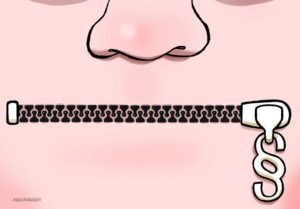
In choosing those teachers best able to teach gifted and talented students, the Department says the process involves ‘a complex analysis of students at differing levels of performance; it is not a simple aggregation, and cannot be conveyed simply without degrading its value and accuracy.’
If I, to whom a message of unsatisfactoriness could be conveyed so simply, was among the’ worst’, according to the edcons, working with less ‘gifted’ children in a classroom whose mystery I had no right to clarify, it would be easy for parents to judge who were the ‘best’. And to conclude that all teachers are valuable and worthy of better status.
Making any progress towards getting due process with respect to my treatment in this kafkaesque system was like bashing my head against a wall. How do you get through to those determined not to listen? How to shame those who are shameless? Such brass fronted effrontery. Nowhere left officially to turn I couldn’t waste any more breath on the matter. The political and social boundaries had placed decisive limits on the application of “rationality” to any official response. Peddlers of just one more economic activity, these officials were unable to transcend the policy limits that the ruling elite imposed. I had failed to reinforce what they wished to hear. I had not reconfirmed the power structure’s interests and predetermined policies.
Hi-ho Silver, and away. Sustained by the knowledge that if you can offer something one up on the edcons, people will demand it, I threw myself into my grand design, body and soul, my one-track mind blocking out most everything else. From the start of the process I was relentless, unsparing, obsessive, compulsive and even possessed in my efforts. The files in my head, I took them to bed, I was never ever through. Looking for a way in, pushing through, eating, sleeping and breathing this magnificent obsession. Knowing not exactly where it would end, but that from little things, big things grow. And my, did it grow. With a long gestation period it grew like Topsy, freed of its turvy.
Spreading the Word.
‘He travels fastest who travels alone.’ Rudyard Kipling The Between the Lines Education Consultancy.
In order to arouse interest in my service and generate a going concern, I advertised by disseminating flyers with my mission statement and a brochure describing my methodology. In size a third of an A4 sheet of paper apiece, they slotted neatly into the uniform leaflet compartments of hotels. The text of the brochure outlining my methodology [See below] was set out across the width of the sheet and folded into illustrated panels spaced such that each treats a discrete aspect of my work. Commission paid for my policy funded a practice based on these principles.
With the aim of conciseness and clarity, the flyer runs as follows:
Mission Statement: To further the vision of the founding father of Australian Federation. This was that all children, regardless of religion or social status “sit side by side”[170] in free, compulsory and secular schools.
The Education Act (NSW) underpins public schools with these principles.
Henry Parkes’ vision was of “a new society based on equality, fairness and justice for ordinary people”. A first rate, universally accessible public education system is fundamental to this dream. “It has the potential to give equal opportunity to all. If life’s chances are seen as fair and open, there is hope. Without hope, anger and violence breed from despair”[171].
The aim of the Between the Lines Education Consultancy is to keep this vision alive. It identifies those elements that cloud this vision.
Commission paid for its policy funds a practice based on these principles. It provides all members of the family the means to enjoy studying about this country, its language and its culture.
The text of the brochure was set out across the width of the sheet and folded into illustrated panels spaced such that each treats a discrete aspect of my work.
The ‘Between the Lines’ Education Consultancy assists you to :
- Improve your research skills rapidly
- Observe and identify surrounding phenomena
- Read and write thereof
- Work at your own pace with programmed assignment material
- Gain access to the best popular encyclopaedic material about all areas of knowledge
- Store the knowledge you garner for later reference
- Build on a structure of knowledge
To guide your research, you are posed a number of questions and problems. You are told where to look (location) for things (phenomena), and what area of knowledge (category) these fall into. The areas of knowledge are indicated by capital letters in the statement:
“in nature MATTER is formed from changes in ENERGY. In society PEOPLE form IDEAS about these things. Through WORK they change things. They make things both TECHNICAL and CULTURAL. These things all change over TIME”.
Arrangment of Knowledge.
- Knowledge is broken down into its constituent parts and presented in the form of self-contained units.
- The phenomena are arranged alphabetically and cross-referenced. In order to get more information, you are told how to go from one unit to another. It makes it easy to start anywhere with a minimum knowledge of specialized terms.
- The names of things are entered first. Then comes what we know about them. You may, for example, want to explain the formation which four congruent right triangles make when they line their sides up. You are told to look in “knowledge” for “triangle, congruent, right”. Background information can be found by looking up “Triangle, Angle” etc.
- As far as possible, both words and images to do with things coincide.
- Maps are arranged alphabetically and show where things can be or could have been seen.
- To find out more how English works, you encounter it through language situations of your choice or through studying the forms and structures of language. It is not necessary to know the terms for these forms and structures. For example, to find information on “the articles” you could look up a, the, zero article or articles, or for information on conditionals you could look up conditionals, if or You could look up the ending –ed to find information on the past tense and the past participle.
- If your English is at an early stage it is suggested that you begin by reading the entries for sentence and clause and the entries for word classes (parts of speech): noun, verb, adjective, preposition, conjunction, pronoun, determiner.
- An inventory of items of knowledge covered by the student is made available.
- Fictionalised images are distinguished from actual ones. They appear against a coloured background.
The Between the Lines Education Consultancy offers you a systematic listing of things about New South Wales and the Australian Capital Territory.
- The kinds of people, what they have made, and their gathering places.
- Animals, plants and natural features.
- It covers what has gone on this area and what is going on now. It gives a good insight into this area of Australia.It gives a good overview.
Vignettes. The Consultancy offers you a series of character sketches, descriptions and short stories-vignettes-which you can read and write about if you want to sharpen your language skills.There are three kinds of vignettes from which to choose:
- ‘Staying Alive.’ A series of adventures in which characters confront death defying situations.
- ‘Routine Matters.’ A series of events in everyday life.
- ‘Full House.’ A celebration of life.
You are provided with model answers with which to compare your own. Discrepancies which arise lead to self-diagnosis. The Consultant
- Studied in all areas of NSW Universities.
His university described his post-graduate study as a ‘pioneering work in a very difficult area.’
- Was awarded the Teacher’s Certificate by the NSW Department of Education.
- Worked in all areas of NSW public schools.
- The heads described his practice as follows:
- “prepares his material well. Works extensively with specially prepared sheets”
- “is conscientious in assisting students”
- “is respectful in assisting students”
- “is sympathetic to students”
- “has interacted well with students and staff”
- “has presented himself as punctual, reliable and cooperative”
- “has a definite commitment to teaching”
Client Comments.
The general public expressed great appreciation of my work, as attested to in client statements. These are available for inspection on request.
Like everyone who read my ideas and saw my rare and exceptional material, Professor Harry Messel found it interesting. I managed to rope him in for comment. Baby boomers will all remember the “Blue Book” – the high school science bible of the 60s and 70s. Harry, was determined to inspire young people to love science. Arriving in Sydney from Canada, he discovered there wasn’t a girls school in the city that offered physics. Unpersuaded by the tired excuse that ”girls don’t like physics”, he battled for the country’s first compulsory, integrated science syllabus to be introduced in 1963, which also gave many boys the opportunity to study biology for the first time.
‘As a keen photographer I can see the quality of your material. It must have taken an enormous amount of work to prepare. What is the purpose behind your campaign?’ he asked.
‘To make learning easier for children and involve them in the learning process.’
‘You know all knowledge comes from the sweat of your brow. People think everything is supposed to be easy. You have to make things easy for the children, poor kids, how could you make things difficult for them. You can’t spoon feed children. They have to take the crookeds with the straights. You have to make things difficult for them and put some fibre up their back.’
‘Quite so. You know there is a problem with the education system when you realize that out of the 3 R’s only one begins with an R. But I’m talking about the boy and girls in the street, who don’t go to school much. They’ve never been challenged intellectually. I make it easy for them to begin with. To get them hooked. Then the schools can reel them in and get them going. How was your schooling, Professor?’’
‘To me, learning was beautiful, learning was exciting, it made me feel good and I felt I could conquer the world. I read every book in the library. I’d read three books in one day. I hated holidays, because it meant I had to give a learning a rest.’
‘My aim is for all children to share this enjoyment. Some might say that this is to raise nerds .That children need to get out more in the open’.
‘Never let it be said I’m a geek. I spent my childhood years in Canada running. I never walked, I ran. I ran all the time from the time I got up to the time I turned flukes at night. I ran continuously. And the Indians used to do the same.’
The Indians?’
‘The Sioux. We were thick as thieves. I learnt to speak their language when I was a youngster there and they became lifelong friends until the deaths of some of them. They were very gentle people, very knowledgeable, they had great understanding of nature which they passed on to me.’
He chose to look at my sections on crocodiles-he is a leading authority on these-and on the countryside.
‘I used to water-ski there on the Hawkesbury. I water-skied for 45 years and taught dozens of kids. I’ve been fishing and hunting since I was 5.’
‘Well there you are, what restless child wouldn’t be interested in these things?’
“What hyperactive child like me!’ he laughed. ‘I’m having fun, keeping moving. I don’t know how I ever had time to work,” he said, stopping to quickly write his comment.
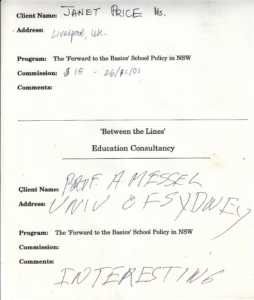
The Hard Yards.
Emancipate yourselves from mental slavery; None but ourselves can free our mind.
Bob Marley.
Underestimating the extent of the vast wealth of raw material going begging, and of my body’s capacity to process it, I nevertheless kept it on a tight rein, guarding against it’s potential to become unwieldy. Once I had the idea in my mind I was relentless in pursuing it, giving it everything I had. Fully accepting my parental responsibilities I was chief cook and bottle-washer in the house. As long as I was shopping and rustling up, pinching the pennies, covering my share of the bills, placing a high value on constancy, we made out and things hummed along, falling perkily into place. You could set your clock by me. Scheduled, routine comings and goings, appointments and meetings, arrivals and departures, day-to-day hassles and joys, within a structured workaday life. Through the good and lean years, the in-between years, on the trot, walking the talk, riding on the merry-go-round, treading water, touching wood, tied up with things. By force of habit I had it down real tight. At the end of every month, we ran the numbers, making critical trade-off decisions, determining whether we’d get the roof fixed or pay the council rates or keep the electricity on. Staying financially afloat, one step ahead of utility disconnection and going under the hammer, we kept on top of things, the day to day stuff done, the homefires burning, the books finely balanced, the household squeaking by, ticking over like clockwork.
Scheduled down to the minute, down to a fine art, the boys were fed, schooled ,socialized, taken to soccer, kept within our peripheral vision. I guarded them with my life leaving nothing to chance. Every breath they took, every move they made, every step they took, every game they played. I was watching them. With children today you cannot blink. Not once, not ever.
They were settled in the comforting rituals of family life, while I , spurred on by public approval– documented in well received client details– nurtured my picture-perfect brainchild. Reading me by my books which spoke for themselves, strangers were sold, trusting my motives and agenda at a glance. Seeing is believing. One look was all it took.
Some said I was the kind of teacher they wish they had had at school.
One of my clients, an aboriginal father, had become entangled in the court system with heavy fines for un-licenced driving that would take years to pay off.
He hadn’t been driving for fun. His outback town had a pub, police station and primary school, but no supermarket, doctor, bank or employment office. The nearest was some distance away with infrequent public transport. There were never enough seats and the bus wouldn’t take small children like his. Hence his taking to the steering wheel. ‘It would be easier for me to get a driving licence if I could read the questions asked and answer them properly.’
One client who remains etched in my mind jibbed at filling out his details: ‘I can’t think of anything to say.’
‘Just write your name if nothing else.’
I guessed straight away by his hesitation he was illiterate. I had to sweet talk him into doing it. He was pushing it to manage a reasonable facsimile of his name. He had somehow been able to get through life, so far, without learning how to read and write. He even had problems with sight words.
‘I’ve given myself away, haven’t I.’
‘There’s nothing to be ashamed of. It’s not as though you rob banks, ‘I said, ‘or own one.’
‘True, but I can’t even open an account in one. I keep my money under my mattress. I’m afraid of going into shops because I can’t understand what the labels are. I’m worried I’ll get the wrong thing and end up poisoning someone. I have difficulty reading simple things like washing instructions and TV manuals. I have an inferiority complex about my lack of formal education. I can’t apply for jobs, you know, and show any qualifications. I left school at 13 and I’ve nothing to show. I can’t even drive a taxi, you know. I can drive like Jack Brabham but only in the scrub. I can’t pass the theory to get a licence. It takes me half a day to get through one section the road regulations and I still don’t have any idea what it’s about. Know why it takes me so long to fill in the application form? Because I can’t spell. The Roads and Traffic Authority say it’s too dangerous I can’t read street and road signs. I get lost on foot. I can’t take buses as I don’t know where they’re going. I end up taking lots of taxis. I get flustered taking trains. Sometimes I’ll end up on a platform and have no idea where I am. I have to stop people and ask them where I’m at and the way to go further. ’
‘You must ask a lot of questions?’
”I ask myself the big ones,” he said, ‘Do I have a name if I can’t write it?’ ‘Am I a human being if I can’t read it?’
’I got him to start being comfortable at writing about things he was familiar with.
To get his reading and writing up, I proceeded with patience and lots of encouragement as I did with all those wanted to have a go.
‘Write the date at the top of the page of this pad, and write. l don’t care if you spell everything wrong. l don’t care if it’s grammatically incorrect. But just write. Write anything that you’re feeling.’
I then looked at how he went over and took in the content of the written page.
‘Now l just want to know where you are in your reading skills. l want you to read a page from this book.’
‘I can’t do that,’ he said. The words all look the same.’
‘Try.’ All I need you to do is sound out these words for me. You don’t have to know every word. lt doesn’t matter if you stumble or trip up on it. Try for me. You just need to say what you know. Come on. You can do this. Try. Take it word by word. Try to read, OK? Just help me and then I can help you.’ We’ll start from scratch. Word for word.
‘It all looks the same to me. What’s this?’
‘l can’t do that, Allan.’
‘Push yourself.
‘A.’
What’s this word? Do you know the letters? Come on.’
‘D.’ ‘A.’‘Y.’
‘Do you know that word?’
‘Day.’
‘What word is that?
‘Ate. Ate.’
Good. Almost. The word is ‘At’.’
‘At.’
‘The.’
‘Sound it out.’
‘Beach.’
‘The word is “shore.” lt’s almost like “beach. You’ve got the right idea. Now, read the whole thing for me.’
‘A Day At The Shore.’
‘Very good. Don’t be shy at trying. The Iongest journey begins with a single step.’
What had happened in his education to bring about the neglect he had experienced? He told me of his childhood. When he was growing up, he had peregrinated around the state with his salesman father, never staying put in one place long enough to receive a basic education.
‘We traded in our four walls for four wheels. We moved so often,’ he said, ‘I thought we were in the witness protection program.’
Then his father got sick and he was passed round the family for a while. When, finally, they did settle, he felt he was too old to go through the humiliation of attending primary school. The Department hadn’t followed him up.
He accommodated his disadvantage by limiting his contacts with the world, living in self-imposed isolation. He had developed the wiliness of a thief in his stratagems to avoid exposure. Not until I came along did he find the nerve to face the facts.’
Another indigenous man told me of his unfortunate schooling. I was a failure at my largely white school and considered a nuisance by my teachers. I could barely read when called upon in class. As I struggled to decipher a passage from Great Expectations, the impatient teacher called me a ‘blockhead’. The other students laughed, but the teacher didn’t correct them. Instead of trying to find out why, the teacher blamed me. I know the real reason. In music class me and another boy mucked around once, but it was me alone who was hustled out of the room.’
‘You obviously needed to have provision of a program for students who require intensive levels of support. You needed to be in a specialised setting with activities designed specifically for students with learning disabilities.’
‘Well, it was finally announced that I was being transferred to a special school. My mother didn’t want me to have to travel so far and she resisted for a moment, but when confronted with my low IQ test score, she gave in.’
‘How did that school work out for you?’
‘It didn’t. I had to endure the humiliation of boarding the bus for the special school at my old school where my former classmates could see me.They knew all too well the kind of school I had been relegated to. The one saving grace was the bus driver who assisted me in hiding beneath my seat when the boys outside wanted to taunt me.
‘And did the school help you overcome your handicap?’
‘There was no one at this school to nurture or guide me to develop my ambitions. Kids like me were larely ignored and left lost in our own world.’
‘So your expectations weren’t so great.’
‘Attendance at such a school marks you for life, excluding the unfortunate from attending uni or obtaining a desirable job. It consigns you to the bottom of society.’
One older guy struggled with reading at school because he was left-handed. He wasn’t allowed to write with this hand. That’s why he stopped going to school. To avoid the trauma he did everything he could to get out of it.
One waiter who had worked in a restaurant since leaving school early had an incredible memory. His coping mechanism was to memorise the menu so that when people thought he was writing down their order he was actually memorising it.
Words are the key to the world. Wherever we look they give us the what, where, how and why. They keep us safe.
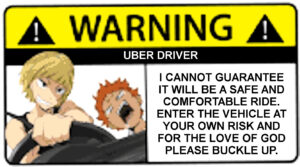
But many Australians like those just mentioned are living in a very different world. A world where the ordinary can become impossible. Lost in a world they find difficult to decode, one dominated by words, they lack the basic literacy skills to navigate normal life.
A low standard of education was not the only cause of poor adult literacy rates.
People might achieve reasonable literacy rates in school but they go into jobs in which there is really no requirement for ongoing literacy activity.
It’s not like once you have literacy, you’ve got a permanent inoculation against literacy problems in life.
If you never use the reading and writing skills gained in school, they actually fade away.
I helped people such as I’ve described open up this private side of their life often for the first time, understand their handicap, confront their fears and know how to become empowered. I encouraged them to overcome any barriers to their further education, including their shame and embarrassment at talking about it. Many had not put pen to paper for years. ‘This will take you in new directions,’ I told them. The first step they had to overcome was the stigma and the barrier of admitting that they had an issue. Counselling them and providing them with confidence to reframe how they see themselves gave me immense satisfaction. Their rephrasing of how they talk about themselves and see themselves, their washing away self doubt, made all my efforts worthwhile. That would have a flow on effect to their families, to those they interact with at work, to the community and the rest of society.
Another client Paul, a dyslexic, related his school experience: ‘‘It wasn’t picked up by anybody from my infants class. I was just instructed to sit down the back and not hold back the good pupils. They just kept putting me up. Third class, fourth class. I just sat in the back, covering it all up, sticking to myself. It was like no one noticed, and I went all the way through and left Primary School.’
‘Through no fault of your own you missed the early building blocks,’ I told him. ‘At school we have sequential learning so if you miss out those very early stages, then things get more and more difficult. Trying hard to keep up with the others is when students detach themselves from the scholastic learning process. That’s when labels like ‘Dyslexia’ have to be moved to the background so they don’t feel constrained. What happened after Primary?’
‘Then they sent me to high school. General Activities. They could have sent me to Taronga Zoo.’
‘Didn’t anyone ever help you?’
‘No one even though I was repeating class. I had others writing for me. My brother wrote my assignments. I dreaded reading out loud even to myself. If classwork required reading I’d find excuses to get out. No one ever said: “Paul, you can’t read. What will you do with yourself?”’
‘What did you do with yourself at school?’
‘I played the fool. I got into lots of trouble deflecting attention away from my weakness.’
‘How was it eventually picked up on?’
One of my remedial teachers noticed how I kept writing “semoithng, soemthnig, smoeithng’.
He realised you were trying to tell him something. Did you end up passing the School Certificate?’
‘Well, the ceremony came and my mother came. She took the day off work.
So, we’ re there. The Headmaster calls out the names on the certificates and what each kid had done. Like “Tony Harris, credits. ”Mary Kirby, pass. And then he came to my name. He said, ‘Paul Smith receives a certificate of attendance. You could hear people whispering. A couple of parents laughed.’
‘How insensitive!’
‘And I had to go up there and get it. I had to stand up there just so embarrassed, trying not to look at anyone, trying not to look too stupid. Mother was in front. She had her hat on and her purse in her lap, tears coming down from behind her glasses Iike someone, Iike someone died.’
‘I take it you never became a tattooist.’
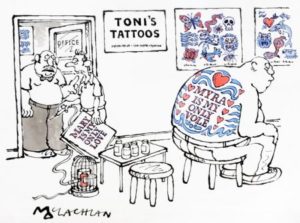
‘Get us some sandwiches from Thompson’s Deli,’ I asked one of my clients as lunchtime came.
‘Which shop is that ?
‘It’s in the middle of the next block. You’ll see the sign on the top of the awning.’,
‘Thompson’s.’ ‘Is there a problem?’ ‘Nothing wrong. Nothing the matter at all. Now, the shop says.. ’ ‘It says ‘Thompson’s Deli’ on the front.’ ‘What’s that look like?’ ‘What do you mean?’ ‘ I’m talking about I can’t read much at all, Allan. Seeing lots of jumbled words everywhere and not knowing what word is what is a frustrating handicap.’
‘But I’ve seen you working your way through the newspaper .’
Well, that’s just it. I just look! I try to figure out what’s going on from the pictures.’
‘Do you know the letters of the alphabet?’
‘Yes I do. I know my ABC. I just can’t read.’
The shopkeepers name is ‘Thompson.’ What does that “tuh” letter sound like? – T?
Now the tricky part is there’s two letters you don’t pronounce The ‘H’ and ‘P’ are silent. Got it? Of course! Now the last part is ‘nuh.’ What letter sounds like ‘nuh’? N! So the first letter is… ‘T’. And the last letter? ‘N’. ‘T-N’. T–n. It even sounds a bit like like Thompson, doesn’t it?
‘It sure does, Allan!’
‘Going to offices like Centrelink or the Post Office is a challenge,’ said another client. ’Filling out forms and applications likewise. I have to get someone else to help me do license forms and rego. I have difficulty reading bills, job descriptions and legal documents. Now don’t get me wrong but they provide interpreters for New Australians but nothing for those like me.’
What was your experience of school?’ I asked.
‘I hated school. My time there was brief and brutal. I was told I was dumb so many times I began to believe it. I got anxious and started stuttering. At school I was ignored or teased and pushed aside. I was told, ‘Why don’t you stop while you’re behind?’ I coped by copying everything from others. Can you believe I got enrolled in French classes after which my father visited the school. He pointed out to the Principal, ‘If my son can’t read and write properly in English how can he possibly do so in another language?!’
I was one of a number of outcasts. School wasn’t for us. No-one really cared about us. The word ‘stupid’ got thrown around a lot. We went outside to do gardening or clear rubbish. We hid in the playground or ended up in the sick bay.’
‘You were malingering?’
‘I actually felt nausea at the thought of having to being in the classroom. I never felt I wanted to put myself out there. I felt embarrassed and ashamed there, not being one to stand up in front. I got panic attacks. I felt better when we went on lots of excursions. Anything to keep us out of the teacher’s hair.’
‘How has this handicap affected you in life?’
‘I would have liked to have been eligible for better safer jobs. People have taken advantage of me like in getting credit cards, leases and loans. Someone I trusted is out there driving a brand new car which I paid for.’
‘You can’t let this define you and what you’re going to do. It’s never too late to learn to read and write,’ I told him. ‘There are remedial classes for those like yourself with individual learning tailored to each person..’
‘Do you really think I could pick it up at this stage of my life?’
‘There’s an old proverb which answers your question :“The best time to plant a tree was 20 years ago. The second best time is now”.’
Hunting and Gathering.
I had it made-or so I thought. While the prodigious materials, a time capsule of when the printed word ruled, were purchased to the tune of very little financially, this shoestring operation cost this culture mulcher innumerable hours combing through charity shops and home sales.
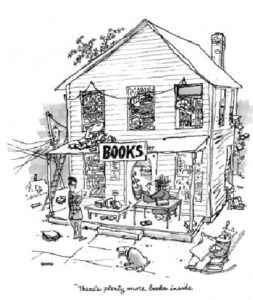
I built it to last, and people were able to see that in the work.
In the shops’ aisles of books, I stood before such marvels like a child let loose in a sweet shop, not knowing what to grab first. The things people throw away! Let loose on the stacks I was in a book constructor’s fairyland, scanning the titles on the spines, winkling out the best- many which had been thrown out of schools-like truffles, picking the eyes out of them fastidiously, scissoring and storing what I wanted for the future. Culling the inferior images, the repetitious, looking for the differences between the best, either stylistically or in substance, to set up questions as to the connections between them. In this venture, I had to build up a critical mass to enable me to get what is necessary for my purpose. This purpose deepened the further I strayed from shelves of Australiana. Gradually I cast my net more widely, going beyond the parameters I had set for myself –hunting and gathering material on this region of Australia. Tempted by the allure of visually exciting books going for a song- some sold simply by size – I couldn’t resist. Like Joost Swarte I was truly at home with books.
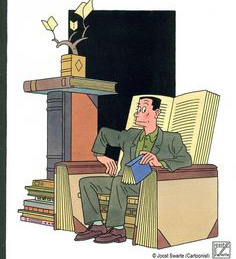
Books on everything when I was doing the spadework.
Everything except sport which I felt was less priority notwithstanding how the world revolves around it in the Australian psyche.

While its heroes have been traditionally revered as demi-gods, I haven’t been into it since my younger years. If someone told me I had athlete’s foot, I’d say that’s not my foot. Then when it was announced the Olympic Games were to be held in Sydney, I threw this in the mix, grasping the opportunity.

I added this sporting life to my perfectionist portfolio.
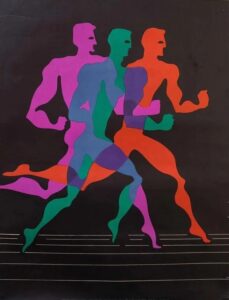
I thought it would attract a wider market. Determined to see my idea through, my task was now truly a marathon one.

Up and running, logging up the mileage on the odomoter, I had the laurels I wanted to be garlanded with – a government appeal for my services on the strength of my achievement – firmly in sight. What could possibly go wrong? I was taking a mighty tall chance, but couldn’t see myself ending up like the legendary greek runner, pushing himself to the point of expiry, his race run, falling at the final hurdle, his garland used as a wreath. Neither iron man nor nervous nelly, I had plenty of drive and staying power. In fair fettle, up to speed, I was functioning as well as could be expected, going the full distance through my middle age, no exceptional signs of crisis, albeit less sprightly, worse for wear, losing steam, running out of puff. Like a swan I appeared to be effortlessly gliding but I was paddling like mad under the water. All over the place.
I had the chemistry and only needed one other thing, timing, and timing is a bitch. With my wits about me, never a sigh, all I needed was time. Wrapped up in it to the last, I had gone in too deep- the whole nine yards- to change course.
I kept in mind the words of Horace, the Roman poet. Palma Non Sine Pulvere– no palms without dust- meaning ‘ ‘no reward without effort’.
I was constantly countering the inevitable ‘ What if …’ line of thought.
What if after all the dust I went through, I wouldn’t bear the palm
Did I have an Achilles heel? A weak spot that would leave me- with all my strengths- vulnerable? Becoming unhinged. My greatest concern was the theft or loss of my library – to share the anguish of Pramoedya.
My open-ended project shaped up well taking on a life of its own as a fascinating whiz-bang jigsaw puzzle, growing ever more complex and compelling the more pieces I found and put together, a gestalt greater than the sums of it’s parts. However creating something unique and one that most people find wanting in the desiccated system is one thing. Translating it into a hard-headed paying proposition is another. It was fine to be a genius of course, but imperative to keep the old horse before the cart to make up ground. My inordinate desires mismatched my finite resources.
A Bridge Too Far.
I fooled myself that I could make a decent living doing something both creative and socially beneficial, while tilting at such injustice. A knight errant on a fool’s errand? Chasing rainbows by day and a will o’ the wisp by night? Blowing bubbles, building castles in the air by day and pipe dreams at night. Granted it proved rather quixotic , cargo cultist, Sisyphean and delusional to an extent, me being too high headed, too clever by half .The problem working in such an idiotic governmental environment is you end up over-estimating your own intellectual capacity. I had hope of some governmental breakthrough when the Premier’s Department announced an award for innovative projects. Ministers like Christopher Pyne [In an opinion piece for Fairfax Media.] complain that ‘what happens in the classroom remains unchanged’. However, there was a catch, of course. It was restricted to those of teachers employed in officially approved schools.
I managed by chance to speak to the new Minister of Education in 1990. I encountered this ultimate stamp of approval one morning when she was crossing Macquarie Street from the State Parliament. She offered to speak to me in her office after I raised the matter of my case. She told me that she would be prepared to give me advice and assistance. Virginia Chadwick was a Greiner loyalist and a key architect of the disastrous education policies they made. She had a reputation for taking no prisoners when it came to matters she believed in. However she had come to the fore to take a less confrontational stance to teachers. A former teacher, happy to be known on a first name basis, she was said by her colleagues to be full of humour and fun. She played an April Fools’ Day joke on the Department directing that every member of the senior executive should spend two weeks of work experience in a school. You can imagine the consternation that ensued. I was curious to find out if being a woman of wit she might not just put me on but lend a sympathetic ear. I’d believe it when I saw it. Maybe there was the off-chance she would do something, and maybe Christmas would come in July.
‘Would you like a cup of coffee?’ She asked after I was shown into her office.
‘No, thank you. I’m here on a matter of justice.’
‘Oh, justice. I’m afraid that’s a trifle more complex to serve you up than a cup of coffee. But, in any event, please do go on.’
‘As I mentioned to you I want my unjust dismissal from the Department of Education to be overruled. I wish to controvert the grounds on which it was based.’
‘So Mr. Davis, you don’t think you have been treated respectfully during your tenure with the Department.’
‘That’s one way of putting it. So have I been treated with deference? Not for a minute. My complaint is the Department’s refusal to seriously consider my re-employment and the circumstances of my dismissal. I question the propriety of the Department’s proceedings and it’s relationship with the teaching staff. None of my warnings regarding the welfare of children in my charge were followed up.’
‘So you weren’t able to get what you consider a better response?’
‘No such luck.’
‘Do you still feel resentful about this?’
‘I’m past feeling resentful. I’m all the way to outraged. My anger is so solidly deepseated , it has congealed, hardened by the injustice and disappointment I’ve experienced. It’s simply not fair.’
‘Mr. Davis, if life were fair Elvis would be alive and all the impersonators would be dead. Now forgive me if I speak plainly. I’ll tell you straight up what’s wrong with your case. It’s a closed case. It’s out of time. A horse that won’t run. You realize that far too long has expired since you left the Department, don’t you? Your superiors told told you long ago your case was cleared and to drop it. The time for you has lapsed. From what the Director of Personnel informs me, they’ve refused your petition over and over again.’
‘For Pete’s sake they can’t just do that. Whether they’ve mislaid it, buried it, put in on the shelf or got it mixed up with someone else’s, they have to address the concerns I raised. Otherwise it could happen to other teachers and children.’
‘I hate to burst your bubble but if you’ll pardon an analogy it’s like the Monty Python sketch. The one with the parrot. Look, I know a dead petition when I see one, and I’m looking at one right now. Your petition is not just old and tired, it’s stone dead. Why dig it up? It is no more. It has ceased to be. It has expired and is definitely deceased. This is an ex-petition.’
‘You’re a real riot,’ I thought, but said instead, ‘How do you manage to keep a straight face while saying that?’ hoping this humour would be followed by some some intelligent proposition.
‘Accept this for what it is. I see where you’re going with this but it can’t be helped. Can’t you see you’re going nowhere in your argument but in circles?’
‘You’re telling me there’s no point.’
‘Yet here you are. Why is that?’
‘It’s one of life’s mysteries, Mrs .Chadwick.’
‘This isn’t a joke. I asked you a question. To make it easy I’ll answer it for you. Your chances of an appeal are vanishingly small. Do I make myself clear? It’s the law.’
‘And the pretence of abiding by it is very, very thin. As for the law any set of rules that allows you to diminish the humanity of a child is not a law-it’s a framework for crime. How about a bit of rectitude here. The law must set the precedent that progresses our morality, not retard it.’
’That’s as may be. However the state has it’s rules and procedures. To the best of my knowledge it’s education officials did what they considered to be right and appropriate at the time.’
‘Hindsight declares otherwise I must say. Or do you think I’m setting ethical standards artificially high’
‘I haven’t said anything to suggest that. Look, it’s all in the past. There’s no realistic prospect of the rules being overturned. In fact it’s out of the question. I assure you that I taken great pains to find any loopholes that would work in your favour .’
‘You can’t find what you’re not looking for.’
‘Rest assured, all due procedures have been followed. The Department has gone through your case with a fine tooth comb.’
‘No you can’t assure me because you’re telling me there’s nothing you can do. I don’t accept that.’
‘I recommend you put this behind you. You seem unable to let the past rest.’
‘It’s been my experience that you let the past rest by addressing it.’
‘My advice to you is to get on with your life and stop feeling sorry for yourself. Have you been doing any more school teaching or further studies?
‘I completed a certificate in teaching English as a second language . I’ve been selling ‘The Forward to the Basics’ Education policy in N.S.W.’ I explained my mission to her and showed her a range of client comments.
‘Mrs. Chadwick, in your first parliamentary speech, you referred to the importance of the field of education. You said and I quote: ‘I defy anyone to show me in this complex society a well-adjusted illiterate. An illiterate is the same as a blind person. Failure and misfortune await them everywhere.’
‘I find it shocking that such high levels of poor literacy are allowed to persist.’
‘Don’t we all?’
‘How can you justify expelling such large numbers of school children? How does this contribute to society? ’
‘Those disruptive kids are a worthless crock. They won’t even let you help them. No one cares about them. I’m sorry to say they have no redeeming qualities.’
‘I see you’re an understanding person.’
‘ Here’s my advice. Don’t lose any sleep over them.’
‘So what do we do? Look away when they go missing from a government institution whose first job is to keep the vulnerable and the public safe. Look away when that same institution does nothing to figure out why these kids are not learning basic skills.’
‘You mean every word of that, don’t you, Mr. Davis.’
‘They’re children, Mrs. Chadwick. I can’t just let this be.’
‘Look, they’re someone else’s worry now.’
‘You’re just shifting responsibility for them. Shame on you. Like it or not these kids are the ones who are coming up, and the world is in their hands.’
‘Heavens help us if that’s the case. Are you really looking out for them or looking out for yourself?’
‘I want to do something that helps us all. In relation to problems you perceive as afflicting the New South Wales education system, you said: ‘In education you have the capacity to truly make a difference in your community, to make a difference on the world. And nobody goes into politics, or nobody should go into politics, unless they wish to make a real contribution to the community. And in education what you do and how you do it has a critical importance for the next generation.’
‘I stand by that.’
‘You also said: ‘The answer lies further back along the school chain in an effective learning process tempered with human understanding.’
‘Yes, I did.’
‘So why don’t the Department and those on high allow teachers to contribute as people expect them to? To put all their energies into straight teaching work. We’d have these lamentable levels of low literacy cleaned up in no time.’
’You’re carrying the torch, I see. Three cheers for you.’
‘If teachers can’t protect the integrity of the system, then there is no system. This is not simply a fifty million or fifty billion dollar question. It’s a question of freedom of speech.
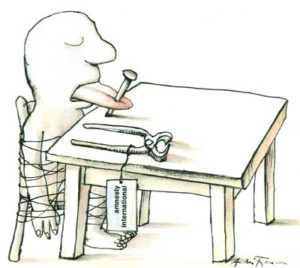
Teachers in Russia can now give their mind police a serve openly without fear of retribution. We should be allowed an amnesty too? Is that too much to ask or what?’
‘You don’t in all seriousness compare teachers’ rights in Russia to those here, do you? That’s an accusation most would find extravagant.’
‘Take it any way you like, Mrs. Chadwick, ‘that’s how many feel. We too need someone to tip the scales more in favour of a genuine democracy. This masquerade cannot be kept up.’ ’
Let me set you straight about one thing. Our party is elected to run the country and represent the people. Do you really think everyone should lead and know everything? Do you know what would happen if we allowed that?’
‘Surprise me.’
‘That would lead to pure chaos.’
‘I’m glad we understand each other.’
‘‘Who told you the Department is some kind of Girl Guides’ camp? What do you want out of this from the Department?’
‘I want an unreserved apology for their mistakes, a promise that this will never happen again and recognition of the value of my continued service. Don’t I deserve this much? The welfare of children should never be tied to whether or not their teacher is regarded as satisfactory or not. Non-disclosure of information relating to the welfare of children should never be standard procedure. Because if it is, if we pretend these outrages didn’t happen or worse, if we let them go unanswered, who’s to say it won’t happen again? I want an end to the vindictive conspiracy of silence surrounding this.’
‘Look here, I’m confident with the passage of time you’ll understand that the Department has done all it can to investigate your grievances.’
‘Well I’m glad you’re confident. Personally I don’t have much confidence in departmental officers investigating the blunders of other departmental officers.’
‘You know there’s a thing called confidentiality.’
‘That’s where you keep things to yourself. You don’t share information with others. That’s why the matter of my case has been effectively quarantined. I’m redoubling my efforts for all teachers and students to have the right of appeal. The State should sign off on this.’
‘‘Ah you’re a human rights warrior, on the side of good.’
Yes, I have to admit yet another misunderstood goody two shoes.’
‘A seeker of truth here to save the world. And for the community to save you. Drop it. You don’t have to put yourself through this. These kids are just clients who can’t help themselves. When their working day is over, teachers should go home and forget all about them. The worst day of their lives- losing their Walkman, failing to get in the athletics team, breaking out in acne- is just your Tuesday afternoon. Teaching, let’s call it what it is, it’s really just a job. Nothing else. You feed them the information, test it, forget it. And what would you expect to eventuate with such a right of appeal?’
‘I hope that teachers in the future will not experience the same frustration and anxiety that I was subjected to at the hands of my superiors because of my attempt to pursue higher standards. I was made to feel that I had burdened them with an unwanted task. The problem is that the atmosphere does not yet exist in which a committed teacher can act without fear of ridicule or reprisal. They should never be muzzled by those who should know better and who should be exemplary in their protection of human rights.’
‘Not just a chaser of lost causes but an avenging angel. You are entitled to your own opinion. How do you see these rights as not being respected?’
‘Governments can betray these principles by protecting the impunity of those officials responsible for corrupt behaviour. This is the scandalous aspect of all this. It must have a chilling effect on anyone who feels a moral need to expose activity within a government organization that can be deemed unethical, fraudulent, or an abuse of taxpayer funds. Such professional laxness cannot exist unless it is at least tolerated at higher levels in the Department.’
‘Mr. Davis, intemperate speech and wild accusations do not further your cause.’
‘Let me finish, please. The most important result that could come from the right of appeal is the conviction among teachers and parents that the department will change. In order to ensure this a permanent independent, impartial body of oversight accessible to all teachers is essential.’
’You’re not in a good position to set such a condition.’
In the brief time allocated to me, she said in conclusion. ‘Mr. Davis, You are a person of great determination, I’ll give you that. But we don’t have enough time to get into huge questions like this. My time is limited and I have many matters to attend to.’
’Mrs. Chadwick, I trust I earned the privilege of your time.’
‘I know this is not the outcome you wanted. I know it doesn’t sit well with you. I’m sorry I can’t be of more help to you’.
‘How convenient! So things resolve themselves.’
”You have to take these questions up through the normal channels.’
While the Pope’s choir sings’ ‘Ave Maria,’ is that it?’
‘What you want is a big order. I’m not a miracle worker. I can’t just make a captain’s call. With the best will in the world, there is a limit to what I can do. It’s too late in the piece. As I said because of the time lapse it’s outside my jurisdiction. I’m sorry you feel badly done by. However I don’t have any magic wand. You can’t expect me to point one at something a bit dusky and make it white. I have a strong management focus and am guided closely by the Department’s rules and regulations.’
‘What precisely does pedantic mean, Mrs. Chadwick?’
‘Enough said. Need I repeat myself? That is that. I won’t sugarcoat the decision. Just face up to it. As far as it concerns me the matter is settled. End of story.’
‘I know, instructions are instructions, it’s not up to you. The buck stops somewhere else.’
‘ You know, being Minister is like being handed a poisoned chalice.
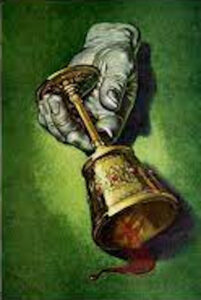
It seemed attractive at first until I was deluged with problems like yours. It’s like being the groundskeeper in a cemetery: Everyone is under you, but no one is listening to you. Now this is the part where you leave, Mr. Davis.’
‘It’s like that, eh.’
‘You really don’t get it, do you. It’s like that and that’s the way it is.’
‘Yes, Virginia, there is a ruling class. It does things like this just because it can. You might at least play the following April Fools’ Day joke on it. Send your Departmental executives a memo directing that every child be immediately taught to read and write properly straight out of the chute. That would scare the pants off them. Especially your predecessor’s, if he’s got any on. Perhaps I might visit you again to find if this has done the trick. Would that work for you? When might that be convenient?’
‘How about never? Is never good for you, Choirboy?
‘It would be too soon but it’s good enough,’ I said fed up with this charade. ‘I’ll meet you at no special place, and I’ll be there at no particular time. That’s it then. May the farce be with you!’
Biting off more than I could chew, my eyes bigger than my brain, Mr. Bigstuff did it my way-the hard way. A vast backlog of material banking up, packed to the rafters, as unwieldy for one person as the Pentagon Papers. The devil was in all the details. As the years wore on I kept plugging away, completely unknown, tucked away in my inner sanctum.
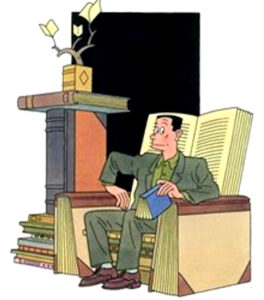
I was the wizard of Oz, burning the candle at both ends, the oil at midnight, wading around the cutting room floor, through piles of off cuts, consumed in reams of meticulous bibliophilia, winnowing useless chaff from vital knowledge, boiling the grains down into bitesize chunks, funnelling, filtering, filing, classifying, comparing like with like, like with unlike, whipping it into shape and storing it. Having laid out a simple basic structure, fleshing it out by putting in each new addition where it belongs-just as I do in writing this saga.
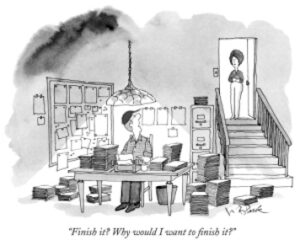
Revving around town double-time in my turbocharged vehicle for hope, keyed up, stepping on it, full blast, on my tour de force, my long hard race against time, knocking on doors, flogging my service, getting my point across, everything riding on it, getting way ahead of myself, giving it my all, considering all else a waste of time. So much to do, so little time in which to do it.
Hitting the switch, tromping on the accelerator, flat out, fast forwarding like fury just to stay in place, I couldn’t afford a backward glance. Once I had started there was no holding me back. Working against nature’s timetable, fighting to get off the ground, bleary eyed, there were just not enough hours in the day. I couldn’t have tried harder. That’s all I had in me. Phew! When would it break for me?
My wife advised me: ‘Just face it. Your youthful blush has drawn to a close. If you’re to last the pace, you have to get more solid shut eye. We are designed to sleep around eight hours per night. Otherwise, you’ll end up having an accident or a coronary.’
‘There’s no rest for the wicked. I’ll sleep when I’m dead and buried’ ‘That opportunity might come sooner than you think. Do you think you have the ‘Thatcher gene’?’
‘If you look at Margaret Thatcher, that grumpy old biddy, she had cat naps like me.”
‘The aussie lifestyle’s not geared to siestas. Nor beauty sleep. You need this to feel refreshed and healthy. Going without it won’t necessarily contribute to a successful career. And don’t forget. The Iron Lady’s now said to be suffering Alzheimer’s disease.’
‘Her joints are rusting up. Reagan has this disease too. He left orders to be awakened at any time in case of national emergency, even if he was in a cabinet meeting.’
I learned the only way for me to double my money was to fold it in half and put it back in my pocket.
I was caught between the longing for creativity and the struggle for the legal tender.
Financially beleaguered, hoping for something to turn up, I was overextended, riding out downturn after downturn, tightening my belt even more notches. More than for some.
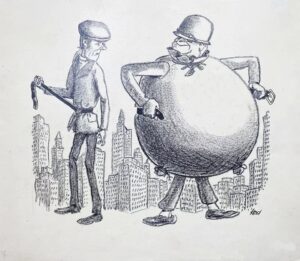
I got to realise it would never have been easy otherwise someone else would have already done it.
I spent so much time in my mind, puffing myself up, tearing myself down.
I was determined to crash through or crash. Less and less physically attuned, I was trying to outrun my life, careering towards the early death of this reluctant sanguine ‘salesman’-the Willie Lomax of self-marketing. My work would either be my salvation or the death of me. Forfeiting my health for the greater experience, there were hidden costs. Getting my money’s worth from the cars I hired for work meant too many hours spent in the killer sedentary seat, too few for a constitutional. This was a slow suicide. My Achilles arteries were as overstretched as the system whose needle I was trying to move, as inflated as my sense of my capacity.
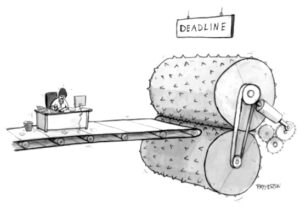
Holding out hope, my optimism, absorbing further unpleasant shock, served me as a kind of ship’s fender, protecting me on all sides. All except the inside. I convinced myself I was on the verge of my paragon coming together pat, of reaching the critical mass, blowing away the resistance, being sought out, having the last laugh while having the world beat a path to my door, ending on a high note. Alas it was not to be. My blood beat a path to the wrong part of my brain. It was not the market I was aiming to crack wide open that got cornered. It was me.
I had shot my wad. Running low, the tiger had left my tank.
If I could have had a bit more time or some start-up seed capital-the vital missing link-things should well have come to financial fruition. It takes money to make money. But that’s betwixt and between. What’s the use of wondering. I couldn’t and they didn’t. Fate had other plans. Within striking distance, on the home straight, the dead run, unable to slam on the brakes, just short of too late, I overshot my aim, my blood smashed through the arterial wall cracking it wide open. That was that then. The point of no return and for me no turning back. So close to home free and yet so far. Game, set, match. Taken by surprise, I was snookered in. And the trap was set, locked and ready to spring long before I realized it was one. Anti-climax. No skyrocket but a damp squib. No golden goose-just a goose. Unaware of my limits, out of sync with my circadian rhythms, I had beaten my brains out, only to get stuck in a cleft stick and driven into the ground.
Such is the final balance-sheet of my life, happening while I was making other plans, all part of its rich pageant. As the years went rushing by me I kept cutting it close, striving but never arriving, always in pursuit of a time that never came. Way out in my reckoning, in over my head, I had lost myself completely in my work and spread myself too thinly. Overtaken by events, I couldn’t find my way back. I had believed I was on track to move the needle forwards. Ruefully, I realized the deep frustration I had been feeling at my immense effort and agonized hours, incommensurate with a result that had not fully jelled. My mission was good while it lasted but but it seemed the window of opportunity could suddenly slam shut. Caught up in the process, it ended up getting away from me.
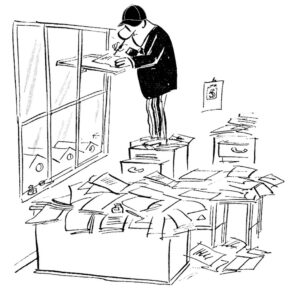
Things don’t always go to plan. You keep up your hopes, you take your shot and miss. I shot my bolt.
My bookshelves sagged and groaned under the sheer pressure of my lode, threatening to give way.

As they did so too unbeknownst to me were the walls of my arteries. In this Battle of The Bulge, it was their seams that would first reach breaking point. My body couldn’t take it any more. Part of me snapped. My bubble was burst. My purpose defeated. The end of the road for the busted flush.
It’s almost as if considering each charted course, each careful step along the byway, I had had no necessary arrangements at all.
You’ve heard of Who’s Who? I’m in Who’s He?
By the standards I had set myself, I fell depressingly short of my just reward. At the end of the day we’re remembered not by what we didn’t do but by what we did. Whoever said, ‘It’s not whether you win or lose that counts,’ probably lost.
In any case fame is so fleeting. Today’s winner is next years question in Trivial Pursuit.
You’ve heard of Who’s Who? I’m in Who’s He?
I had gone from nowhere to total obscurity.
Truth be told, unpurged, self-respecting, my identity submerged, I would have remained a couldabeen, a never-wozzer, deadened sooner or later by the stultifying effects of an unrepentant system which sedates consciences and encourages teachers to spend so much jaded time whinging plaintively about children, so much tedious time crying out for resources. The way I see it it’s not so much the cupboard is bare– most of the material is we need is at hand – but a stifling lack of freedom for teachers to act resourcefully and make any input creatively.
My response to this political control was shaped by it. I aimed to break out by outjockeying the right on their own turf, aware how they serenely consistently play on image of socialist teachers as rootless cosmopolitans. ‘Anywheres’ with portable achieved identities based on educational success which makes them comfortable and confident with new places. Professionals. who care strongly about other countries but don’t give a tinker’s cuss about their own, and keep the populace ignorant about it. There is an element of truth about the first part but nothing more. Personally, I can’t but feel like a citizen of the world too never having considered myself particularly Australian. Home is where you find it but I understand for most people their national identity is what counts most. Celebrating the soil rather than being exclusivist. I focused on developing this sense as the gateway to that of reaching an international identity. You have to go where people are, emotionally and politically. It’s a gradual and slow process. You give them what they want and only then explain where it’s from.
This was uppermost in my mind when I set out relentlessly on my own literacy crusade, filling the gaps in the system convinced that my will, underlying consuming passion and discipline would win through and carry the day. I adhered strictly to covering the syllabus as outlined by the Department. I submitted my lesson plans for approval by the Heads of Department when required. Having studiously kept to the unwritten protocol not to speak out against the Department’s dismal practices when employed by them. I didn’t get into any talk of politics:no nuclear disarmament, no sermons, no sandinistas nor gay rights. I had suspended disbelief in its role of co-opting conformity and reproduction of the class system.
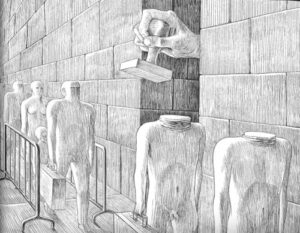
I had temporarily allowed myself to deny the system was one where where children learn their place in society and respect their social betters. Where some can’t learn to read and write, but can be taught to kill efficiently.
‘Be the best!’ the recruiters entice. While Telstra says some don’t have enough qualifications to sell phones and Microsoft says they don’t have enough experience to answer phones, the Army is prepared to hand them a machine gun.
I set about advertising my wares with some hesitation. I feel it’s unbecoming and crass for a professional public worker to have to do this. Moreover after what had been pulled on me I would have to maintain a circumspect approach in my advertising. Some stories are too true to tell. While aiming to tweak the lion’s tail without having to watch my back, I couldn’t put it past the edcons to try on something nasty in retaliation. Letting themselves draw attention to their inane shortcomings, I kept the door open to my future re-employment. I had no choice but to wait out the political climate. The policy I have been selling is set out in my flyers which acted as talismans, affording me protection. A ‘Get Out of Jail Free card’. It says simply that all children should be brought up, that they should be valued as a resource and that all should reach their full potential intellectually. You would think that in a parliamentary democracy like that of Australia this would be for the asking, a given. My experience and the pronouncements and decisions made by bovine bloviating bosses and judgemental junketeers indicate why it’s otherwise. Why these make our only experiment with higher intelligence more likely to prove quite brief.
One of my goals was to create a salutary learning environment very different to that of the eugenists, to slay their misconceptions and put them to shame. The German eugenists had shown that an elite of young people from different backgrounds could excel physically together. In my model I wanted to demonstrate that all children can excel intellectually through competition and cooperation. My approach was to create a nucleus of families whose “unteachable children” would make clear and rapid progress, where class achievements were seen as equally important as one’s own individual attainments. To create a hive of activity with students grouped not by age or ability but by being able to get on with others. Where the better students helped those less able, passing on their skills and verve in a ripple effect to persuade the authorities to create a more level playing field of learning in which all forms of intelligence are recognized, all children seen as gifted in one way or the other.
I wanted to stamp my authority on popular education and therefore help eclipse the culture that the eugenists maintain in NSW – one in which they promote neither intellectual excellence nor physical excellence for all children. Because as long as they maintain this culture, there will always be the desire by nascent fascists to rehash their more virulent version of the ‘born to rule’ ideology.
Ignorance is no Excuse.
I wanted to help put an end the departmental response of ignoring concerns regarding the welfare of students and teachers .
This ignorance had come to the fore Yasmar, the last school I worked at.
It would again come to the fore in the tragedy at Arthur Phillip High.
It would come to the fore yet again in the tragedy involving the latest Primary Principal of Walgett Community College.
As we have seen the school is difficult to staff due to violence at the high school and the bitter politics of the town.
One Walgett mayor put it this way, “It’s very difficult to have a functioning community when your school system, which is at the very heart of it, doesn’t appear to be functioning.”
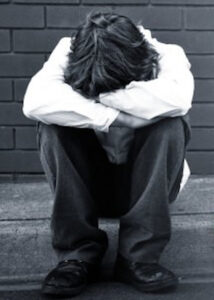
Kylie McKenzie, the mother of a severely disabled 12-year-old, told the ABC she formally asked for him to stay at the local primary school for another year but the NSW Department of Education denied her application.
Mark Banasiak, an upper house MP and also a former teacher has taken a particular interest in Walgett, and worries about the students. “People need to be held accountable for these failures to deliver,” he says.
“I’m turning my attention to people higher up, past the executive principal, who are supposed to be supporting the school. Until you address that core issue about why some elements of the community are not coming along with the school’s plan, you are never going to achieve the change you need. The tragedy is it’s the kids that suffer the most. Education should be a circuit breaker in this community, and a way for the community to grow and prosper, and at the moment that’s not happening.”
Parents say an independent investigation must be undertaken to stop the cycle of disadvantage, and say they do not understand why the college’s issues have gone unaddressed for so long.
Parent Rebecca Trindall said a lack of funding was not to blame and said she wanted the efficacy of the programs at the school to be investigated.
“The money’s there, the programs are there,” she said.
“Where are the outcomes? Where’s the change?
Is racism a factor in this dysfunction?
Ms. Trindall dismisses this notion :”I think it might turn into a race issue, but let’s be clear — it’s not about being black or white.
“It’s a community issue, it’s an education issue.’
State MP Roy Butler is backing the calls for an independent review.
Mr Butler said an investigation would be best led by ‘someone who understood the system, had lived experience and would be at arms length from the Department’ .
That brings to mind Richard Rule who as we have seen fulfilled the first two requirements but whom the Department in it’s infinite wisdom had let go.
Mr. Butler says his correspondence with NSW Education Minister Sarah Mitchell had been “fluffy”.
“She says, ‘Yes, we’re working on fixing it, we’re addressing the problems’,” Mr Butler said.
“But on the ground, for those teachers, students and parents — they’re not seeing those changes.”
“We’ve heard stories of kids who’ve graduated high school and can’t read and write. This is in 2022 – it’s not acceptable.”
In response to the calls, Minister Mitchell and the Department of Education declined the ABC interview requests.
In a stock, ‘Let’s leave it at that’ statement, an education department spokesperson said the department was committed to providing staff and students with a high-quality local school.
“In partnership with the local community, we are committed to resolving some unique challenges the school is facing,” the spokesperson said.
Unfortunately this did not extend to resolving the unique challenges being faced by the Principal of Walgett Community Primary School, Nathaniel Train.
The NSW Department of Education said in December 2022 that Mr. Train had raised concerns about education policy there.
It should be noted NSW Police described him as a tall, bearded man of Aboriginal or Torres Strait Islander appearance.
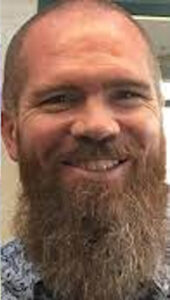
His son describes himself as a proud Wailwan man from the central west of NSW.
Nathaniel Train used the same teaching methods in Walgett that underpinned his success in Queensland; setting rules and enforcing them, cracking down on staff he felt were failing to pull their weight, and telling meddlesome parents to stay outside the gate. He also favoured rote learning and direct instruction; one of his strategies in Queensland had been to get students to memorise through chants at the beginning of the day.
This approach can be divisive wherever it’s used, and Walgett was no different. Some parents, elders and teachers were fans of his drive to lift learning outcomes for students. “He was wonderful. He was making some really important changes,” said one, who, like other residents of Walgett, did not want to be quoted due to town politics. The school had struggled with truancy and staff retention for years and Train was considered by some parents to have made progress in addressing some of these issues.
Others were furious. “He wasn’t a very nice person,” someone who worked at the school told the media, adding he refused to be vaccinated for COVID-19. “His way of trying to improve results was being very strict, lots of suspension.”
Most principals are forced out of Walgett due to similar conflict . Over a 23-year period, the high school next door had 29 leaders – but that’s not what ended Nathaniel’s eighteen months tenure.
He had a massive heart attack in the front office in August 2021, and took a long time to be revived by a school counsellor, an assistant principal and doctors . He was near death.
He then left the school.
He had found himself embroiled in a row over an alleged cheating incident during a NAPLAN exam at the school.
One student, who shared a surname with a teaching assistant, was said to have been unable to answer the first two questions – but then got the next 34 all correct.
Nathaniel nursed growing resentment towards the NSW Department of Education for, in his view, failing to support him when he came under fire from a powerful faction in the town. In March 2022, he fired off a barrage of emails to the department’s secretary, Georgina Harrisson begging her to tackle the problem.
He made formal complaints to the NSW Ombudsman and the department.
He also raised his concerns with a member of NSW Parliament’s Upper House.
The MP said, “He knew what he was talking about and it was supported by documentation. He wasn’t ranty with me, but he was certainly bitterly disappointed with the education department.”
“He had a feeling of disappointment and frustration with the education department that had left him feeling bruised and drained, I would say.”
Nathaniel’s daughter says her uncle Gareth told her that her father was planning on “blowing the whistle” on matters within the NSW education department that involved the NSW police.
The MP told NSW parliament early in 2022 that Train sent 16 emails over the course of two weeks to the NSW Department of Education, outlining problems and challenges at his school and requesting assistance. He made a raft of allegations about teaching and discipline issues there.
Train told the ABC this triggered a breakdown in his relationship with the education department and alleged he was subsequently targeted by executives for raising those concerns.
The MP raised an email sent by Train to the education department “outlining problems and challenges at the school”.
The email, dated March 7, 2022, included hypothetical scenarios which Train apparently believed needed to be addressed by the department.
The Minister of Education responded to the MP’s question that department representatives “engaged in an online site visit planning session” with Train and a number of other local education officials.
She also noted the department “confirmed that no direct claims, allegations or material evidence in relation to these hypothetical scenarios were provided by Mr Train”.
. “We had department witnesses provide evidence, that’s all publicly available, and none of those claims were able to be substantiated.”
‘At the same time the Minister acknowledged the school has ongoing challenges’.
“Every parent that I met was very committed to getting good outcomes for their kids, everyone loves their town and they want to make sure that they’ve got a good high school,” Minister Mitchell told the Parliament.
So why couldn’t she convince the local protesters of this?
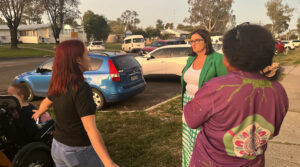
The MP, Mr Latham, called the Minister out for using ‘spin’ to to glaze over a hotbed issue and lighten concerns over Walgett Community College.
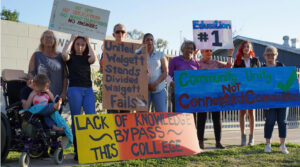
Minister Mitchell told the NSW Parliament: “We know that some entrenched issues in the Walgett community have existed for years. These are things that multiple government agencies are working on together, and they will continue to do so.”
Richard Rule is sceptical about the whole-of-government approach. “I went to some of those meetings and there was a lot of rhetoric,” he says. “I don’t think I saw in the school one positive outcome from any of the state and federal agencies.”
The NSW Department of Education had refused the Sydney Morning Herald’s request to. interview the former Principal.
There’s no easy solution for Walgett, says former Minister Piccoli. “There are deep social and historical issues there, that are difficult to change,” he says. Inter-agency collaboration was important, but often did not involve people senior enough to cut through the bureaucracy.
“If I had five minutes to talk to the Secretary of the NSW Department of Premier and Cabinet, I would say, ‘we need a minister for Walgett, or a deputy secretary’. It’s very hard to change human behaviour, but we can certainly provide the fundamentals and basics that most people take for granted … that we haven’t got right there.
“The bottom line is you can never give up. You have to keep getting the best support you can there.”
In 2021, six years after the dire situation I outlined earlier in this portal, nothing much had changed. The New South Wales Teachers Federation said on some days classes at Walgett are being cancelled.
The union said Walgett Community College, in north-western NSW, had only 10 of the 21 teachers it was entitled to. It’s representative said, “If this was happening in the city, I don’t believe it would continue to be happening,” he said.
“These kids in Walgett and other areas out there are some of our most diverse and complex students in the state. For this situation to continue and they don’t have the staff, well that’s shameful, that’s absolutely disgraceful and shameful.”
“At Walgett, they’re not even running classes some days, because they do not have the staff to run half the timetabled classes. When a school gets to a critical mass where they don’t have enough staff, or there’s some kind of emergency, they will go into a variation of routine. “It occurs quite regularly at Walgett.
“The effects that it will have on these students moving into the future, and also the damage it does to the community as well — it’s just unacceptable.”

He also said teachers were not being given enough time to plan lessons and that the best way to get a teacher to stay in a regional town was to give them an ongoing job. “You can’t get teachers out west unless they’re going to have permanency.”
The Teachers Federation’s deputy president, Gary Zadkovich, said, “There is no quick cure, but unless somebody grabs it by the horns and starts making decisions, without worrying about getting scared or moved on, it will never be solved. You can’t just have a revolving door of principals.’
He said it was “unfair and unreasonable to expect teachers to shoulder the responsibility for rectifying and resolving conflict, tensions, complexities, problems and divisions in a local community like Walgett that go back decades”.
The Walgett Shire Council voted in 2019 to approach the Department of Education regarding funding options for a ‘last resort’ bus service to take children from the school to study at Lightning Ridge High School.
Mayor Woodcock said the council’s previous attempts to work with the NSW Department of Education to resolve issues hadn’t been successful.
In a statement, the Department of Education said it was unable to respond to the council decision until it received a proposal from the Council.
A former school captain has made a heartfelt plea for the school, saying the bussing strategy was”not going to fix anything”.
Of course she’s right. It would only leave the situation unresolved and make those remaining more disheartened.
Amelia Haley who is studying at university and working in Darwin, said she is living-proof that the school can nurture successful graduates. “It doesn’t matter what school you go to, it’s what you have around you, the support you need to invest into the community, invest in that school, with the students help them out,” she said on a visit to Walgett to be with her grandmother.

Such was the situation Nathaniel Train had to deal with when appointed as head of Walgett College primary school.
For most of his teaching career, Nathaniel Train was feted as a success. The 46-year-old primary school principal who identified as Aboriginal, had been lauded for lifting results at disadvantaged schools; teachers admired him, parents sought him out and students liked him.
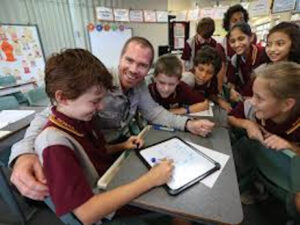
Nathaniel Train and his first wife had worked in a string of regional state schools in Queensland. At one he was described in a local media story as a “mild-mannered school leader”. He was also described as ‘good natured’.
At one state school he was praised for improving the school’s results to the point where it was among a handful of disadvantaged schools across the country to score above average in basic skills tests. At his next position, some parents chose to enrol their children based on his reputation.
‘He was just a very happy man that loved kids and they loved him,’ one told ‘A Current Affair’.
‘He was quiet and seemed stern but caring with the kids,’ recalled another.
A former colleague says: ‘He made Yorkeys the highest performing NAPLAN school in far north Queensland.’
At the time, Train told the Cairns Post that “supportive parents, dedicated teachers and support staff” were key to the school’s success.
“We have a consistent delivery of teaching programs, a quality learning environment that focuses on every student being given the opportunity to be a successful learner and students that commit themselves wholeheartedly to their learning opportunities,” he told the publication.
“Our strategy continues to be for each student to strive to be the best they can be. Naplan is an opportunity to learn, and provides all schools in Australia with point-in-time assessment. It is useful to everyone in education that is looking for continual improvement.
“The students, parents and teachers should be proud of their ongoing success. Naplan is reflective of what happens every day at Yorkeys Knob State School.”
The parent of one student added: ‘I don’t get it. Mr Train was such a great person around the students.
‘He helped my daughter transition into the school mid year and without him playing tag with her every break she wouldn’t have done as well.
‘When he was leaving we went up to him and thanked him and his eyes welled up. What ever has happened we will always remember his good side.’
Like so many principals before him he would depart the school, only in his case for the Other Side.
At Walgett Train had the support of the elders. “He was wonderful. He was making some really important changes. We were supportive of him and trusted his intelligence. We hoped he would come back,” said one, who, like other residents of Walgett, did not want to be quoted due to town politics.
Many of the teachers liked him, too. “He was for the kids,” said one, who worked with him. “He was about education and for the kids. I’m blown away that he’s done what he’s done. I found him quite personable. He knew what he wanted to achieve. Tidy things up, get it functioning properly.”
Some community members were also supportive. “I thought he was very passionate about education, wanting to create real change,” said one resident who had several conversations with Train about schooling. “He was obviously frustrated because he found the system wasn’t doing anything for the kids here.”
He would have felt beginning there he had the whole world in his hands-the ability to shape and mould young minds to make the most of their schooling, to advance themselves and to bring their people forward.
But other people in the town did not like him and felt he was too strict. “He went in hard, setting rules and telling [the children that] hot chips and pies are not school food,” said one teacher.
Well, they’re not school food, are they. It wasn’t as if food technology classes at the College didn’t show the value of vegetables in our diet.
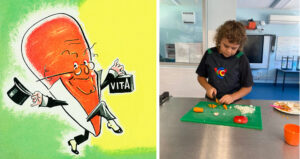
It wasn’t as if they didn’t show that munching on a crunchy, raw carrot rather than a sweet acts to fight tooth cavities, attacks plaque and massages the gums.

However at the Walgett school Nathaniel Train was unvaccinated — a decision that put an end to his career.
Everything in his world was going horribly wrong.

It’s vital to understand what led Nathaniel Train to carry out the actions that he was now now heading towards. This is in no way to excuse them but to help prevent anything like them being repeated.
The turning point came in 2021. He suffered a heart attack It took staff and doctors a long time to revive him; he was near death.
This put on ice construction of the ‘forever home’ he and his partner had dreamed of on the South Coast.
Like lambs to the slaughter.
Isaiah 53
Then followed an apparent mental breakdown at Walgett before he headed north to the Queensland property where his brother and former wife lived.
Nathaniel told his daughter he had decided to simplify his life and live in the bush to become closer to God.
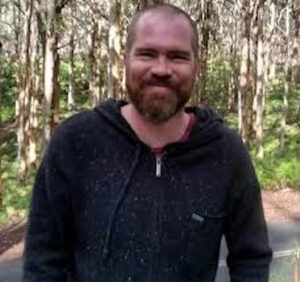
Like the rest of the world that part of the bush had become divided over enforcement of pandemic procedures. Hand painted messages in the main street of the nearby town read “How did democracy turn into dictatorship?” Another reads. “Say NO or it never ends.”
Flags flutter above it reading: “the People’s Revolution” and “Mandate Freedom”.
Stacey Train had walked away from her teaching job and given up her registration after refusing a Covid vaccination.
One teaching colleague of Stacey Train who had found her ‘kind and supportive’ said: “She didn’t go around spruiking her thoughts or anything like that, but we knew she had alternative views and was anti-vax, and there was the sense there was ‘big government interference’ and things like that.”
“I was trying to convince her to stay, and I said ‘I should hold you down and force it into you’, and her face just dropped … and her eyes got wide with horror.”
No provision for those holding such reservations was considered by the education authorities in Queensland or NSW.
Teaching is one of those areas where online work was appropriate during the pandemic.
In an email sent in February 2022, Nathaniel Train told a staff member at the NSW Department of Education he had recently spent time out in the bush and earlier that year had come off prescribed medications.
Rather than reassign teachers with anti-vax views to working with anti-vax families or working online, both Departments terminated the services of the Trains.
Considering the past difficulties in installing a suitable school principal one would have expected the Department to actively encourage Nathaniel to remain.
His termination may well have been the last straw for Nathaniel Train adding to his sense of despair, helplessness and bitterness.
He was broken hearted both literally and spiritually.
What becomes of such people?
It may well have helped push him over the edge.
In December 2021, months after his resignation from Walgett Community School , he headed to Queensland. As if he didn’t have enough troubles as it was he had to break through the border gate to enter. He was carrying firearms which he abandoned after driving into floodwaters.
The state’s land border had opened just days earlier but only to people who were fully vaccinated.
A farm worker asked Train what he was doing after spotting him on the road as he drove out the gate.
“He [Train] said he was an ‘anti-vaxxer’ and had lost his job because he wouldn’t get vaccinated and couldn’t see his family in Queensland,” the worker’s employer, a farmer, said.
In the nearby town of Talwood, which has a population of about 170 people, some locals confirmed they had heard of the incident.
Shop owner John Miorandi said, “We heard, there was Fijian farm workers out there and when the flood went down … they said, ‘Hey look at all this stuff next to the fence.’
“There was a heap of stuff there, like a lot of stuff and when the water was going lower and lower they started finding guns”.
Among the paperwork from his time at Walgett Community College were medical records relating to a heart attack he suffered shortly before resigning.
The farmer said police had told him to do what he liked with the rest of the stuff found with the vehicle.
“We had it on a pallet in the shed for a while and then we disposed of it,” he said.
The farmer said he reported the border breach and damage to the border gates to authorities, including the police and local Council but did not hear of anything happening as a result.
He said that was the last he heard of the incident until police showed up at his property after the shooting.
“They were looking to see if there was any paperwork left. But we chucked it all out,” he said.
Sources close to the family say the COVID mandates and restrictions made the unemployed 45-year-old mother of two more vulnerable to the theories held by her second husband, Nathaniel Train’s domineering brother Gareth.
His posts indicate a belief Covid vaccinations were “not good”.
Gareth Train had become enveloped by conspiracy, mistrusted authorities and was prepping the property “to survive tomorrow”.
One Huge Unholy Train Wreck.
For I bear them witness that they have a zeal for God, but not according to knowledge. For they being ignorant of God’s righteousness, and seeking to establish their own righteousness, have not submitted to the righteousness of God.
Romans 10:2-3
Without work, all three were battened down together at the property, caught up in an all-encompassing, spiralling “perfect storm” of events that exposed them to extremist, doomsday thinking.
Their religious beliefs meant they already believed in the apocalypse and the end of the world, and the pandemic brought these fears into sharper focus.
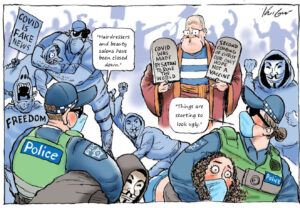
Isolated, resentful and paranoid, their contact with the outside world dwindled.
One contact they did have, however,was with the Queensland police. Officers visited the property in August,2022 and left messages on Nathaniel’s phone about the border breach.
They got no response, according to the Deputy Commissioner.
Could that visit have credibly intensified their suspicion and mistrust of the police? That the police , knowing they probably had guns, were coming to get them ?
How true were reports they got high on ‘ice’ at their heavily fortified house?
Nathaniel Train’s disappearance from New South Wales brought four police constables to the property gate in December. Two officers were shockingly shot dead.

As was a neighbour who came to investigate.
Gareth, Stacey and Nathaniel Train died hours later in a shootout with specialist police.
They went out not in a blaze of glory but in an in your face, suicidal blaze of gory.
Nathaniel Train had gone from being top gun at Walgett Primary to staring down the barrels of the big, big guns.
Yes, after being ignored and marginalized by the state, he was now at last able to convey to it most forcefully the words of his chant, ‘Do I have your attention now?’
But at what horrendous cost.
That is why this tragedy sits particularly close to my own feelings and thoughts.
No one should ever feel impelled to resort to such desperate, drastic measures.
For the people of Walgett through his actions he left this life lesson, ‘Tell your children not to do what I have done. Violence is not the solution to problems. Learn to solve them together. Take care of each other and live long.’
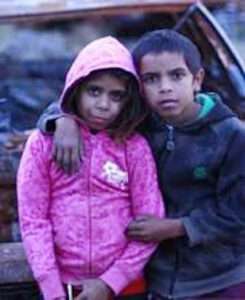
The brothers’ actions bring to mind those carried out a century ago in north west NSW. by Jimmy Governor .
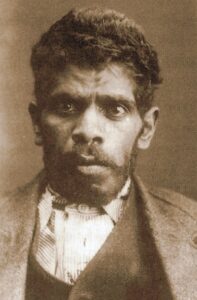
He was partnered by his brother Joe. Like Gareth Train’s war cry, Joe’s was, “We are going to kill the lot of you”. Their victims included a school teacher.
Schooling for the Governor children had been irregular and although they could read and write tolerably well they could only attend school at the discretion of the Minister of Public Instruction. Local objections were sufficient to preclude Aboriginal children attending a specific school.
Putting aside their apparent differences, the experiences of both sets of brothers share elements of grievances, disappointments, derision of the police and vengeance.
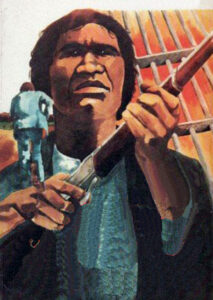
Jimmy Governor’s life and violent killings formed the basis for the novel and film The Chant of Jimmie Blacksmith.
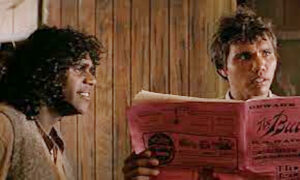
They explore themes of Aboriginal dispossession and poverty.
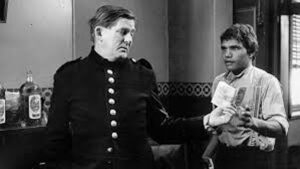
Roy Butler, the NSW MP for Barwon, had exchanged a few emails with Nathaniel Train about the Walgett school. Their only contact was written because “he was in an area where he couldn’t get good reception,” said Butler, who did not know whether Train was writing from his brother’s Queensland farm.
“Something has gone horribly awry for him to be involved with what he was involved in. They were logical emails. I really don’t know what could have happened.”
None of those who worked with Train at Walgett Community College Primary School could explain how the mind of a man known for helping kids deteriorated to the point where he could be involved in what his daughter called an ‘evil crime’.
Asked whether the family was known to police prior to the shooting, Queensland’s police commissioner said the answer was “complex”.
The COVID-19 border breach — along with other evidence that the former school principal potentially broke laws relating to the possession and disposal of weapons during the same incident — was reported to Queensland police less than a year before Nathaniel Train was involved in the deadly shooting.
The police had suspended his gun licence and insist there were no “flags” to indicate officers visiting the property were in danger.
The revelations raise questions about how much Queensland police knew before they sent the four officers to the property.
The Deputy Police Commissioner said Queensland police had “very little history” about the Train family members when officers were ambushed.
She said the officers’ assignment was a’ run of the mill’ job, although so many officers were required, there was a outstanding warrant for Nathaniel’s arrest and he was known to have had a number of guns in his possession .
These are what the police should have been regulating rather than their bodies.
The Police Commissioner said that police would “interrogate every part of those people’s lives”.
“Not just in recent weeks but over the last 12 months, years if need be. Speak to family. Speak to friends. Look at every part of their lives to find out why this happened.”
To explain this is not to justify. We have to look underneath their fanaticism for something which may have a core of truth to it.
If we don’t want to explain anything, we will never learn anything.Looking at the paperwork trail left by Nathaniel Train back at Talwood would have helped understand more but this opportunity was passed over.
The Commissioner said the Trains’ involvement and history in the school system would also be investigated and it could take months “to get to a point where we know exactly what occurred and why”.
The Deputy Commissioner said a multidisciplinary investigation is being led by the ethical standards command, with assistance from homicide and security and counter-terrorism teams.
“The reason they’re involved is they’re skilled at looking at the motivation of why people do things like we saw,” she said.
“They’re skilled at looking at things like religiously motivated extremism, ideological motivated extremism, issue motivated extremism, grievance-fuelled violence, and even pathological fuelled violence.”
The Queensland police assessment, backed by ASIO, would be that the shootings were ‘an act of politically motivated violence, primarily motivated by a Christian violent extremist ideology,’
Religiously motivated extremism being about imposing one’s ideas on others can be subsumed under ideological motivated extremism.
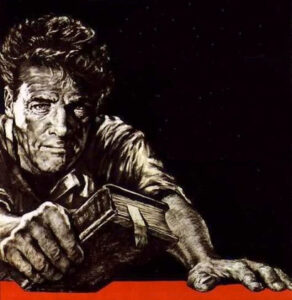
That would seem the main driver behind the Train’s actions.
Fundamentalist thinking of all kinds gives the bearer a self righteous certainty, especially an unfounded one, that they are totally correct or morally superior.
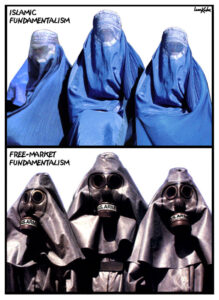
It’s bearers emphasise some concept of “purity”.
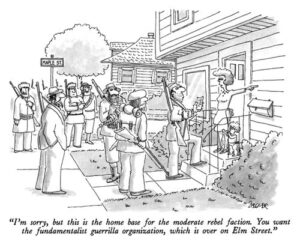
They exhibit a desire to return to a previous ideal from which advocates believe members have strayed.
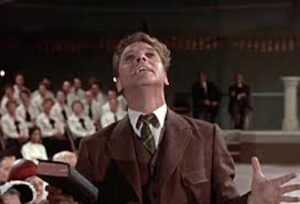
The Trains’ thinking was not unlike that of fundamentalist Sunnis.
The issue of vaccination mandates would have been high on their list.
Nathaniel clearly had a series of grievances with the education authorities.
Spending time with his conspiracy theorist brother and sister-in-law on their remote Queensland property, the trauma from his heart attack and his anger at NSW education authorities might have made him more open to sharing their views.
Research suggests that people who have a distrust of institutions and are looking for an explanation and someone to blame, are more vulnerable to conspiracy theories.
As for pathological fuelled violence, although he had had mental issues, this wouldn’t have been a factor. He wasn’t a natural born killer.
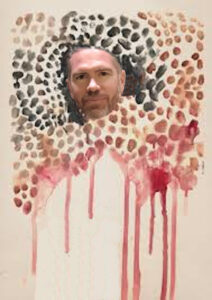
As for Gareth, it’s harder to discount that as a factor.
This religious rambo was part of a reservoir of marginalized possible violent extremists who rightly or wrongly believe they have suffered as a result of misguided government policies.
This was a tragedy waiting to happen. Making sense of it has involved more than a simple accounting for the movements and mindset of Gareth, Nathaniel and Stacey in the past few years. It also involves reckoning with their past.
Family members recall Gareth being a highly controlling “gun nut” and trying to force others to play with rifles as a late teenager.
“He used to keep ammunition on his floor,” one said. “This was about one or two years before the Port Arthur massacre and gun control. He has a long history with that world.”
Gareth Train became a prolific online poster in recent years, drawn to sovereign citizen and conspiracy websites; he believed Port Arthur was a “false-flag operation”.
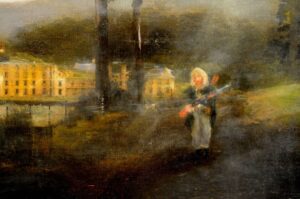
He believed that governments were running re-education camps.
His belief in guns was matched by his belief in God.
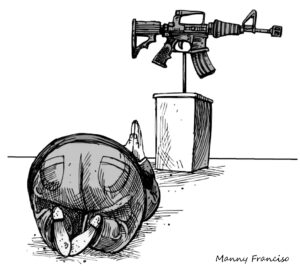
There are signs in some of his posts that he held to some of his fundamentalist Christian upbringing.
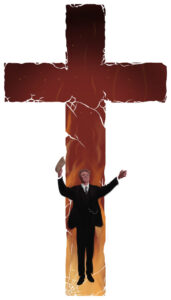
“I am a son of Yahweh the creator God,” Gareth Train posted on a private forum.
“Yeshua [Jesus] is my King and brother. I live in this world but I am not of this world. I am not perfect and have made many mistakes in my life. I am a sinner but have been forgiven.’
As with the fictional, philandering, fundamentalist Elmer Gantry , the way to sin is from behind a mask of self righteousness.

It’s easy for a fundamentalist to sin as they can always forgive themself.
‘I missed out on my formal education, ‘continued Gareth, ‘due to my critical evaluations of teaching practices and resulting conflicts. I returned to university as a mature age student and studied social welfare. In doing so I discovered the religions of education and psychology.
I soon learned that their high priests were the same indoctrinating snakes as the church high priests.”
In carrying out the killings Gareth Train made the biggest mistake of his life. He dragged his poor brother and wife down with him and no one will ever forgive him.
In an earlier comment Stacey Train remarked: “Our Heavenly Father chose us for this time – what a privilege.’’
After carrying out the slaying, Gareth Train declared online, “They came to kill us, and we killed them.”
“If you don’t defend yourself against these devils and demons, you’re a coward.”
“My brother and I have been out-numbered by the wicked and ask our Father to set fire to the cities and towns and call out to our Brother Yeshua to return,” Gareth Train had written in one earlier post, reflecting the paranoia he appears to have been gripped by in the lead-up to the shooting.
“They have to kill us. They have to kill us because they can’t break our spirit,” Gareth says, in one video posted about a month before the shooting.
Writing “Our Father is giving up a clear sign”, he said ominously, “monsters and their heads are soon parted.”
On another video he says: “We teach those f—ers how we are to be treated … They are just too blood damn retarded to know whom they should leave be … Ah, the grand adventure builds steam.”
He said in one recent post he had been “ark homesteading for the past five years preparing to survive tomorrow”.
“When it becomes clear that we are in a time like no other and you head out into the wilderness to escape persecution, know that my wife and I will offer refuge to all brothers and sisters.’
“If you are a conservative, anti-vaxx , freedom lover, protester, common law, conspiracy talker, alternative news, independent critical thinker, truther, Christian, patriot etc etc expect a visit from these hammers,” he said, referring to the Special Emergency Response Team understood to have killed him.
Gareth Train was one mixed up, confused guy.
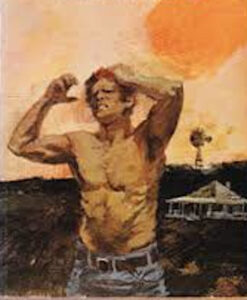
His left hand held a Bible and his right hand held a gun.
He was someone who needed re-education regarding Exodus 20:13.
Of course few or none of the above groupings can expect such a visit. Australia’s establishment remains thoroughly conservative and Christian. It’s representatives don’t need to conspire to promulgate their ideas and to act. It comes naturally to them and they speak openly about it.
Like former Prime Minister, Tony Abbott, sounding evermore like a conspiracy theorist, that staunchest of Christians has made it clear that Christianity is under threat from Islam, proclaiming ‘the clear superiority of our culture to one that justified killing people in the name of God.”
Are his online pronouncements to be removed?
Abbott railed against COVID-19 restrictions and ‘virus hysteria’ in the media.
Turning the health crisis into a law and order issue was a panicky response based on governmental inexperience rather than part of a plot to control the population. The establishment does this normally well enough.
This response acted to undermine trust between the police and the communities that the police serve. In order to do this effectively, the police need to have cooperation from the communities they’re serving,
Although many may scorn the ideas of anti-vaccination and anti-lockdown protesters, we ignore the unequal reality of the pandemic at our peril. Many of the world’s tech companies and CEOs have done well from this crisis. Indeed, in the same week that many Americans lost their jobs, Jeff Bezos, the founder of Amazon, added $13bn to his fortune in just a day.
With surreal realities like these, where prominent members of the 1% really do appear to have gained from the pandemic, how much of a leap is it to persuade someone that the crisis has been orchestrated deliberately so that elites can amass power?
Nathaniel’s daughter believes her parents and uncle should have received mental health treatment. After the shooting, she has since suffered with her own mental health, and is advocating for an increased understanding of how trauma can impact people’s lives.
The federal Minister for Home Affairs says, ‘There will be important questions we will need to consider on how our country deals with acts of violent extremism.
One is whether to involve the community democratically in this exercise or continue to leave it to the ‘experts’.
Democracy means that the government is an instrument of the people, not the other way round.
Is the renewed talk of censoring the internet to vet so-called conspiracy theories the result of a conspiracy itself?
Of course not. It’s just the latest knee jerk response of narrow, censorial minds to whom such actions come naturally.
Do we really need to ban posters expressing the gullible belief the Port Arthur Massacre was made up?
One deep and important question that must be confronted is how to abandon the tight restrictions on literacy in the state of New South Wales. A rejection that is so doable but one that incurs such entrenched opposition.
Is this opposition the result of a conspiracy?
Or rather the product of an unresponsive education system run by unimaginative, indifferent, negligent officials with Neolithic incompetence, ignorant of the consequences of their lack of consideration for others. If you have served the Blind Giant as a teacher, how it gets away with making such mistakes wouldn’t come as a surprise. It adds weight to and vindicates what I have been arguing for decades.
Something good must come out of these unsalutary lessons. The people of Walgett deserve better . More than equality, they require equity.
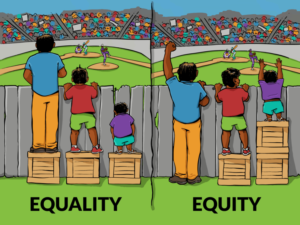
[1][SMH obituary to Rex Jackson 5/1/2012] Unless stated otherwise, all footnotes refer to the Sydney Morning Herald. [2]To be determined. [3] 29/01/1985, 30/01/1985.,02/12/1987,17/04/1991. [4]Daily Telegraph. 16/02/1997. [5]To be determined. [6]01/07/1987., Sunday Telegraph 29/12/1996 p.7.,22/07/1987., Daily Telegraph 23/04/1994.,17/03/1997. [7]Daily Telegraph 05/10/1989 p.1 [8]Check.23/10/ ,11/06/1996,06/06/1998.Check.17/07/2000,20/06/2004.19/07/2003. [9]16/11/1987.(Ross Coulthart) [10]24/05/1989 p.9 [11](Luis M.Garcia ) [12]28/07/1990 (Paola Totaro ) [13]26/06/2004 (Linda Doherty) [14]13/05/2002 (Linda Doherty ) [15]17/08/1988 p.17 [16]26/03/2003 (Linda Doherty ) [17]Daily Telegraph ? 05/08/1988 (Jacqui Hocking ) [18]Daily Telegraph 01/07/1988 p.1 [19]Daily Telegraph 17/07/1988 (Sarah Harris & Nick Yardley) [20]D/M 26/08/1987 [21]Daily Telegraph 29/08/1988 (Peter Grimshaw ) [22](Robert Wainwright ) [23]04/08/1988 (Richard Macey ) [24]31/05/1990 (Matthew Moore & Julie Lewis ) [25] (Richard Macey )p.2 [26]02/09/2002 p.4 [27]05/01/2004 ( Linda Doherty ) [28]Sunday Telegraph 15/10/2000 (Simon Kearney) p.22 [29]18/12/1991 (Kathleen Hickie ) [30]25/10/1999 [31]D/T 10/03/1997 p.1 [32]15/09/Year to be determined (Stephanie Raethel ) [33]Editorial.date to be determined.
[34]From the Address given to the Architecture, engineering and Science Graduation by the Hon. Rod Cavalier, Minister for Education, on May 3rd1986
[35]27/10/2001 (Robert Wainwright ) [36]The Minister for Education Mr Cavalier, speaking at a graduation ceremony at the NSW Institute of Technology. (Anne Susskind ) [37]09/04/1990 (Paola Totaro ) [38]17/07/1991 [39]15/08/1991 Spoken by Minister Mrs Chadwick. [40](Paola Totaro ) Spoken by Minister Mrs Chadwick. [41]15/12/1989 (Richard Macey ) [42]18/10/2004 (Kelly Bourke ) [43]07/02/2004 (Kelly Bourke ) [44]08/04/2000 (Gerard Noonan ) [45]17/08/1988 p.17 [46]Queensland Media Club, August 1,2013] [47]04/01/1992 Minister Metherell interviewed by John Doyle. [48]22/06/ ?? Date to be determined. ( Anne Susskind and Luis M .Garcia ) [49]11/12/1991 ( Mike Stekatee ) [50]Punch Magazine 12/01/1990 p.21 [51]13/05/1992 (Mark Coulthan) [52] Minister Rod Cavalier.Source to be determined. [53](Judith Whelan ) Date to be determined. [54]Sun Herald 16/12/2001(Miranda Wood)
[55]A statement made on ABC’s “ Focal Point “ by the Department’s PR Officer, Frank Meaney.
[56]See entry Eugenics in Encyclopaedia Brittanica [57]Robert Manne. [58]Statement by Mr Frank Meaney (Margaret Harris, Medical Reporter ) [59]Ditto [60]17/06/1988 ( Bernard Lagan ) [61]Daily Telegraph ( Jim Pollard ) [62]23/11/1989 ( Anne Susskind ) [63]11/02/1989 ( Anne Susskind ) [64] Source to be determined. Comment by Minister Cavalier about his policy statements, copies of which were distributed to all schools. [65]Source to be determined. Minister Metherell in statement to the Herald. [66]17/08/1988 p.9 [67]01/07/1988 (Anne Susskind ) [68]Ditto [69]29/05/2004 ( Linda Doherty ) [70](Luis M. Garcia & Philip Clark ) [71]19/06/1989 p.4 [72]18/06/1989 p.37 [73]Daily Telegraph ? (Darren Goodsir ) [74]02/02/2004 (Cosima Marriner Mark Metherill ) [75]Ditto [76]Source to be determined. [77]Source to be determined. [78]22/01/2004 (Mark Metherill, Cosima Merriner, Aban Contractor ) [79]Ditto [80]22/03/2005 (Damien Murphy ) [81]03/05/2004 (Linda Doherty ) [82]13/05/1992 (Tony Stephens ) [83]07/12/1996 (David Luff)
[84]15/08/1989 (Philip Clark ) Deputy Premier Murray addressing a banker’s lunch.
[85]Source to be determined.
[86]22/06/1988 (Anne Susskind ) 17/02/1990 Spokesman for Premier Greiner commenting on the Premier being pelted by food and empty drink cans at Lithgow High School.
[87]02/11/1989 (Mathew Moore ) p.2 [88]18/08/1988 p.1
[89]04/11/2002 (Gerard Noonan ), (Anita Catellano ) According to Federal Education Minister John Dawkins illiteracy is costing Australia more than 3.2 billion dollars a year in lost productivity and is promoting social and economic inequity. 15/03/1991 (Paul Chamberlin) & 21/06/1996 (Stephanie Raethel) According to Federal Minister Dr. Kemp, up to 20 per cent of children fail to master literacy and numeracy skills by the time they leave primary school (Tina Diaz ) According to a Federal Parliamentary Committee up to 25 percent of primary school children go on to high school without being able to read and write adequately.
[90]This is according to a statement by Coalition Science spokesman Peter McGauran. [91]19/04/1990 (Peter Hughes ) [92]Sun Herald 16/12/2001 (Alex Mitchell )
[93](Robyn Willis ) After the release of this study State Employment Minister Fahey said 8% of NSW workers believed their inability to read and write stopped them from achieving their full potential at work.
[94]James Robertson, page 13, SMH April 23, 2012. [95]Source to be determined. [96]9/11/2004 (Kelly Bourke ) [97]13/11/2004 (Kelly Bourke ) [98]29/01/1987 p.10 (Armstrong ) on politics
[99]Statement by the Dept of School Education’s assistant director-general for Ms Jan McClelland
[100](Luis M. Garcia ) Comments made in an interview with the Melbourne Sun News Pictorial. [101]Ditto
[102](Anne Susskind ) Minister Cavalier announcing a dramatic rise in the number of expulsions and suspensions.
[103]Spokesman for Justice Minister Terry Griffith. [104]Minister for Corrective Services Michael Yabsley. [105]Report by the chief executve of the PMS , Dr Frank McLeod in response to Minister Chadwick’s policies.
[106]Statement by Minister Chadwick following chronic staff shortages at Minda , the states highest security institution for juveniles and the closing of Endeavour House at Tamworth.
[107]31/10/1987 (Graham Williams ) [108]Statement by spokesman for Corrective Services Minister Yabsley.
[109]15/12/1991 Letter to the Editor by Tony Vincent , Dean, Faculty of Professional Studies, Uni of NSW. Referring to statement by the present Minister of Corrective Services.
[110]Statement by Minister of Police Pickering . [111]Ditto. [112]04/10/2004 (Michael Pelly ) [113]( Paola Tortaro ) article “ Free schooling gets to be costly “ (Stephen Long ) [114]12/04/1989 ( Luis M. Garcia ) [115]20/05/1989 ( Philip Clark, Mathew Moore )
[116]( Lynnette Cassells & Alex Mitchell) Announcement by Minister for Family and Community Services Chadwick in a joint initiative with Minister Yabsley.
[117]Statement by Minister Pickering.
[118]07/03/1991 p.2 (Karin Bishop ) This is the offensive language provisions of the Summary Offences Act.”. A sixteen year old high school student from south west Sydney was charged with this crime and appeared in Minda children’s court.
[119]The comment about being thrown in jail was made by Queensland Coalition “ Minister for Everything “Russell Hinze when he told a lawyer Mr Waterhouse to “f— off
[120]NSW National Party Leader, not happy about the prospect of three-cornered election contests in the bush.
[121]Mr Murray called out “Jeez I’ll have another sausage on the strength of that “ on election night as another Labor minister fell.
[122][ SMH,29/2/2012, Phillip Coorey] [123]Queensland Deputy Premier and National Party Leader Mr Gunn. [124]Premier Greiner referring to Education Minister Metherell.
[125]Minister Metherell described as bull… claims reported by by teachers and principals in a Herald survey.The survey found an increase in unsupervised classes in senior high school, but the minister denied this whole admitting the Dept. had no hard data.
[126]7/11/1990 and 25/06/1988 Premier Greiner according to a ministerial adviser is prone to pour out a stream of conscious invective where he repeats this vulgarity.08/07/91 Premier Greiner’s self styled “ordinary man”, the member Bob Graham , who revealed that there were sweeping powers against teachers talks about “the wind’ that comes out with the sh… released by his opponents.5/10/1991 A spokesman for Minister Tim Moore described Minister Metherill’s description of the decision making process as horse….
[126a]Tony Abbott, Oct 31,2007] [127]01/03/1990 Deputy Speaker of the NSW Parliament, Ms Wendy Machin. [128]17/11/1990 Referring to the Labor party strategy towards him. [129]Daily Telegraph 09/06/2000 p.12 (David Penberthy).
[130]17/05/1991 ( Mike Seccombe ) Mr Wilson Tuckey told the Parliament “You can all piss off”
[131]Premier Greiner referring to his Minister for Transport, Mr Baird. [132]11/03/1989 Premier Greiner talking about his ambitions. [133]Premier Greiner referring to the Newcastle earthquake.14/12/1991 (Mike Coulton ) [134]Referring to his inability to understand his Minister for Education. [135]T/A p.5 20/10/1999 [136]Sun Herald 04/09/1988 p1
[137]Victorian Liberal Party Leader Kennett on his car phone to Andrew Peacock
[138]Mr Peacock warning the T/A journalist Paul Kelly.
[139]19/01/1992 Tasmanian Coalition Premier Gray referring to female Parliamentarians.
[140]07/03/1991 Secretary of the Police Association, Mr Lloyd Taylor. [141]04/06/1981 (Anne Suskind) [142]D/T 22/06/ ? (Nick Yardley ) [143]Ditto [144]Statement by Minister Metherill (Luis M. Garcia ) [145]D/T 16/06/ ? [146]9/10/1989 (Adam Connolly )
[147]NSW Police Minister , Mr Pickering addressing the Australian Police Ministers Council in Canberra, according to the “Australian Senior Citizen” column 8 26/03/1992
[148]These powers are in the Public Disorder section of the Summary Offences Act.
[149]06/01/1989 Acting Premier Wal Murray talking about the manning of some NSW police stations
[150]Police Minister Pickering speaking to the “Liverpool Champion “ in answer to a question about the drug problem. (Bernard Lagan )
[151]Premier Greiner’s suggestion for solving problems in Redfern.
[152]The Deputy Premier Mr Murray was referring to a curfew self imposed by aboriginals in Moree and conducted by the Moree Lands Council.
[153]D/T ( David Armstrong ) Warning by Minister Cavalier. [154]Ditto [155]08/02/1990 P3 (Luis M. Garcia ) [156]14/04/1990 (Alicia Larriera )
[157]18/12/1990 (Alicia Larriera ) The NSW Dept of Family and Community Services admitted that it had lost 17 of its state wards .
[158]16/03/1997 (Alex Mitchell ) [159]Sun Herald 01/12/2002 (Mathew Bens) According to former NSW Director General of Education Dr Ken Boston [160]Sun Herald 23/02/1997 Editorial [161]28/02/1997 (Morgan Ogg) [162] Sun Herald19/04/209
[163]Headline “Greiner :we have failed on welfare “ Family and Community Services Minister Virginia Chadwick refused to discuss the Premier’s assessment.
[164]National Party shadow minister John Sharp.(Tom Burton & Pilita Clark) [165]03/01/1991 p3 (Paola Totaro ) [166](Brad Norington) [167]The Age, April 4, 2011. [168]S.M.H.Quick learner aims high May9, 2011 [169]17/07/2010 p5 ( Heath Gilmore) [170]Sydney Morning Herald 24/1/2004. Report: “Class Divide”. [171]The Henry Parkes Foundation. Cremorne. SMH 20/1/04.
